

Travel Guide
- Things to Do
- Entry Requirements & Customs
- Getting Around
- Visitor Information
- Regions in Brief
- Tips on Accommodations
- Tips on Dining
- Getting There
- Sustainable Travel & Ecotourism
- Escorted & Package Tours
- Health & Safety
- Internet Access
- Tips for Families
- Tips for Gay and Lesbian Travelers
- Tips for Senior Travelers
- Tips for Single Travelers
- Tips for Student Travelers
- Tips for Travelers with Disabilities
- Tips for Women Travelers
- Tips for Black Travelers
- Tips for Vegetarian Travelers
- Active Pursuits
- Suggested Itineraries
Tips for Gay and Lesbian Travelers in Egypt
Egyptians have a somewhat schizophrenic attitude toward homosexuality. On the one hand, homosexuality is considered deviant and gay men are discriminated against; on the other hand, sexual relations between men are often ignored as harmless.
The upside of the situation is that gay men can enjoy a variety of casual sexual encounters with relative ease. The downside is that, once identified as a homosexual, a visitor may experience discrimination and face problems with the police.
Lesbians, meanwhile, have no public profile as a group, and there is no "scene" as such. Because of this, couples can hold hands in public -- this is what friends do in Egypt -- but any further display of affection is not recommended.
You should also be aware that the security services actively work against the gay community. Cases of entrapment followed by detention and torture are regularly documented by human rights groups such as Human Rights Watch. Websites such as www.gayegypt.com are routinely monitored by the security services, and chat groups are used to set up fake meetings.
Gay Egypt (www.gayegypt.com) details cruising locations in many of Egypt's main cities. Much of the information appears to be dated, but it should still provide some useful leads as well as still-relevant warnings of the dangers. The site www.arab-gay.com has an active travel section, and the more journalistically inclined Gay Middle East has an interesting Egypt section (www.gaymiddleeast.com/country/Egypt).
The International Gay and Lesbian Travel Association (IGLTA) (tel. 800/448-8550 or 954/776-2626; www.iglta.org) is the trade association for the gay and lesbian travel industry, and offers an online directory of gay- and lesbian-friendly travel businesses and tour operators.
Many agencies offer tours and travel itineraries specifically for gay and lesbian travelers. Above and Beyond Tours (tel. 800/397-2681; www.abovebeyondtours.com) are gay Australia tour specialists. San Francisco-based Now, Voyager (tel. 800/255-6951; www.nowvoyager.com) offers worldwide trips and cruises, and Olivia (tel. 800/631-6277; www.olivia.com) offers lesbian cruises and resort vacations.
Gay.com Travel (tel. 800/929-2268 or 415/644-8044; www.gay.com/travel or www.outandabout.com), is an excellent online successor to the popular Out & About print magazine. It provides regularly updated information about gay-owned, gay-oriented, and gay-friendly lodging, dining, sightseeing, nightlife, and shopping establishments in every important destination worldwide. British travelers should click on the "Travel" link at www.uk.gay.com for advice and gay-friendly trip ideas.
The Canadian website GayTraveler ( www.gaytraveler.ca ) offers ideas and advice for gay travel all over the world.
The following travel guides are available at many bookstores, or you can order them from any online bookseller: Spartacus International Gay Guide, 35th Edition (Bruno Gmünder Verlag; www.spartacusworld.com/gayguide); Odysseus: The International Gay Travel Planner, 17th Edition (www.odyusa.com); and the Damron guides (www.damron.com), with separate, annual books for gay men and lesbians.
Note : This information was accurate when it was published, but can change without notice. Please be sure to confirm all rates and details directly with the companies in question before planning your trip.

- All Regions
- Australia & South Pacific
- Caribbean & Atlantic
- Central & South America
- Middle East & Africa
- North America
- Washington, D.C.
- San Francisco
- New York City
- Los Angeles
- Arts & Culture
- Beach & Water Sports
- Local Experiences
- Food & Drink
- Outdoor & Adventure
- National Parks
- Winter Sports
- Travelers with Disabilities
- Family & Kids
- All Slideshows
- Hotel Deals
- Car Rentals
- Flight Alerts
- Credit Cards & Loyalty Points
- Cruise News
- Entry Requirements & Customs
- Car, Bus, Rail News
- Money & Fees
- Health, Insurance, Security
- Packing & Luggage
- -Arthur Frommer Online
- -Passportable
- Road Trip Guides
- Alaska Made Easy
- Great Vacation Ideas in the U.S.A.
- Best of the Caribbean
- Best of Mexico
- Cruise Inspiration
- Best Places to Go 2024

- Book with Confidence
- Pay Over Time
- Traveler Reviews
- Traveler Insurance
- Travel Visa
- Traveler FAQ
- Ethical Tourism
- Booking Terms
- Community Guidelines
- Host a Trip
- Hosting Benefits
- Host Testimonials
- Trip Itineraries
- Host Resources
- Host Referral Program
- Hosting Contact
LGBTQ+ Egypt Travel Guide: Everything You Need to Know
Get ready to explore one of the world’s most legendary destinations with safety and confidence, blog written by meg ten eyck (she/her), ceo and founder of everyqueer.
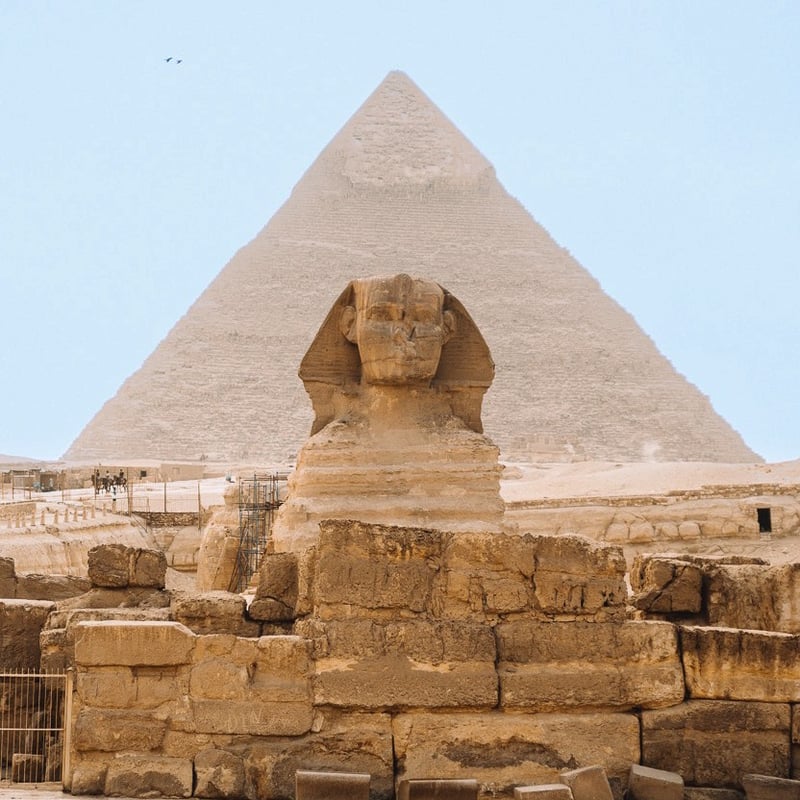
I took my first trip to Egypt in 2017. Egypt's Arab Spring allegedly ended a few summers before. However, tensions were still high, and Tahrir Square was still erupting in short-lived protests.
Seeing the pyramids wasn't just a bucket-list item for me. I wanted to touch the stones, breathe the dust, and let my brain absorb the sheer antiquity of it all.
But I was also concerned about safety.
Exploring LGBTQ+ Egypt is different than in other Middle Eastern countries like Jordan. Caution is vital. In this Egypt travel guide, we'll give you all the information you need about Egypt gay travel so you can have the Egyptian vacation of your dreams and be safe while you're there.
Key takeaways:
- Egypt is a fascinating destination to visit; however, LGBTQ+ folks visiting Egypt should exercise caution and discretion to travel safely.
- Getting familiar with Egyptian culture and customs will help ensure you have a safe trip. Often, local customs can seem gendered which may be difficult for a nonbinary person. While not ideal, it’s the reality in Egypt. What one “passes” as is important for these local customs.
- Dating apps for queer folks are not recommended in Egypt due to safety concerns.
- Egypt is packed full of historical sites to enjoy—from the Sphinx, to the Valley of the Kings, to the Pyramids of Giza.
LGBTQ+ rights and safety in Egypt
According to Equaldex, Egypt scores 11 out of 100 on the equality index. While Egypt is far from LGBTQ+ friendly, it is also far from the worst country for LGBTQ+ human rights. Queer people in Egypt have no legal protections from discrimination and many facets of LGBTQ+ culture are illegal. Same-sex couples cannot adopt in Egypt, nor are their marriages recognized.
We’d recommend that LGBTQ+ people visiting Egypt should refrain from any public displays of affection, use an affirming tour guide, and always dress modestly. Two of our gender-nonconforming staff members at EveryQueer recommend that FTM trans people who haven't yet had top surgery should consider binding. While an unbound chest probably won't land you in jail, it may provoke unwanted questions. Take LGBTQ+ safety seriously while you're in Egypt.
Egypt: A quick overview
Politics aside, Egypt is one of the most incredible countries I've ever visited. The shifting sands give way to the dusty metropolis of Cairo. The Nile River winds its way north to the coast.
And, of course, you have Luxor, the Pyramids at Giza, and the Sphinx. But facts about Egypt are always good to know, so let's dive in.
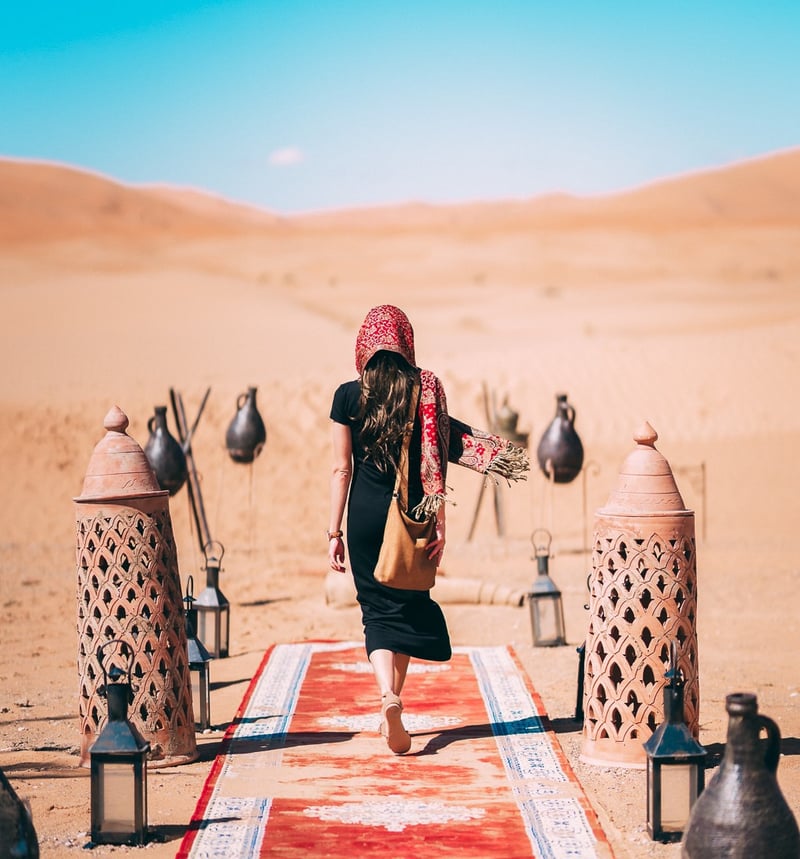
Where is Egypt?
Egypt lies on the northeast tip of Africa. It's separated from Saudi Arabia on the east by the Red Sea and also shares an eastern land border with Israel. Egypt shares its western border with Libya and its southern border with Sudan.
The northern edge of Egypt fronts the stunning Mediterranean Sea. Egypt's main international airport is in Cairo and receives flights from all over the world.
Customs and culture in Egypt
Arab hospitality overflows in Egypt. Egyptian people are proud, generous, and enthusiastic about visitors. In my experience, the Egyptians that I met didn't care about my sexuality, they were just glad I was visiting their country.
How to greet people in Egypt
One of the most important things to remember in Egypt is your smile. Along with the typical "Salam Alaikum," a smile and direct eye contact are appropriate when greeting someone in Egypt. Also, expect questions about your health, your family, and your job.
Egyptians are curious and caring people and are interested in you and your life.
For men, it's polite to stay an arm's length away when you're talking to someone. Women may stand a bit closer when talking with another woman.
Handshakes between men are appropriate greetings. Women may kiss cheeks when greeting each other. Unless they're familiar with each other, women and men do not touch during greetings.
While these customs can seem very gendered and might make it difficult for a nonbinary person, it’s the reality in Egypt and what you should expect when you’re there. Unfortunately, what you “pass” as is important for these local customs, as well as how you dress, which is discussed later in this guide.
Lastly, under no circumstances should you ever walk in front of someone who is praying.
Visiting someone's home in Egypt
Receiving an invitation to someone's home in Egypt is an honor. Egyptians enjoy hosting and may spend all day cooking and preparing for your visit. Treat it like the gift it is.
Always remove your shoes before entering the home. Allow your host to show you to your seat. Visitors are often given seats at the head of the table.
Wait for your host to take the first serving of food. In some cases, your host may serve you themselves. Regardless, be polite and take your clues from your hosts.
Asking for a second helping of food is a sign of utmost respect.
Always bring a gift when you visit. Sweets or fruit are well received. However, pack some postcards from your hometown. Egyptians will be thrilled that you're sharing the gift of your culture.
How to dress in Egypt
Egypt is one of the most conservative countries in the Middle East so dress appropriately. Men should wear long pants like jeans or khakis. Shorts may be appropriate during the summer months but be sure they cover your knees.
Visible tattoos should be covered whenever possible.
Women should dress conservatively at all times. Ankle-length skirts or dresses and shirts that reach your wrists are appropriate. While it's not required for non-Muslim women to cover their hair, doing so will help you blend in.
If you're staying at a resort, the dress code may be more relaxed. A sign in the lobby will often dictate how you should dress.
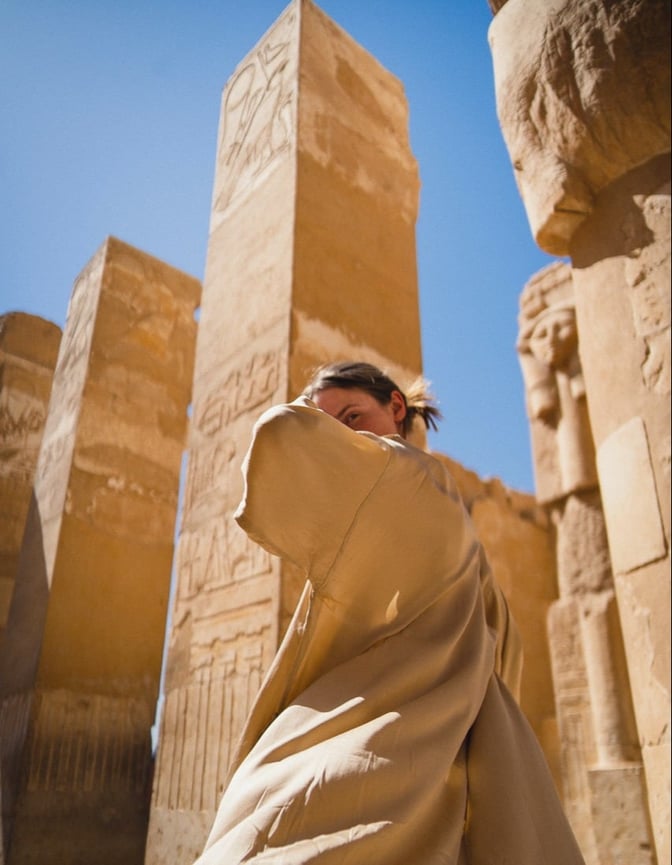
Dealing with sexual harassment in Egypt
Sadly, catcalling and sexual harassment are the norm in Egypt. Women bear the brunt of this harassment, and it's uncomfortable at best and scary at worst. Ignore the offenders as best you can, don't make eye contact, and be prepared to duck into a shop or restaurant if necessary.
Traveling with a tour company is one of the best ways to shield yourself from harassment. Since the guides for tour companies speak Arabic, they can use some choice words and remove you from the situation.
The risks of using LGBT dating apps in Egypt
Most dating apps aren't blocked in Egypt but think twice before you browse Grindr while visiting. Several reports indicate that Egyptian police use dating apps to entrap LGBTQ+ people into accepting a date or hookup. Then they're arrested and jailed. Stay safe and use dating apps with caution while you're in Egypt.
Egypt's must-see destinations
Egypt's discriminatory attitude aside, the country is a wonderland of sights and sounds. While most taking on Egypt gay travel stick to the areas around Cairo, other parts of the country are equally as enticing.
The Pyramids of Giza
One of the things that LGBTQ+ travelers to Egypt might find shocking is that the pyramids are right on the outskirts of Cairo. While this does detract from the idea of the pyramids being remote, it also makes them easy to visit from the city.
Hiring a guide or joining a tour for your trip to Egypt makes visiting the pyramids easier and safer. Egyptian tour guides are often archeologists as well, so their knowledge is impeccable.
Beware of touts in the Giza area. There's a saying that goes, "You don't pay to ride the camel. You pay to get off the camel."
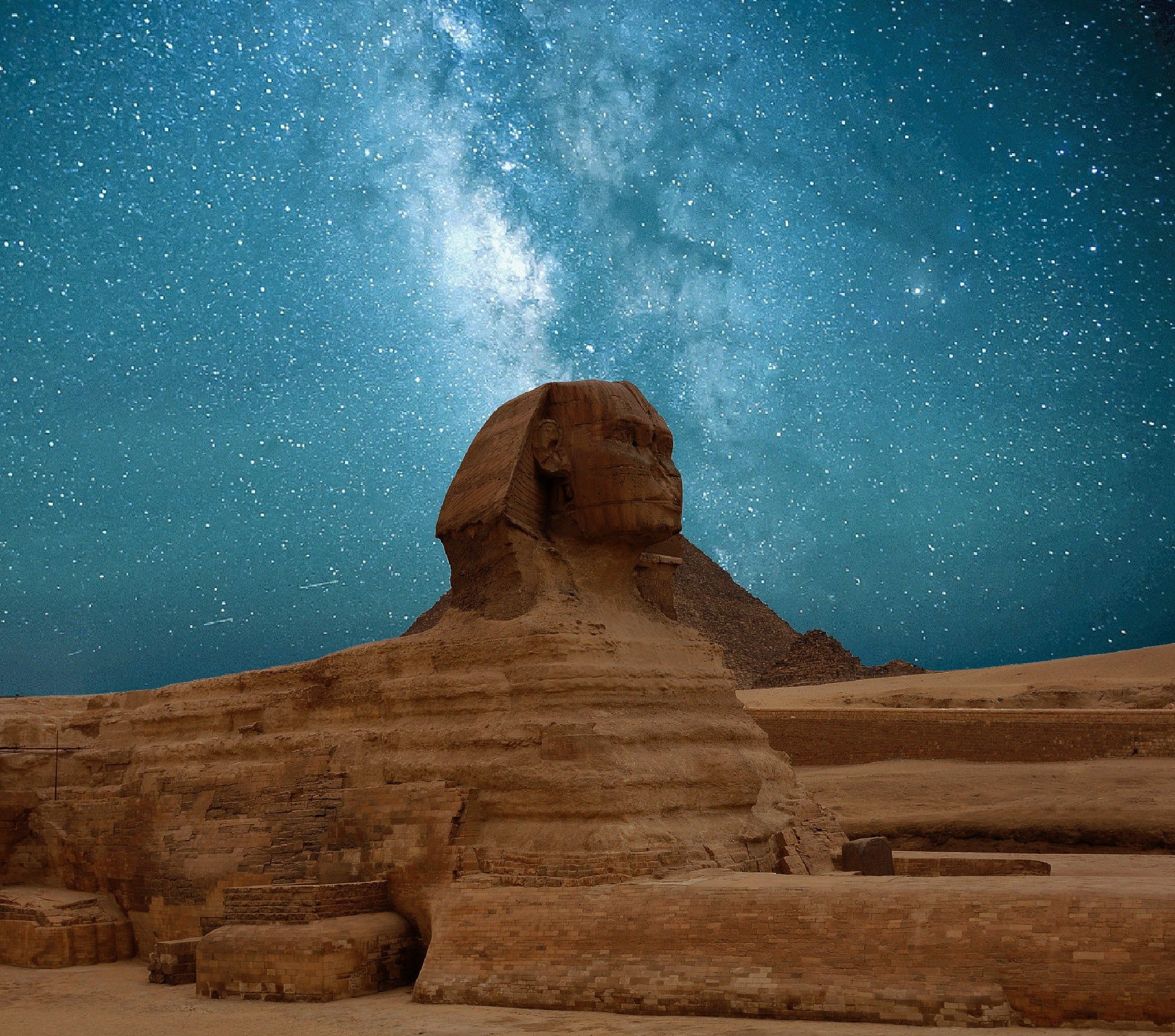
I had to laugh at Domino's Pizza which is right across the street from the Sphinx. But if you can ignore that, you'll be wowed by this incredible feat of architecture and ingenuity.
The Sphinx's face represents Pharaoh Khafre, who ruled in 2570 BCE. Kahfre's burial pyramid is the second largest of the Giza Pyramids.
The Sphinx is also a popular hangout for local teenagers. Don't be surprised if they want to practice their English with you or take a photo.
The Egyptian Museum
Located in Cairo right off Tahrir Square, the Egyptian Museum is mind-boggling. It's filled with artifacts, some as old as 4,000 years. The museum is vast, with little hallways leading to rooms filled with priceless treasures.
Exploring the museum feels a bit like exploring a pyramid.
The mummies are the best part. Not only will you see the mummified remains of Egyptian leaders and their families, but you'll also see the animals they took to the afterlife as well.
I'm not sure why anyone would need a crocodile in the afterlife, but seeing it was fantastic.
Sharm el Sheikh
If you're a SCUBA diver or just want to soak up the sun on a gorgeous beach, Sharm el Sheikh is the place to be. Located on the Red Sea, Sharm el Sheikh boasts crystal-clear waters and some of the best diving in the world.
Sharm el Sheikh is also Egypt's party capital. While it's perfectly fine for non-Muslims to drink alcohol in Egypt, you won't find much of a party scene in places like Cairo.
Nightclubs line the beaches in Sharm el Sheikh, and you can dance the night away. And if you decide you want to risk a clandestine hookup, this is the safest place to do so.
The Valley of the Kings
659 kilometers south of Cairo is Luxor, home to the Valley of the Kings. Most visitors use an Egypt tour company to combine visits to Cairo and Luxor. You can reach Luxor by car, train, or on a luxury cruise up the Nile.
The Valley of the Kings is a series of tombs housing the remains of the pharaohs who ruled from the 18th to the 20th dynasties. The Valley of the Kings needs a week or more of your time, so try to book an Egyptian tour that gives this magical site the time it deserves.
Located on the Mediterranean coast north of Cairo is the spectacular city of Alexandria . Founded by Alexander the Great in 332 BCE, the lighthouse at Alexandria was one of the seven wonders of the ancient world.
Today Alexandria is a modern port city with spectacular views, delicious seafood, and souks full of souvenirs.
However, you can't visit Alexandria and not see the Bibliotheca Alexandrina. It's a modern take on the ancient library, which is said to have held more written knowledge than any other place in the world.
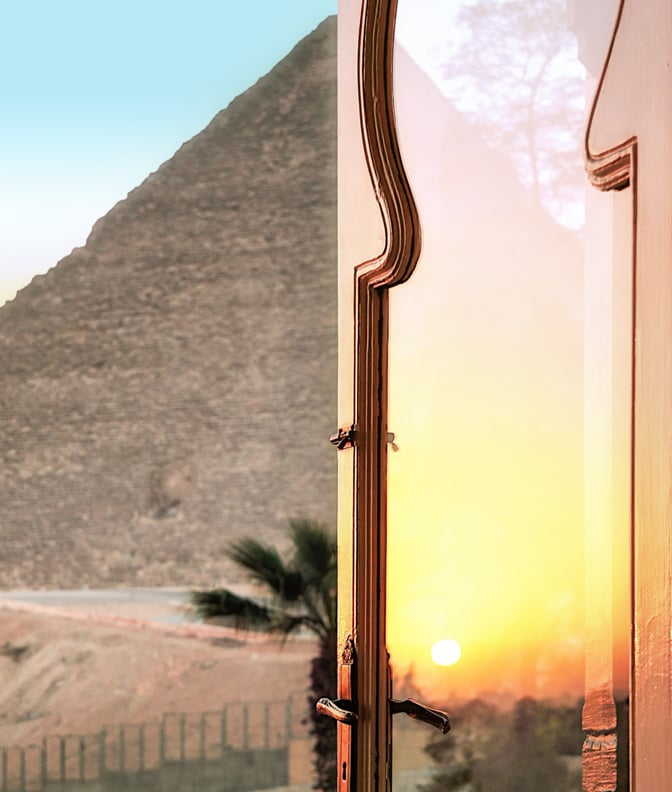
Pride events in Egypt
Pride events do happen in Egypt, but they're often underground, and participants are wary of repercussions. That being said, many members of Egypt's LGBTQ+ community are working hard to raise awareness and fight for their rights.
The United States Embassy does recognize Pride Month and may hold private events on the embassy compound. Check the embassy's website for more information.
Plan a safe LGBTQ+ Egypt visit
LGBTQ+ travelers can safely visit Egypt with a know-before-you-go attitude. Just be aware of your surroundings, dress in a conservative manner, and keep affection behind closed doors.
While it might be slow going, Middle Eastern countries are changing their attitudes related to LGBTQ+ rights. Since tourism boosts these economies, it's wise that they revisit their attitudes and laws regarding LGBTQ+ rights.
Read other EveryQueer x TrovaTrip LGBTQ+ travel guides:
- Mexico LGBTQ Travel Guide
- Morocco LGBTQ Travel Guide
- Turkey LGBTQ Travel Guide
- Spain LGBTQ Travel Guide
- Belize LGBTQ Travel Guide
- Colombia LGBTQ Travel Guide
- Jordan LGBTQ Travel Guide
- Find more on everyqueer.com/category/destinations
About the author

In 2019, Meg was selected as the International Woman of the Year for Facebook’s initiative with Girl Gone International for her work in LGBTQ-inclusive travel. She is also the international brand ambassador for Contiki, Macy’s, and Out Adventures. Meg serves on the Board of Directors of the International LGBT Travel Association and on the LGBT advisory board of Belmond Hotels and Resorts. Since starting in the LGBT travel industry, Meg has visited 65+ countries, spoken at LGBTQ conferences on five continents, published her first book, and had her content read by more than 10 million people.
Through detailed travel content, curated lesbian parties, and worldwide LGBTQ tours, EveryQueer teaches queer travelers how to safely see the world.
EveryQueer bridges across identities and borders by curating global LGBTQ+ content featuring LGBTQ+-affirming brands, destinations, and life-changing experiences. Like trusted friends, they share welcoming and affirming insider tips to inspire wanderlust and ensure our journey is as easy as it is unforgettable.
EveryQueer's mission is to inspire people of all sexual orientations, gender identities, and gender presentations to think differently about the global queer community while boldly seeking adventure and connection.
- Travel Tips (32)
- Destinations (30)
- Travelers (25)
- Content Creators (17)
- Inclusive Travel (15)
- LGBTQ+ (13)
- About TrovaTrip (10)
- Fun Reads (7)
- Operators (5)
- Giving Back (3)
- Travel Industry (3)
- General Information (2)
- Careers (1)
- Community (1)
- Trova Stories (1)
- March 2024 (2)
- February 2024 (1)
- December 2023 (2)
- November 2023 (1)
- September 2023 (1)
- August 2023 (1)
- July 2023 (2)
- June 2023 (10)
- May 2023 (3)
- April 2023 (1)
- March 2023 (3)
- February 2023 (1)
- December 2022 (1)
- October 2022 (1)
- August 2022 (4)
- July 2022 (1)
- June 2022 (1)
- May 2022 (1)
- April 2022 (4)
- March 2022 (7)
- February 2022 (6)
- January 2022 (5)
- December 2021 (29)
- Food & Drink
- What to pack
- City Guides
- Travel Hacks
- New Zealand
- North America
- Latin America
Copied to clipboard!
LGBTQIA Travel
Is Egypt Safe for LGBT Travelers?
By Meg Cale
Published on Nov 06, 2017
I was terrified to visit Egypt, not because it was a destination outside of my comfort zone or because of the social anxiety that comes with meeting new people, but because it’s illegal for me to exist there.
The week before my wife and I were set to embark on our mission for The Travel Project, Egypt was in the headlines for arresting more than 70 people at a concert for flying a pride flag .
https://www.instagram.com/p/Balu5Qdlx_-/?taken-by=megcale
Egypt is far from alone in their anti-LGBT policies. Most people have a perception that the world is divided into groups of “gays are welcome” and “death to gays” when in reality the issues are much more complex. Nearly half of the world’s cultures and wonders – or to be exact, 42.3% – are in areas with anti-LGBT laws. More if we’re including places that don’t have anti-LGBT laws but do have anti-LGBT social sentiments. Just because a place has no explicit laws on the books, doesn’t mean it’s safe or accepting of LGBT people.
https://www.instagram.com/p/BavbQhBlaNR/?taken-by=megcale
I wanted to go to Egypt because I take The Travel Project’s intention of discovering the ways travel can make you a better person, to heart. My wife and I run a popular travel blog, Dopes on the Road . I knew I wanted to document our experiences as an LGBT couple in Egypt so we could spread the word and encourage others about traveling in anti-LGBT countries, but wanted to do it from first hand experience and not just based on what we’d heard from other people.
RELATED: WHY SPAIN IS ONE OF THE BEST COUNTRIES TO TRAVEL TO IF YOU ARE LGBTQ
We were terrified, but we had to go through with the trip because we believe that travel should be accessible to our community. Egypt is home to some of the world’s most incredible wonders and LGBT people should be able to experience that. I’m so happy we decided to go through with it because Egypt is rich in culture, history, and was one of the most amazing travel experiences we’ve ever had.
https://www.instagram.com/p/BaubdvAlS2H/?taken-by=megcale
I felt 100% safe and comfortable with our Contiki tour group. Sherif our Trip Manager, went out of his way to make sure we were taken care of and felt at home.
Lindsay still wore clothing from the men’s department for most of the trip and we hung out together for the entire time, even sharing a bed in our hotel rooms.
https://www.instagram.com/p/Ba1TY-glp4a/?taken-by=megcale
I don’t expect every queer person to travel to the far reaches of the globe or visit anti-LGBT countries like Egypt, but I do hope that Lindsay and I are able to touch the hearts of the people we meet around the world and open their minds to supporting our community.
What we’re doing isn’t special or unique to us. Anyone in our community can spread love and help touch the lives of those they meet on the road. Most people are afraid to go beyond their comfort zones which is 100% normal – you don’t have to start in the remote corners of the world. Want to ease in slow and take the pressure off? Try travelling with a Contiki tour group…
Meg & Lindsay Cale travelled to Egypt with The Travel Project, to explore whether this region is a viable travel option for LGBTQ travellers. If you have are an LGBTQ traveller and you have a story you would like to share with the six-two community, visit our community contributor program .
What it’s like to visit Egypt as a transgender traveller
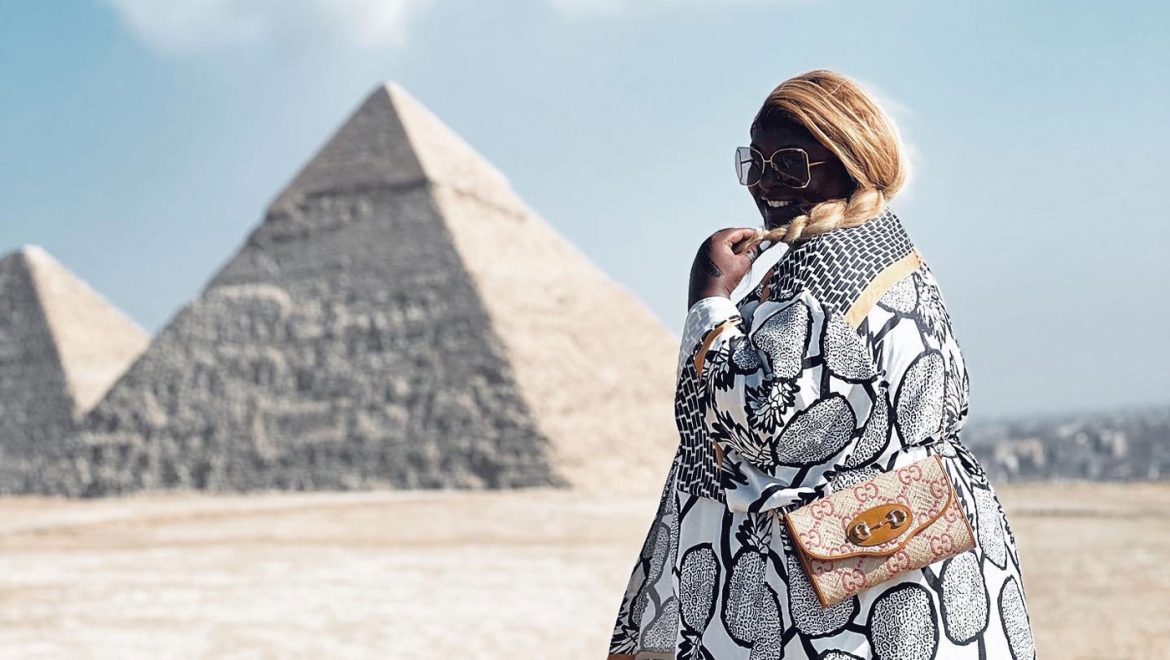
The Sphinx. The Pyramids of Giza. Desert moons, Valley of the Kings, spices, music, the Nile.
As a child, I was fascinated by the culture of ancient Egypt – papyrus scrolls, King Tut and the tombs pharaohs were buried in for everlasting life. Flicking through the pages of the National Geographic Egypt book my mother gave me inspired my curiosity about what seemed like another world.
Recently, my ultimate bucket list trip became a reality. Visiting Egypt – my first trip to the African continent – reignited my childlike wonder for the first time in decades. It still feels surreal to say that I have finally experienced the Motherland.
Facing my fears
When Intrepid invited me and some of my transgender and body positivity advocate peers to join a tour of our choosing, the pressure was on. It felt like a once in a lifetime proposal, and while I explored all the options – Antarctica, Southeast Asia, Vietnam, places I’ve dreamed of going for years – Egypt kept resurfacing in my mind.
And yet, I stubbornly thought to myself – if not now, then when?
As a visible transgender human rights advocate, I’m used to travelling to places where political and social attitudes towards transgender and queer people differ. But in this instance, the thought of travelling for leisure, rather than advocacy work, as a Black trans woman, to a country with numerous anti-LGBTQ+ laws and attitudes, presented a quiet fear that I couldn’t shake.
It is illegal to be transgender or homosexual in Egypt and the country has been shunned by human rights advocacy groups around the world for its aggressive transphobic and homophobic law enforcement.
And yet, I stubbornly thought to myself – if not now, then when?
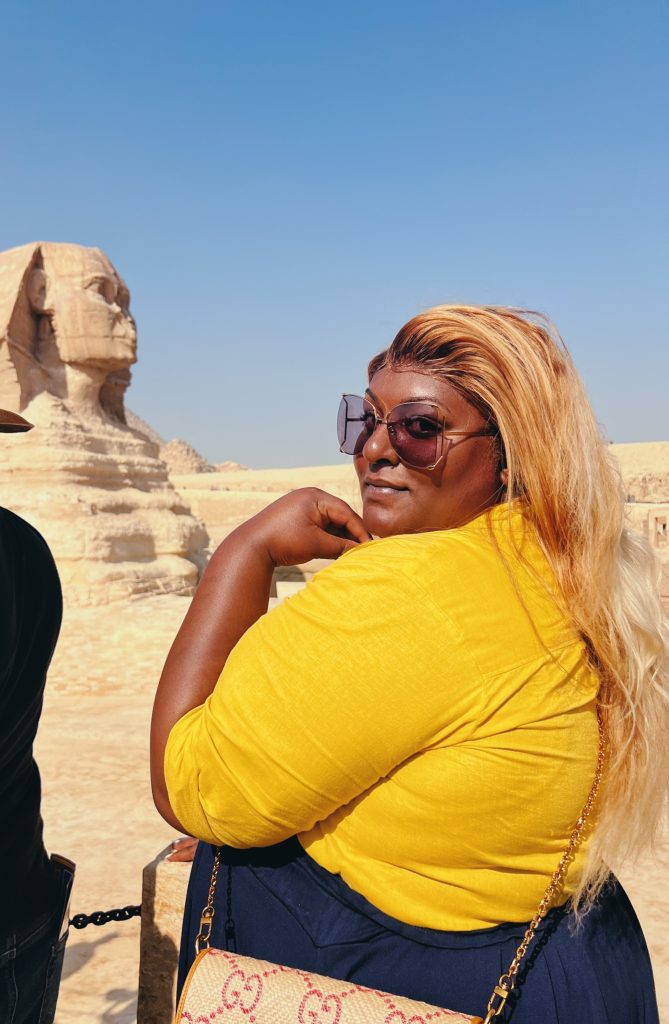
Eye-opening adventures
In late 2022 I landed in Cairo ready for an ‘Indiana Jones’ style Premium Egypt adventure . I knew that Intrepid prides itself on its group travel experiences that take in all the highlights while also encouraging you to get to know the local people and culture on a deeper level – and I found that it lives up to that aim in so many ways.
I’d never done group travel before and didn’t quite know what to expect. But I soon realised I was surrounded by like-minded travellers from around the world who shared many of the same aspirations for their first tour of Egypt as I did.
Our first adventure? Seeing the Great Pyramids at sunrise. From there we adventured by camel, ate kushari (a tasty mixture of pasta, rice, lentils and fried onions) with locals at a street food restaurant, toured museums filled with ancient artifacts and had cocktails by the pool at our hotel, learning more about each other and our parts of the world. We went on to visit the spice markets in Aswan, tour the Nile by riverboat, ride a felucca to the Nubian villages and hot air balloon over the Valley of Kings together (I’d encourage everyone to take part in the latter – even if you’re afraid of heights like me!).
A special moment that stays with me is seeing the hieroglyphs and representations of Hatshepsut, a visibly gender nonconforming pharaoh. Seeing yourself represented in history – especially as both a Black person and a trans woman – is phenomenal.
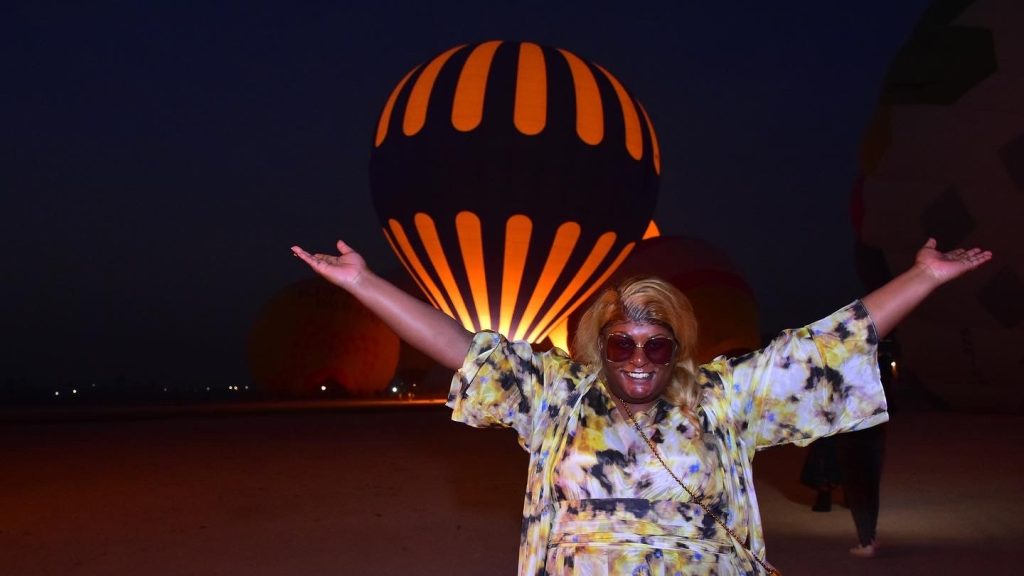
Tips for visiting Egypt as a plus-size LGBTQ+ traveller
As an LGBTQ+ traveller, your personal safety is always on your mind – that’s the reality. Bold as I may be, I have to balance being visibly transgender while also being respectful of the land I am visiting, its people and its customs.
Here are some steps you can take to ensure you have an excellent experience.
Travel with a group
If you’re LGBTQ+ and decide to visit Egypt, travelling on an organised group tour can help reduce any anxieties you may have. I spoke to Intrepid staff in advance and they took my safety concerns into careful consideration, working behind the scenes with airline, transportation and hotel staff to ensure I had the best adventure possible.
To be honest, I was expecting a white, cis, male, British leader but was pleasantly surprised to learn that Intrepid hires local people wherever possible. I felt extra comfortable travelling with leader Eman, a local Egyptologist and feminist Muslim woman who is blazing a trail in a male-dominated industry.
Be aware of local laws and customs
It’s important to consider local laws and customs. For example, in places like Aswan and Luxor, women don’t smoke in public. Men don’t share hotel rooms, and women dress modestly even in the high desert heat. Yes, rules and attitudes are more flexible for tourists, but I also think following local customs and values wherever possible is a sign of respect.
My sisters Diamond and Breonna struggled with the modest dress codes, but they adapted and in general people appreciated that we were trying. I think this is why, whether they knew it or not, people engaged the three of us – all Black, American, transgender women – in conversation, which I think can only help to shift perceptions of trans people overall, just by virtue of us making a little effort.
Go at your own pace
As a plus-size traveller, touring ancient temples and sites in the heat can be physically gruelling. There were folks in my group who do CrossFit and marathons and even they were wiped by the end of each day. You’ll be doing lots of walking, scrambling over rocks and squeezing into tight spaces – so gauge what you can do and modify accordingly.
For me, sometimes that meant staying behind as the group crawled on all fours to get into a tiny tomb. One day, I skipped a temple visit to stay in my room and rest. You are the guardian of your care, and I am proud I pushed myself to keep up with the group as much as I could, climbing in and out of feluccas and hiking hills to the villages. I took care of myself whenever I felt I had reached my limit and communicated with my guide when and where I would need to modify.
At the end of the day, everyone wants what you want: a good time and a memorable adventure. Also, Egypt is not a place for cute shoes (trust me, I ruined a pair of designer sandals). Sacrifice your need to match your outfit with your footwear in favour of tennis shoes with support – you won’t regret it.
Aria travelled as a guest of Intrepid on our 9-day Premium Egypt trip . Follow her adventures on Instagram @ariasaid .
Feeling inspired?
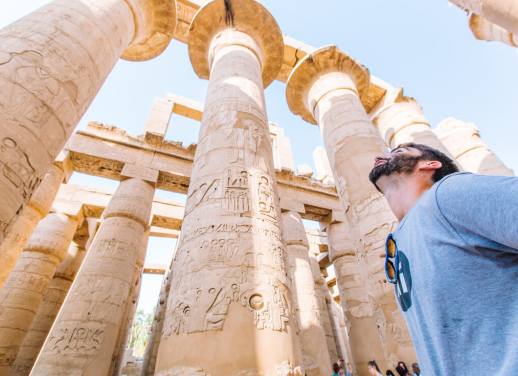
Aria Sa’id is an award winning political strategist and transgender advocate based in San Francisco. Most known for her role as Founder of The Transgender District, her work has been featured in Forbes, Harper’s Bazaar, CNN, Good Morning America, LA Times and more.
You might also like
Intrepid’s new women’s expedition is exploring saudi arabia..., this is what it’s like to explore antarctica’s..., 12 hours in the shoes (or muck boots)..., when your day job is leading expeditions to..., to celebrate turning 50, kerryn took her 50th..., what it’s like to spend a day gorilla..., encounters in the mist: exploring uganda’s gorilla sanctuaries , following in sacred steps on a journey from..., a trip to southern africa helped this plus-size..., pair your pride all over the world with..., globetrotters share what it’s like to spend your....

The ultimate 10 day Egypt itinerary for gay travellers (Nile river cruise included)
Sand swept with ancient intrigue and shaped by human civilisation’s most fantastic architectural feats, Egypt comes as no stranger to worldly travellers. Start out below the branches of the Nile Delta, following the river as its snakes ceaselessly south and legends of both Kings and Gods unfold. While Giza’s pyramids are an epic opener across the river from Cairo, it’s the tombs of Luxor that give the grandest of finales. Discover our favoured route through the nation on a 10 day Egypt itinerary, complete with a languid Nile cruise and wreck diving in Hurghada.
Tailor-Made Egypt: The Pyramids & The Nile River
Bask in the timeless majesty of ancient Egypt on an immersive journey through the Land of the Pharaohs, exploring its quintessential archaeological treasures with an Egyptologist, and cruise the Nile for four nights on stylish ‘Sanctuary Sun Boat IV’.
from $8,395 /10 days

El Manial, Old Cairo | Photo: Youhana Nassif
LGBT situation in Egypt
Getting the less-than-ideal facts out of the way, it must be said that Egypt remains a highly conservative country that seems to be getting worse, not better in terms of LGBT rights. Though homosexuality is technically not a crime in Egypt, prosecution under debauchery and public morals laws is a reality for some. Even as recently as 2017, there was a government crackdown on the gay Egypt community with a number of queer spaces being raided which resulted in 57 arrests. For this reason, the situation for LGBTQ+ travellers and locals remains tense and Egypt gay tourism development is stifled. While there is an underground scene for the gay community in gay Cairo and Alexandria, tapping into it comes with a risk. We’d recommend against using gay dating apps while in Egypt with extra caution being taken if approached by a local due to the possibility of set-ups and extortion. While you may see local men being affection with each other in the street, do not treat this as a sign of queer acceptance. To be safe, refrain from PDA and maintain discretion in public.
When booking accommodation, rest assured that midrange and top-end hotels will likely have no problem with accepting gay couples and those requesting a double bed, but the budget range hotels, particularly in more rural spots, may not be quite so used to accommodating gay guests. Lesbians meanwhile shouldn’t have any problems due to their sexuality, though they may be considered ‘single’ unaccompanied females in want of a male friend.

Photo: Spencer Davis

Photo: Tima Miroshnichenko
When to Visit Egypt
Avoiding the worst of the heat makes winter the best time to visit Egypt, from late November to late February when the Nile Valley area is temperate and Cairo leans a little towards chilly. The height of the season comes between December and January (and again during Easter) when Luxor and Aswan are at their busiest, but you’ll also find that Sinai resorts remain popular for the whole period. Other regions such as Hurghada on the Red Sea Coast see tides of visitors all year round, with March and April offering hard-to-beat highs of between 26-30°C.
Day 1 - 2: Cairo
Ready your sunglasses to avoid sand in your eyes as we speed off into the desert to explore the main sights of the capital, from imposing pyramids to spice-strewn markets. You’ll want to spend around two days in Cairo, getting the best attractions ticked off before escaping the noise and the chaos. The Great Pyramids of Giza will likely be top of your Cairo itinerary, a site best visited early to ensure an entry ticket. Don’t underestimate the size of the site here – spanning the three main pyramids, Sphinx and solar boat – so dress comfortably and flag down a camel or horse-led carriage if walking gets too much. Hiring a driver is also an option along with all-inclusive guided day tours.
Day two gives us another hit of ancient culture, this time spying the treasures on show in the Egyptian Museum, around an hour from Giza. Fifteen minutes down the road is Cairo’s main bazaar, Khal El-Khalili, the perfect spot to grab some street food before haggling aggressively over handmade souvenirs, artisan goods and antiques, within the souk. With additional time in Egypt, an optional day tour to Saqqara is a definite consideration, from where you’ll get to see the ‘step’ pyramids built earlier than those at Giza (around the 27 th century BC) inside a smaller walled complex.

Cairo | Photo: Shady Shaker
Day 3: Aswan
A rather more breathable city sees us into day three, as we fly south to Aswan, ancient Egypt’s gateway city. From here we get an introduction to Egypt’s great temples, particularly Philae at Agilika Island, best known as the resting place of Osiris and accessible via water taxi from Marina Philae Temple. Though the temple has suffered some water damage and fading due to rising flood levels, its relocation by UNESCO ensures the future safety of its incredible hieroglyphic carvings. Bear in mind that you’ll be required to do some serious haggling with the ship captains to traverse the river, or else book a day tour with a guide who’ll barter the boat fee for you.
From Philae, another temple stop is that of Kalabsha, just south of Aswan High Dam and much quieter and smaller than the last. Barter a return trip across Lake Nassar, wandering the courtyard and intricately carved rooms of Kalabsha in relative peace before finishing up with a mosey through Beit El-Wali, a smaller temple from the time of Ramses II, beautifully preserved in colour after millennia buried beneath the sand. For a place to rest up, try an authentic guesthouse on the West Bank, allowing for a boat journey across the Nile with locals first thing in the morning.

Photo: Oziel Gómez

Photo: Mhmoud Nashed
Day 4: Abu Simbel
Also built during the rule of Ramses II around 1244BC are the dual temples at Abu Simbel, reachable by day trip from Aswan or on an overnight trip to beat the morning rush (the cruise ship tourists usually crowd the site around 5 am, while the day-trippers from Aswan come between 8-11 am, so 7 am is considered a good start time). Despite taking a little effort to get to, the temples here are decidedly worth it. The impressive power of King Ramses and his wife Nefertari is immediately evident, on sight of the four huge statues of Ramses guarding the entrance walkway. The Great Temple was built for Ramses himself while the smaller – yet no less impressive – temple was Nefertari’s, also flanked by six statues. Originally cut from the mountainside near Aswan, the temples were relocated to higher ground in 1968 to protect them from flooding by the new Aswan High Dam, a feat nearly as impressive as the temples themselves! If staying the night in Abu Simbel, head back to the temple site for sunset and the Light Show after dark.

Abu Simbel Temples | Photo: Aussieactive
Ride in a rudimentary felucca or splurge on a stay-aboard luxury cruise ship; whatever you can afford, the traditional Nile cruise is a definite must on your gay Egypt travel itinerary
Day 5 - 7: Nile cruise
Ride in a rudimentary felucca or splurge on a stay-aboard luxury cruise ship; whatever you can afford, the traditional Nile cruise is a definite must on your gay Egypt travel itinerary. The more budget-friendly felucca relies heavily on wind speed to get you where you need to go, but, in the absence of a breeze, you may not get far. If you’re sailing as a means to get from Aswan to Luxor, forking out on the cruise ship will be worth it. Wind reliant or not, both options are great ways to view the river and its many scenic settlements, passing by the temples of Karnak and Edfu as well as the renowned Valley of the Kings near Luxor along the journey.
Those opting for the five-star cruise can enjoy the high life on their sundeck over 5 days and four nights, stopping for various day trip excursions and anchoring at night. The real travel time from Aswan to Luxor is around 1.5 days, allowing enough time for deck pool dunking, buffet indulgences and at least one evening disco with your fellow cruisers. Besides that, you can also use the time to learn more about the region’s ancient history from an Egyptologist guide.

Photo: Flying Carpet
Days 8 - 10: Luxor
Leaving Luxor until last ensures the earlier temples are not outshone by the marvels that await here. The city and its surrounds boast some of Egypt’s most culturally significant sites, including the Valley of the Kings’ 63 tombs, with the painted tombs of Tutankhamun, Ramses I, VI, IX, Thutmose and Amenhotep counted among them. With so many kings to keep track of, hiring an experienced guide is essential for understanding and to help you steer clear of the main tourist traps. One of the most popular things to do in Luxor meanwhile is to take to the air in a hot-air balloon over the valley. Though these rides don’t come cheap, the unbeatable views over the entire temple complex and free hotel pickups operating from both the East and West Banks, make this a real vacation highlight.
Once the capital of Upper Egypt marking both the ancient city of Thebes and God Amun, Luxor will never cease to amaze with its ‘open-air museum’ charting Ancient Egyptian history excavated from the sands of time. From the centred Luxor Temple, view the imposing statue of Ramses II (more impressive if you’ve not seen its twin in Paris ’ Place de la Concord) before walking the Avenue of the Sphinxes towards Karnak Temple, another vast religious site which – when wholly dug out – will be second only to Cambodia’s Angkor Wat. Besides the main temple offerings, El Souk market is a great place to stock up on last-minute souvenirs, unfolding along a pedestrian-only street in the centre of Luxor. For the local market, try following El Souk further down towards the east of the railway.

Photo: Stephanie Cook

Luxor | Photo: Tom Podmore
Once the capital of Upper Egypt marking both the ancient city of Thebes and God Amun, Luxor will never cease to amaze with its ‘open-air museum’ charting Ancient Egyptian history excavated from the sands of time
Diving in Egypt
Clearer and more biodiverse than you might imagine, diving in Egypt has grown hugely in popularity since the 1950s when Greek and Italian workers began the trend with spearfishing expeditions near the traditional fishing village of Hurghada. Since then, the Red Sea and its fantastic coral reefs no longer remain a secret and international diving centres are now myriad all over Hurghada. In easy reach of both the capital and the Nile Valley, this northern resort town is perfectly placed to bring you many of the best diving sites in the Red Sea, particularly those around the Giftun Islands and the numerous shipwrecks dotting the local seabed. Diving Hurghada is suitable for both newbies and veterans, with a wide choice of shallow beginner dives alongside more adventurous wreck dives.
Take a look at the local Chamber of Diving and Watersports (CDWS) website for a list of regulated dive centres, otherwise booking a course through the many top resorts that line the coast in El Gouna, Hurghada, Marsa Alam, Sharm El-Sheikh and Taba. Thanks to the moderate weather in the north, travellers can choose from package tours throughout the year.

Sharm el-Sheikh | Photo: Nariman Mesharrafa
Want to simplify luxury travel planning?
Whether you want a resort vacation, wildlife safari, city break, luxury cruise, wellness retreat, honeymoon, once-in-a-lifetime adventure or weekend escape, the trip curation experts at Mr Hudson make travel planning a breeze. Find out how we can handle the finer details of vacationing in style.

Photo: Sally Wilson
Cairo | Photo: Omar Elsharawy

Photo: Osama Elsayed

Al-Nayzak | Photo: Isabella Juskova

Luxor | Photo: Hana El Zohiry

Photo: Roxanne Shewchuk
Photo: Elizeu Dias

Marsa Matrouh | Photo: Youhana Nassif

Photo: Fynn Schmidt

Photo: Pixabay

Photo: Alex Azabache

Photo: Refaat Seoudy
Did you enjoy this article? Then sign up for our newsletter
Did you enjoy this article the same team that curates our content designs your perfect trip, explore more.
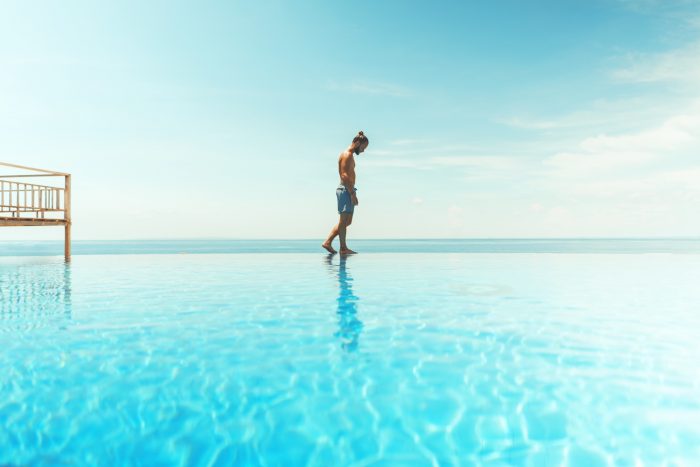
The 10 best Caribbean wellness retreats
Those in need of the ultimate stress relief should recline one inch further and book themselves into one of the best Caribbean spa resorts.
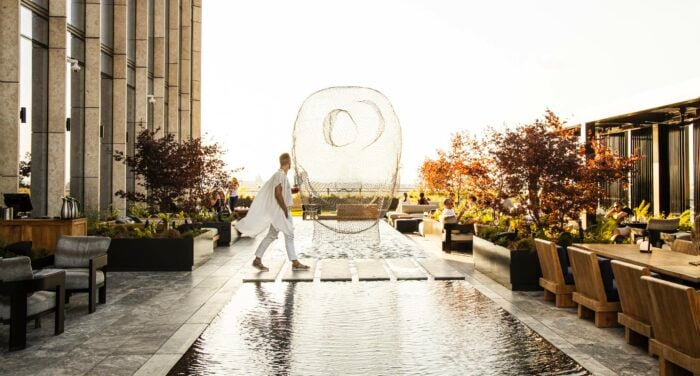
Rooftop brunch NYC: The best rooftop restaurants in New York City
We’ve compiled a list of the best rooftop restaurants in NYC that offer a brunch menu, for days when a Dunkin’ Donuts’ Americano on the sidewalk just doesn’t cut it.
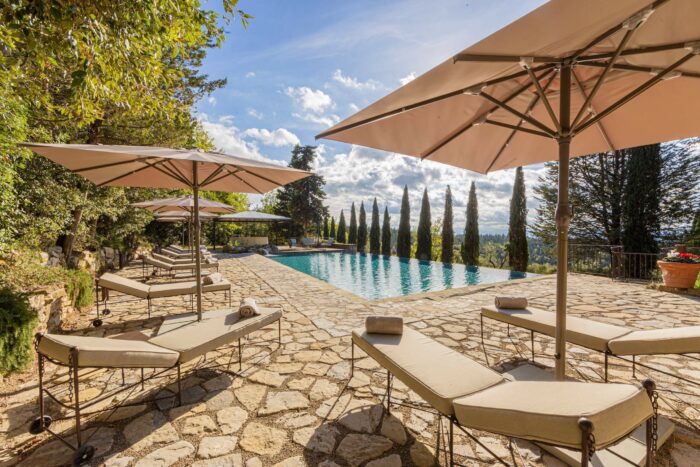
Villa Ardore: A luxury Tuscan villa in the heart of Chianti
While eight suites, wine country views and a heated infinity pool all make Villa Ardore undeniably luxurious, it’s features like a Roman spa, stunning culinary gardens and hand-picked artisan furnishings that give this reinvigorated 15th-century Tuscan farmhouse a touch of something extra special.
Subscribe to our newsletter
You can unsubscribe at any time by clicking the link in the footer of our emails. We use Mailchimp as our marketing platform. By clicking below to subscribe, you acknowledge that your information will be transferred to Mailchimp for processing.
Sign up for exclusive insider promotions
Subscribe to our Gay Travel Newsletter here
- Tour Calendar
- Destinations
- Tailor-Made Vacations
- Our Company
- Australia & Oceania
- North America
- South America
- French Polynesia
- New Zealand
- South Africa
Let’s hit the road
WHERE DO YOU WANT TO TRAVEL?
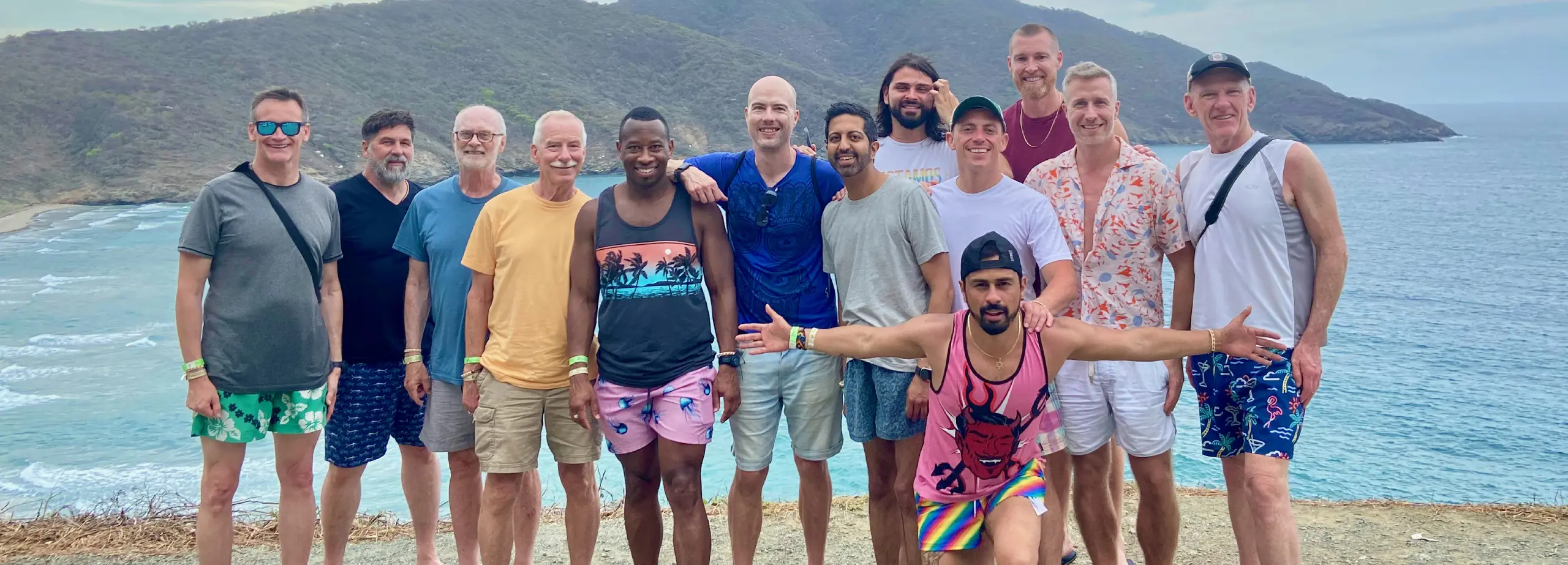
New 2025 Gay Tours
Over 40 Trips Are Now Live!
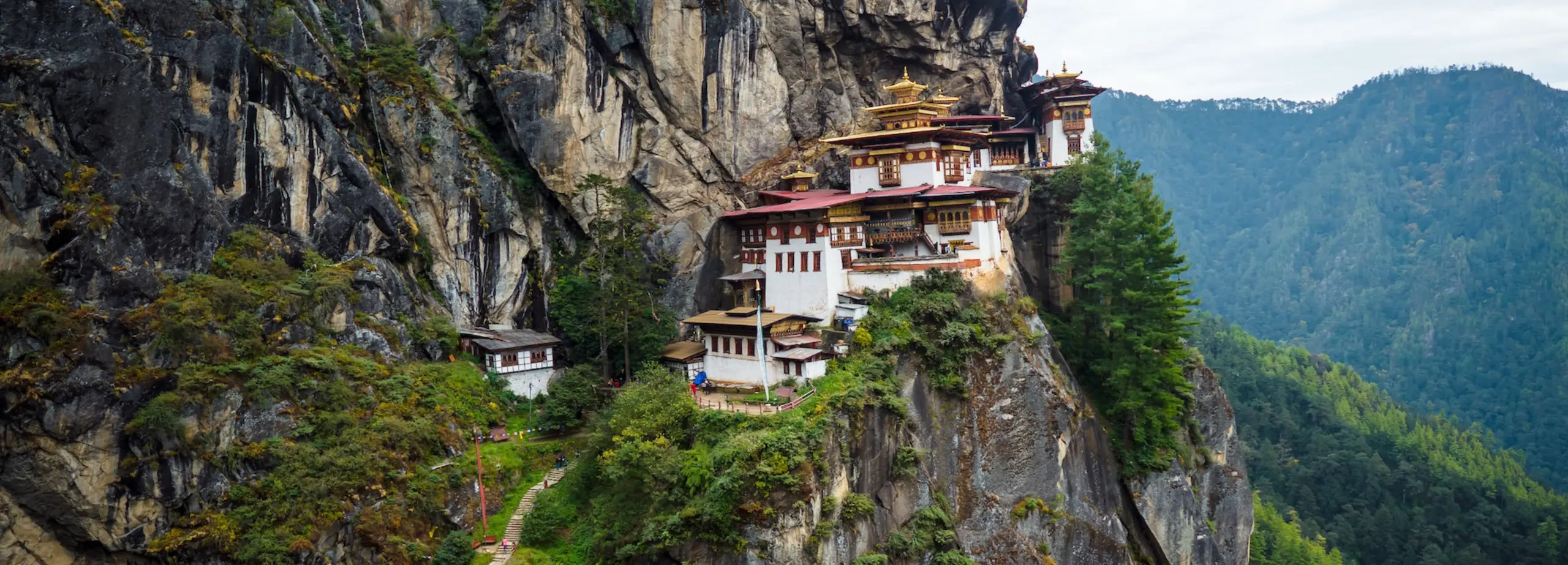
Limited Edition Tours
Unique, once-in-a-lifetime LGBTQ+ vacations
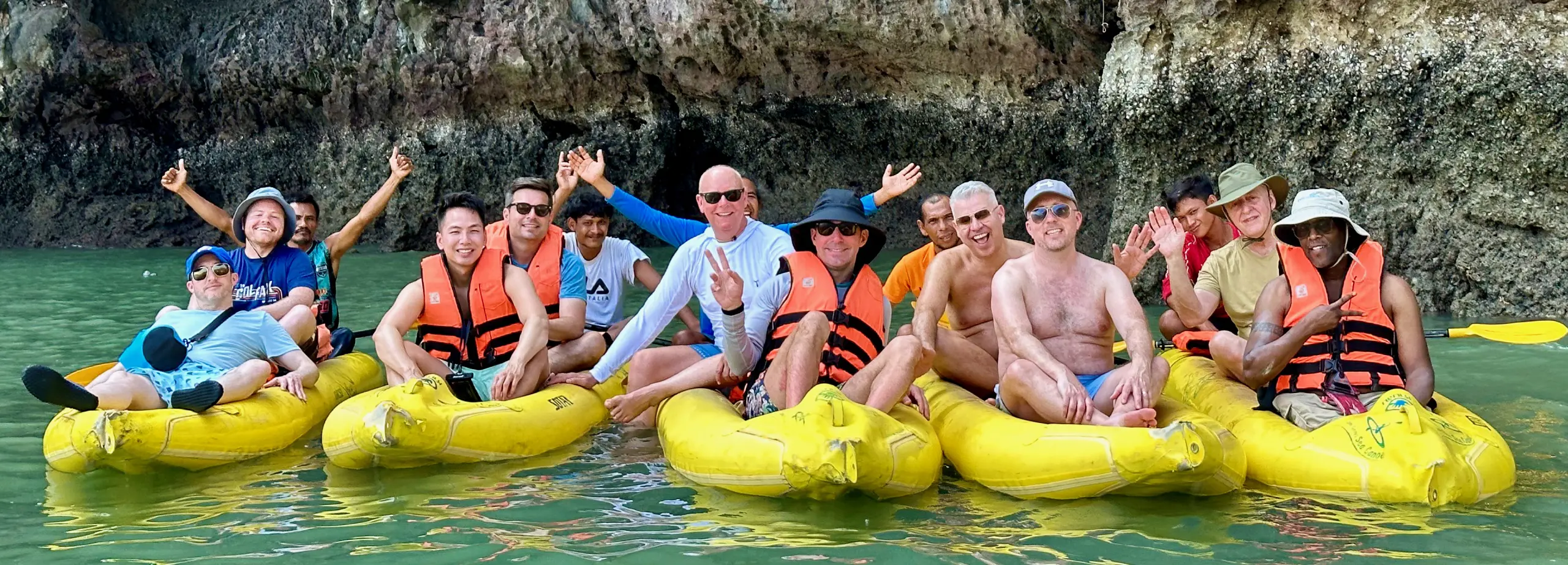
Explore our Tours
Where Do You Want To Travel?
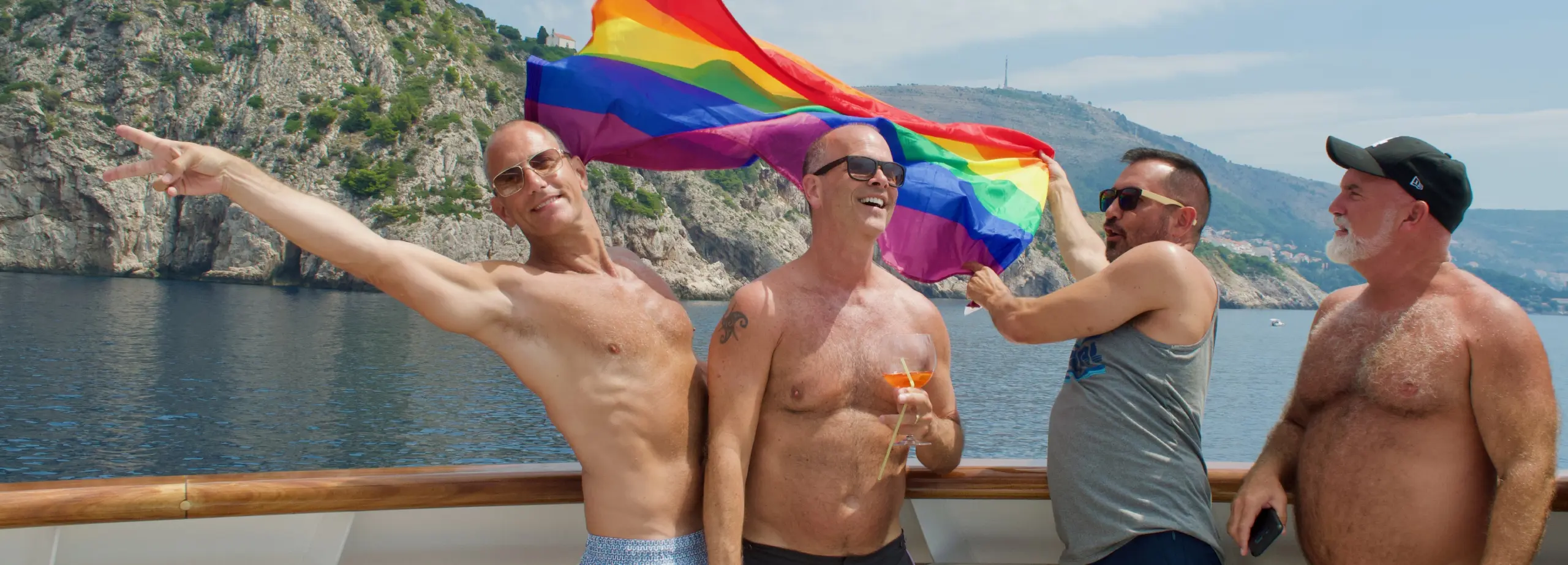
Gay Cruises
Small Ship Gay Cruises
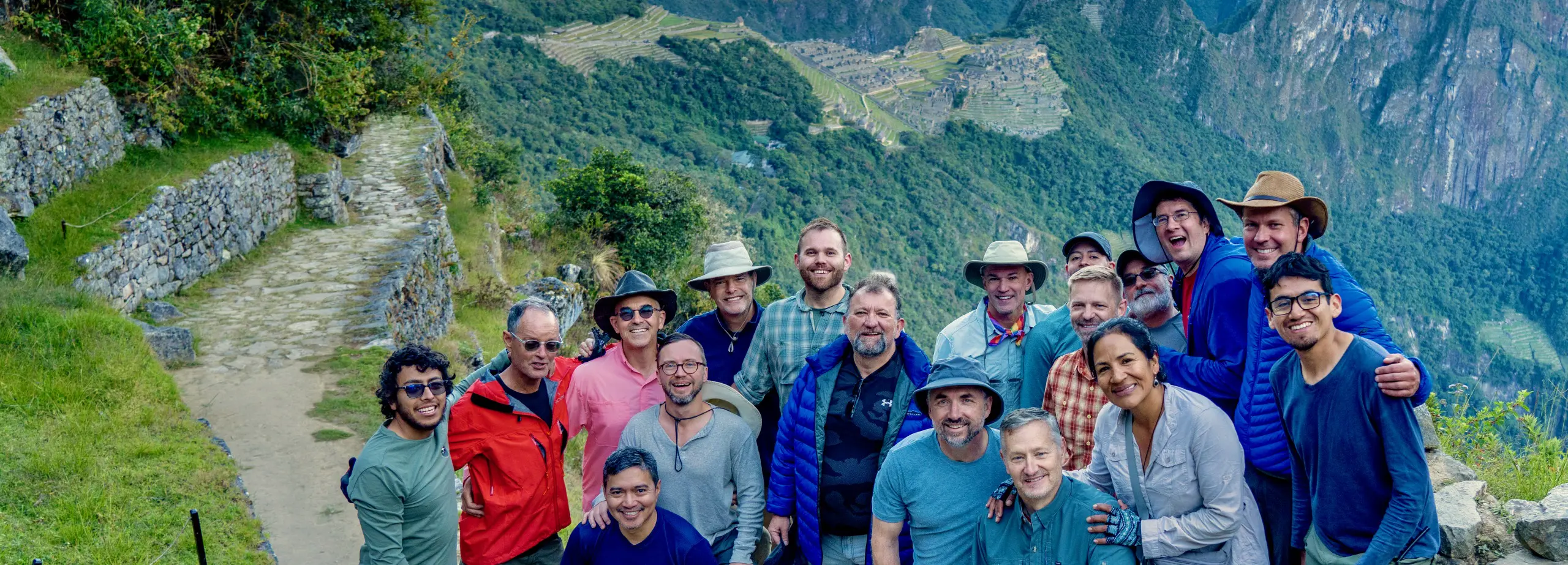
Active Tours
Guided expeditions to natural wonders
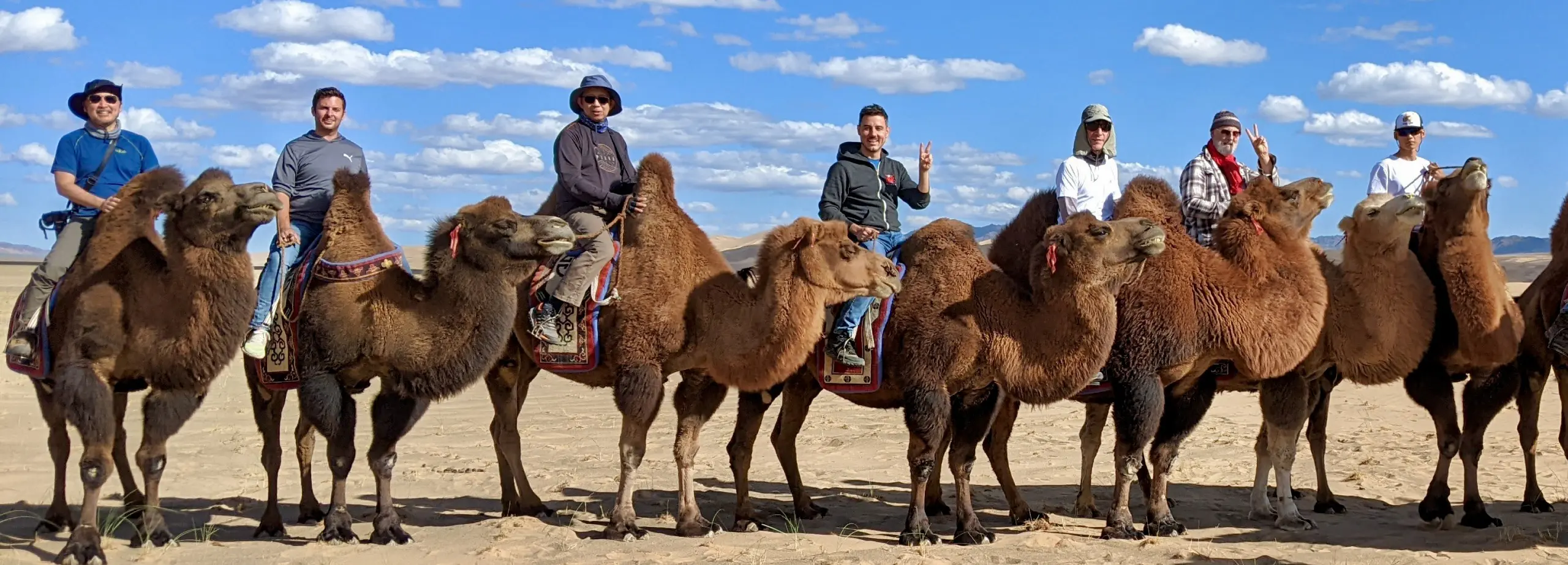
Cultural Tours
LGBTQ+ tours in over 35 countries
Out Adventures is the world’s premier provider of small-group LGBTQ+ holidays, cultural tours and gay cruises. Choose your preferred Theme, Destination or Trip, and let’s hit the road!
Gay tours by theme, upcoming gay tours, tailor-made vacations, choose your date, choose your destination, tell us what you want to do, travel with us, some from our travellers, the inca trail was an incredible experience..
I had such a great time with the Group and Ale. Group was super friendly and Ale was amazing, funny and such a fantastic guide and person. The Inca trail was an incredible experience. Overall the trip was great and highly recommended.
Gus & Justin R
Amazing. Our Guide was very fun and knowledgeable. She made the trip seem seamless and was a great resource of information.
This is a must-do adventure!
The Rwanda Gorilla Trek was easily one of the most beautiful, spectacular, exceptional moments in my life! To be so close to these magnificent creatures was incomprehensible and life-changing. The Golden Monkeys were phenomenal as well. This is a must-do adventure!
It exceeded all expectations
This was my first Out Adventures experience, and it exceeded all expectations. The team, the boat we were on, the places we visited, and the other travelers were all just wonderful. I would highly recommend Out Adventures!
Once in a lifetime adventure
Once in a lifetime adventure everyone should experience, surrounded by a great group of people. Outstanding organization and communication from the Out Adventures representatives so there was nothing I had to worry about once the trip was booked.
Christopher R
Everything was excellent and ran smoothly.
The experience, the accommodations, the people, and the food – Everything was excellent and ran smoothly
Epic, amazing, and a trip I'll remember forever.
Epic, amazing, and a trip I’ll remember forever. Loved, loved loved our guides and camping in the middle of the Serengeti was an experience I will never forget.
Jeff & Dean
We love out adventures and always have a great time.
We love Out Adventures and always have a great time. Unmatched in quality. We also loved meeting new people, Wadi Rum and Petra. Wadi Rum is stunning.
Featured Posts
Was lawrence of arabia gay hollywood’s love affair with jordan.
Uncover the homoerotic history of archaeologist TE Lawrence who inspired Lawrence Of Arabia, the 1962 movie that put Jordan on the map. Read More
‘Support For The Cuban People’ LGBTQ+ Tours For Americans
Our Support For The Cuban People tour is designed to satisfy the requirements and documentation for Americans to visit legally, as well as provide a comprehensive perspective on Cuban art, cuisine, history, and daily life. Read More
Mykonos, Greece: Why You’ll Love This LGBTQ-Friendly Paradise
Greece was one of the first places on Earth to embrace gay stuff way back in the 7th century BCE, and today, it's home to Mykonos, one of the most LGBTQ-friendly islands in the world. Read More
Ooooooookavango Where The Wind Comes Sweeping Down The Delta
We're flexing our musical muscles, (sometimes terribly) and defying gravity to visit 525,600 creatures on a sassy safari sojourn to Botswana's Okavango Delta. If you're a fan of broadway, this blog's for you! Read More
Forest Bathing Is A Surging Trend, But What Is It?
People are going out to forests and doing... what?! This new hobby is making a splash with nature lovers worldwide. Read More
99% Of People Have Never Travelled To This Hidden Kingdom
It’s relatively small, landlocked, filled to the brim with tradition and veiled in an aura of mystery and spirituality. Read More
Gay Cruises 2025: A Definitive Guide
This handy (and sassy) guide will help you decide which gay cruise to embark on in 2025. Read More
7 Highlights Of Our Gay River Cruise Down The Mekong
From the temples of Angkor to palatial residences and gondola boat rides, our 13-day Mekong Gay River Cruise is the ultimate sampler of Southeast Asian culture! Read More
Stays That Slay: Namibia
Namibia is a land of unbridled beauty, and we've handpicked the most exquisite hotels and game lodges for our Skeleton Coast Expedition. Read More
Tired Of Bear Runs? These Bear-friendly Trips Don’t Involve Running
From the northern lights to the southern hemisphere, these guided gay tours are the bear run alternatives you never knew existed! Read More
Are You A Travel Top? You May Be Missing Out.
If you've ever organized a trip, you know how much of a hassle it can be to deal with messy travel logistics. There's a better way to travel that you may be missing out on. Read More
Costa Rica is a Down-low Hotspot for Gay Tourism
Costa Rica gay tourism might be the best-kept secret; dazzling nightlife, lush jungles, pristine beaches and a volcano! Read More
Why New Zealand is the gayest place on Earth
Small but mighty, little gay NZ punches above its weight in regards to LGBTQ+ rights and happiness. Read More
9 Reasons to Join Our Gay Greenland Cruise
Explore the world’s largest island on the newly built, cutting-edge Ultramarine – with an LGBTQ+ group! Read More
Homosexuality In Japan: A Surprisingly Colourful History
Japan has a fascinating homosexual history, from open-minded Buddhists to promiscuity, alleged sex cults, and even Gay Samurai. Read More
New Zealand North or South Island? A common quandary.
Having trouble deciding which island is right for you? These highlights and hidden gems are sure to be helpful. Or pair these tours back-to-back and see it all! Read More
The World’s 10 Greatest LGBTQ-Friendly Countries for Travellers
Our fearless leader Rob offers his list of the most gay friendly countries in the world. Do you agree with his list? Read More
5 Tantalizing Reasons To Join Our Gay Tanzania Safari
An African safari is a once-in-a-lifetime adventure for many. And we've perfected the experience with a gay twist that ensures you relish all the rugged luxury, wild animals, and beautiful landscapes with a great group of guys. Read on to find out what makes it so special. Read More
7 Reasons to Join an Antarctica Gay Expedition
We offer LGBTQ+ travellers 7 reasons to visit the 7th continent, Antarctica! Read More
Stays That Slay: Ultramarine
Out Adventures returns to Antarctica aboard an all-new ship – The Ultramarine – in 2024. Read More
To invite friends or fly solo? An Out Adventurer on the pros and cons of both.
Breaking down common anxieties and concerns many solo travellers feel joining a gay group tour. Read More
Stays That Slay: Mexico
Our back-to-back Mexican escapes are two great reasons to sleep around...at nice hotels. Read on to see the LGBTQ-welcoming hotels where you could lay your head if you join us in Mexico. Read More
Five Hot New Reasons to visit one of The World’s Oldest Civilizations
Egypt is home to some of the oldest chapters in human history, lending it natural appeal to history buffs and travel lovers. Here's why we're so excited about a visit to the land of Pharaohs and pyramids. Read More
Stays that Slay: Kenya
The lions and tigers may epitomize a safari, but it's the luxurious accommodations and glamping that'll make or break it. Here's a preview of the accommodations we'll enjoy on our gay Kenya safari. Read More
Stays That Slay: Costa Rica Eco-Adventure
Read on to see where you'll rest your head on our Gay Costa Rica Eco Adventure. Read More
9 Tantalizing Reasons to Join Us For Sydney Mardi Gras
The campiest, brightest, over-the-top Pride festivity on Earth: Mardi Gras! This really is a party like no other. Read More
Stays That Slay: Southern New Zealand
Despite being one of the smallest nations we visit, New Zealand has so much to offer we created back-to-back trips that focus on the North and South islands. This post dives into the accommodations on our Active South Island Expedition, including a night aboard a boat. Read More
Stays That Slay: Northern New Zealand
New Zealand is rugged, unpretentious, and sparsely populated. However we still found some of the most accommodating places to welcome you to the Land of Middle Earth. Read on to check out where we'll be checking in. Read More
Dance of the 41: The Drag Ball That Shook Mexico City.
Read all about the 1901 drag ball that shook conservative, Catholic Mexican society to its core. Read More
Stays That Slay: Montenegro & Albania
After hiking Montenegro and Albania's remote forests and mountains, we've reserved some extraordinary hotels to kick back in. Read More
Meet Our Beloved Local Cuba Guide
After some back-and-forth emailing, our local Cuba guide introduces himself, offers a covid update, discusses gay life on the island and shares his favourite Cuban sites and cities. Read More
Tango’s Fascinating And Queer History
Tango can be traced back to Buenos Aires' poorest neighbourhoods where immigrants, former-slaves, pimps and—yes—LGBTQ people popularized it. Read More
Gay Guide: Melbourne
Written by a former Melbournian, this gay guide focuses on where to go, eat and sleep in Australia's second-largest city. Read More
Everything You Need To Know About Our Montenegro & Albania Gay Hiking Tour
To help you prepare for our Montenegro & Albania gay hiking tour, we compiled everything you need to know below. Read on, and then trot on. Read More
Stays That Slay: Australia
For our first gay tour of Australia, we wanted to reserve accommodations as killer as the country's arachnids. Check out a preview of the hotels and lodges we settled on here. Read More
Meet Ancient Egypt’s First Gay Couple. Allegedly.
Among the pyramids we visit on our upcoming Egypt cruise lies the necropolis Sakkara. Herein awaits the tomb of (likely) Egypt's first gay governors! Read More
Flexploration: Which Colombian Excursions Will You Choose?
As a spicy new addition to our roster of Flex tours, Colombia: Bogotá to Cartagena is overflowing with add-ons and excursions. Here's a breakdown of each optional activity and why you'll want to consider booking them. Read More
Beyond Tacos: Mexico’s Best Street Food
Mexico's mighty taco may be its most famous contribution to the culinary world, but it is far from the only. Read on for some of our other favourite Mexican street foods. Read More
Stays That Slay: Egypt
For our first tour of Egypt in nearly a decade, we wanted to find accommodations fit for a pharaoh. Check out the luxe lodgings we settled on here. Read More
- Gay Tailor-Made Vacations
- The Gay Travel Blog
- Frequently Asked Questions
- Booking Conditions
- Newsletter Sign Up
- [email protected]
- Toll-Free (CAN/US): 1-866-360-1152
- International: +1-416-531-8795
By using our website, you agree to the Out Adventures Privacy Policy which includes Out Adventures' practices regarding personal data and cookies. I AGREE
Be the first to know!
Subscribe to our gay travel newsletter and receive exclusive content including new tour announcements, hot promotions, and the best gay travel information out there!
What type of travel are you interested in?*
Thank you for signing up for our Lesbian Travel E-News!
We need to confirm your email address. To complete the subscription process, please click the link in the email we just sent you, and add [email protected] to your address book so our informative and inspiring newsletters land front and centre in your inbox.
- The Out Adventures Team
- Traveller Login

Is it Safe for Gay Couples to Travel to Egypt?
According to contemporary Egyptian law, homosexuality itself has not been criminalized, but gay couples can still be persecuted. Discretion is recommended for gay travellers in Egypt.
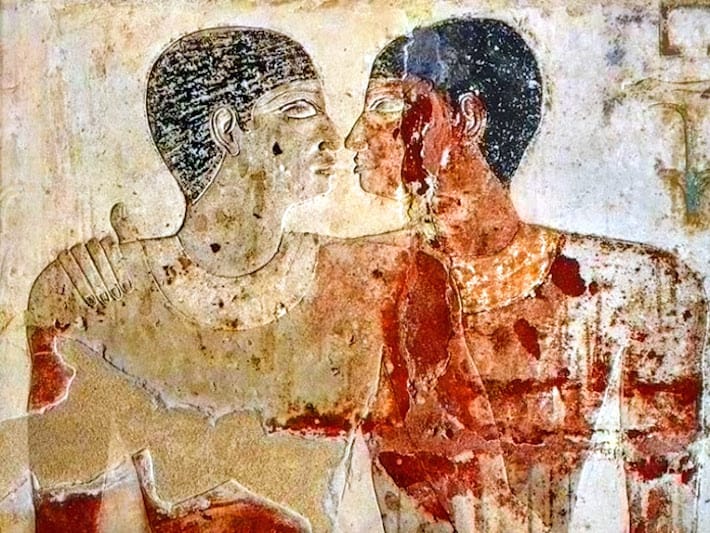
Egypt is a Muslim country, and as such, also quite a conservative country. It certainly isn’t as conservative as other Muslim countries such as Saudi Arabia. However, it is still a conservative country, and especially when it comes to things like same sex relationships.
With its incredible ancient history and its abundant natural beauty, Egypt is an amazing country to visit, but visitors should respect Egyptian culture. So, is it safe for gay couples to travel to Egypt ?
Let’s take a look:
Public Displays of Affection
Public displays of affection among Egyptians are something you will almost never see. This is not only the case in Egypt, but also in many other countries that are not even Muslim countries.
Sure, when it comes to the younger generation, you may see boys and girls holding hands in public, but you are not likely to see anything more than that. If displays of affection in public among heterosexual couples are frowned upon, it is even more of a taboo among same sex couples.
Is it safe for gay couples to travel to Egypt? Yes, but it is best to save your affection for the privacy of your hotel room. While you most likely won’t be arrested for gay behaviour in public or while visiting Egypt’s many amazing tourist attractions , you will almost certainly attracted stares and unwanted attention.
Is it Safe to Travel to Egypt as a Gay Couple if you are Married?
Is it safe for gay couples to travel to Egypt if they are legally married in their own country? Egypt’s laws are essentially based on the religious laws of the country’s recognized religions, with the two main ones being Islam and Coptic Orthodox Christian. Since neither of these religions view same-sex relationships or same-sex marriage as being legitimate, neither does Egyptian law. Only marriage between a man and a woman is recognized in Egypt.
Will same-sex marriage prevent you from being allowed into Egypt? No, but if you are a same-sex couple, you should not show any signs of affection in public, and especially not in front of immigration officers when you land at the airport in Cairo.
Can Gay Couples Share a Hotel Room?
Yes, gay couples can share hotel rooms in Egypt, as well as cabins on Nile cruise boats. In some remote areas, there is a chance of being turned away, but most, if not all hotels in Egypt’s major cities welcome gay travelers. Again, it is probably best if you don’t show displays of affection outside of your room or cabin.
Leave your Rainbow Flag at Home
When you visit a foreign country, you need to abide by that country’s laws, and you need to respect that country’s culture. In Egypt, most people view same sex relationships as being wrong and immoral.
Carrying a rainbow flag in your luggage could lead to problems. Immigration officials could view it as a sign that you have the intention of promoting the LGBT community in Egypt. Even if you are not caught with it in your luggage, under no circumstances should you display it publicly.
It was not too long ago that more than 70 locals were detained for displaying a rainbow flag at a concert, although only two were later formally charged.
Is there a Gay Scene in Egypt?
There is some semblance of a gay scene in Cairo and perhaps some other major cities in Egypt. However, it is almost entirely underground, and tourists should not attempt to seek it out. While it is generally safe for gay couples to travel to Egypt, under no circumstances should they attempt to get involved in the local gay scene.
Police routinely monitor online LGBT chat rooms and often set up bogus dates in order to lure and apprehend so-called offenders.
Same-Sex Sexual Activity
As we have already mentioned, Egypt does not recognize same-sex marriage, but homosexuality is not officially illegal. However, the country has a number of laws relating to prostitution debauchery, and authorities often use these in order to arrest and sentence people in the LGBT community.
These anti-prostitution and debauchery laws that are used to detain gays typically carry sentences ranging from 6 months to three years in prison. It might not be life in prison, but even 6 months in an Egyptian prison is 6 months too long.
Considering the widespread negative attitude towards homosexuality and the LGBTQ+ community in general, is it safe to travel to Egypt as a gay couple? We think it is. However, gay couples should exercise a certain amount of discretion. As a gay person traveling in Egypt, it is probably not a good idea to flaunt your sexuality.
As is always the case, a little bit of common sense can go a long way in helping you to avoid unnecessary problems. As we have said, gay behaviour in public is simply going to attract unnecessary attention, and probably a lot of stares.
Generally speaking, in resort towns like Sharm El Sheikh, and on some Nile cruise boats, there is a more relaxed and/or more liberal attitude regarding same-sex couples. Nonetheless, we still recommend that gay people should keep their sexuality low-key while travelling anywhere in Egypt.
Book Your Dream Trip to Egypt Today
With more than half a million tours already sold, we know what it takes to make a trip to Egypt totally unforgettable. We have a spectacular range of private guided Egypt Tour Packages and Nile Cruise Holidays to choose from, and we can customize them to ensure you get exactly what you want. Contact us now to book your dream holiday in Egypt, or to start planning your once in a lifetime vacation today .
Design Your Custom Egypt Tour
Explore Egypt your way by selecting only the attractions you want to visit
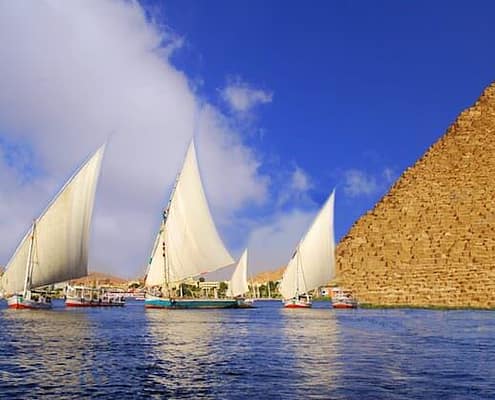
12-Day Cairo, Nile Cruise And Red Sea Stay
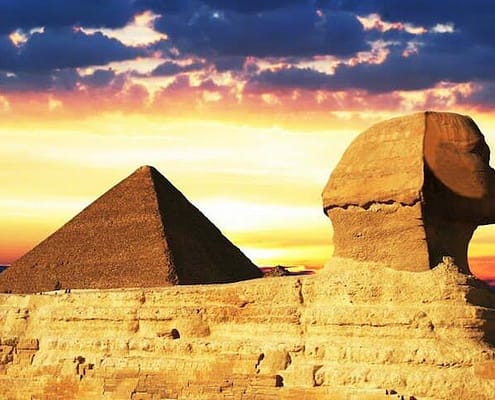
10-Day Luxury Nile Cruise and Cairo Tours
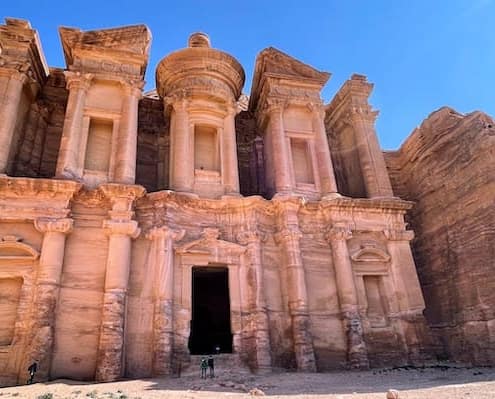
10-Day Egypt and Jordan Luxury Tours
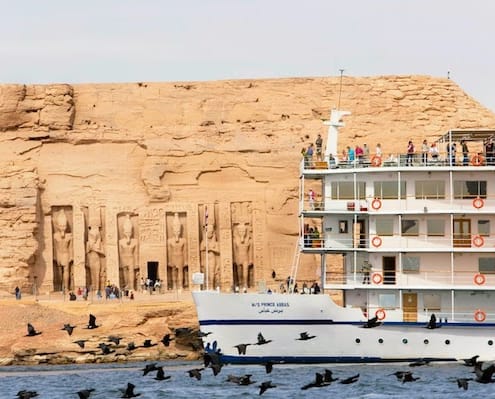
8-Day Cairo to Abu Simbel Tour w/ Nile Cruise
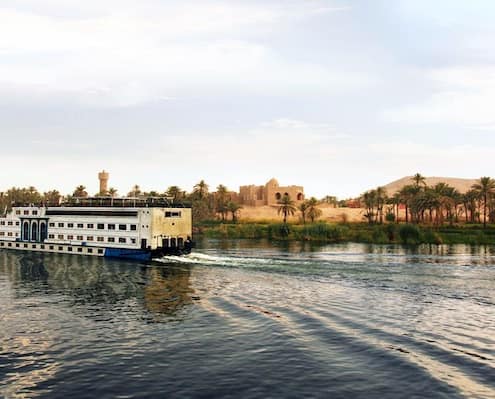
8-Day Egypt Holiday Tour – Cairo and Nile Cruise [By Train]
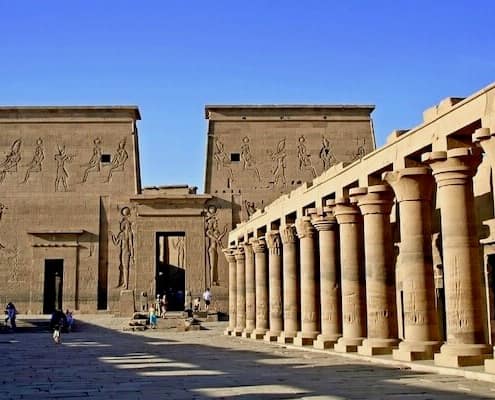
8-Day Best of Egypt Tour – Cairo and Nile Cruise [By Air]
Egypt travel information.
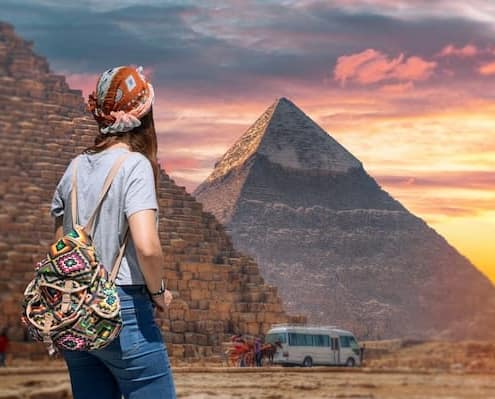
Full Safety Guide: Is It Safe to Travel to Egypt?

What are the Must Visit Places in Egypt?
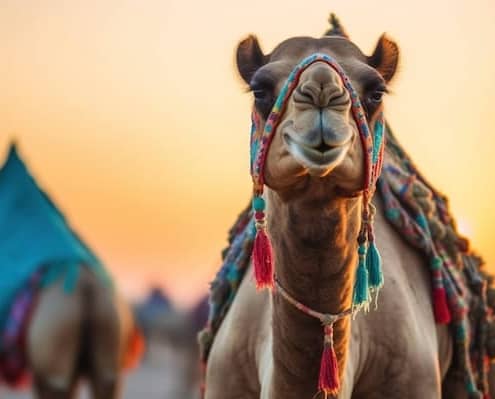
Egypt Travel Tips: This You Need to Know
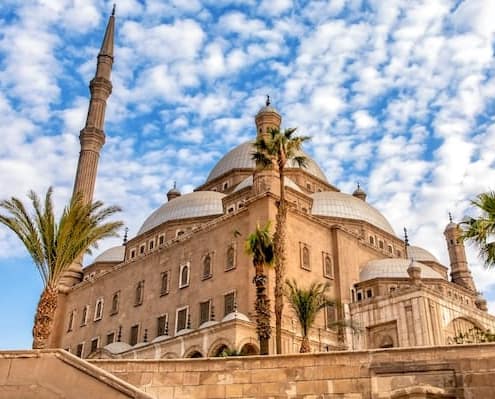
How to Plan a Trip to Egypt – Start Here!
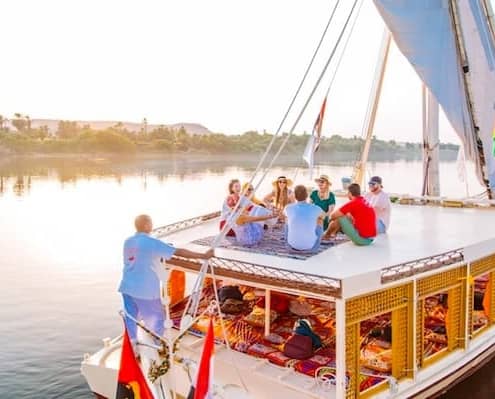
Best Time to Visit Egypt and When to Book!
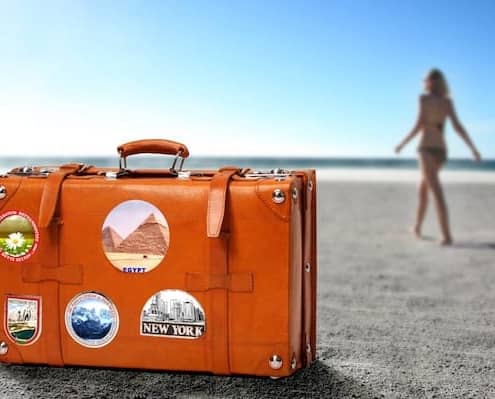
What to Pack for Egypt (Simple Packing List)
Last Updated on March 25, 2024
You might also like
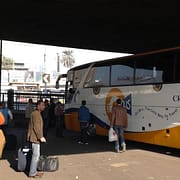
We Don't Just Sell Amazing Tours, We Make Dreams Come True!
Private tours since 1955.

Award-Winning Service
Create your dream trip.
Design Your Custom Tour

Gay Sharm El Sheikh, Egypt | The Essential LGBT Travel Guide!
Posted on Last updated: December 1, 2023
Categories Gay Destinations , Africa , Egypt
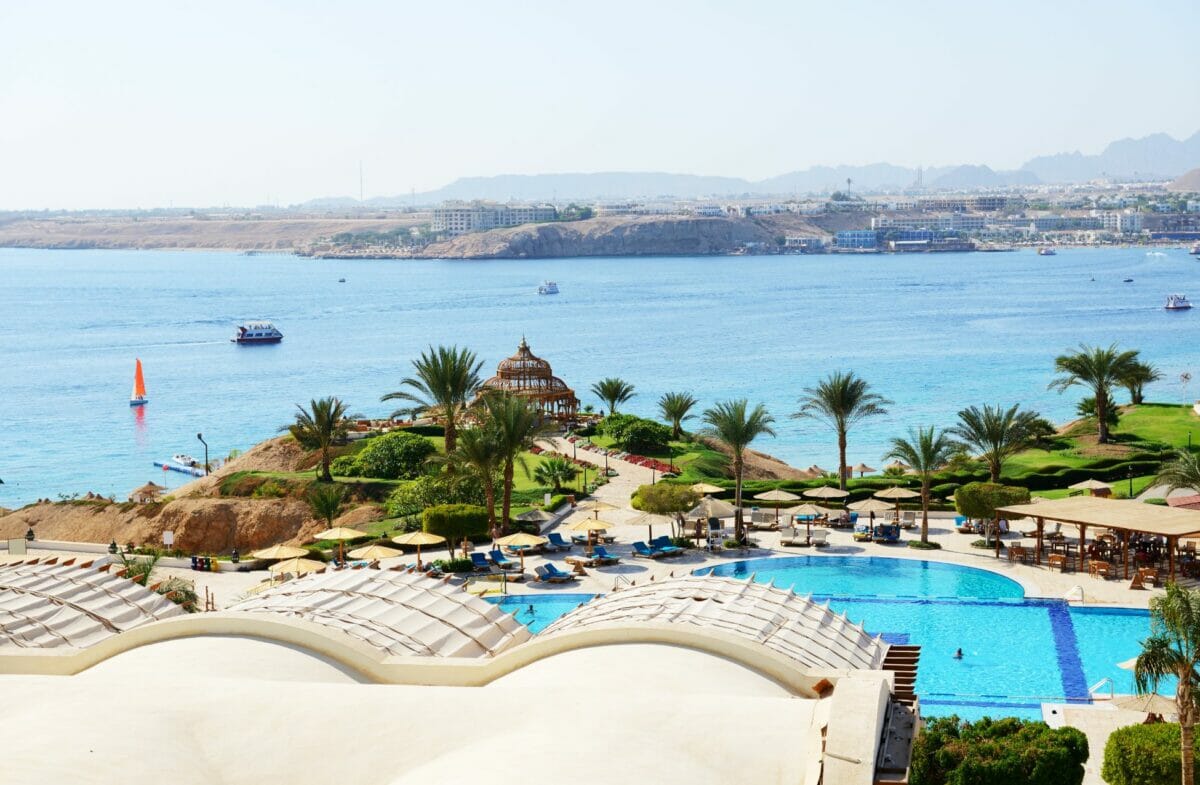
Queer travel expert Jack Kenworthy turns 250+ city adventures into your guide for safe, vibrant, and inclusively fabulous global journeys.
Feast your senses, darling, on the captivating vista of Gay Sharm El-Sheikh, Egypt’s glimmering jewel of the desert. Situated as a diamond encrusted in the arid golden terrain of Sinai Peninsula, the city basks between the luscious Red Sea and the desolate desert.
Though it rests in the heart of a country known for its conservative stance, this radiant city does a saucy little shimmy, donning a slightly more accepting attitude. But remember, my loves, always dance with discretion.
Caressed by the azure waves of the Red Sea, Sharm El-Sheikh and its sister city, Naama Bay, lay claim to being Egypt’s most tantalizing beach destinations. Sharm El-Sheikh twirls a vibrant feather boa of sandy beaches, coral reefs, and crystal-clear waters, earning her the seductive moniker, Sinai’s “Imaginary Paradise.”
Over the years, this alluring city has blossomed under the spotlight, celebrated for its pulsating nightlife and inviting year-round atmosphere. It’s become the toast of Egypt , an increasingly beloved belle of the beachside promenade.
Nestled within this vibrant panorama, Ras Muhammad National Park sparkles like an emerald. With its pristine white sands and serene seas, the park hosts a precious collection of unique species from across the globe. This natural sanctuary is a must-see for any international visitor drawn to Egypt’s unique blend of desert and sea.
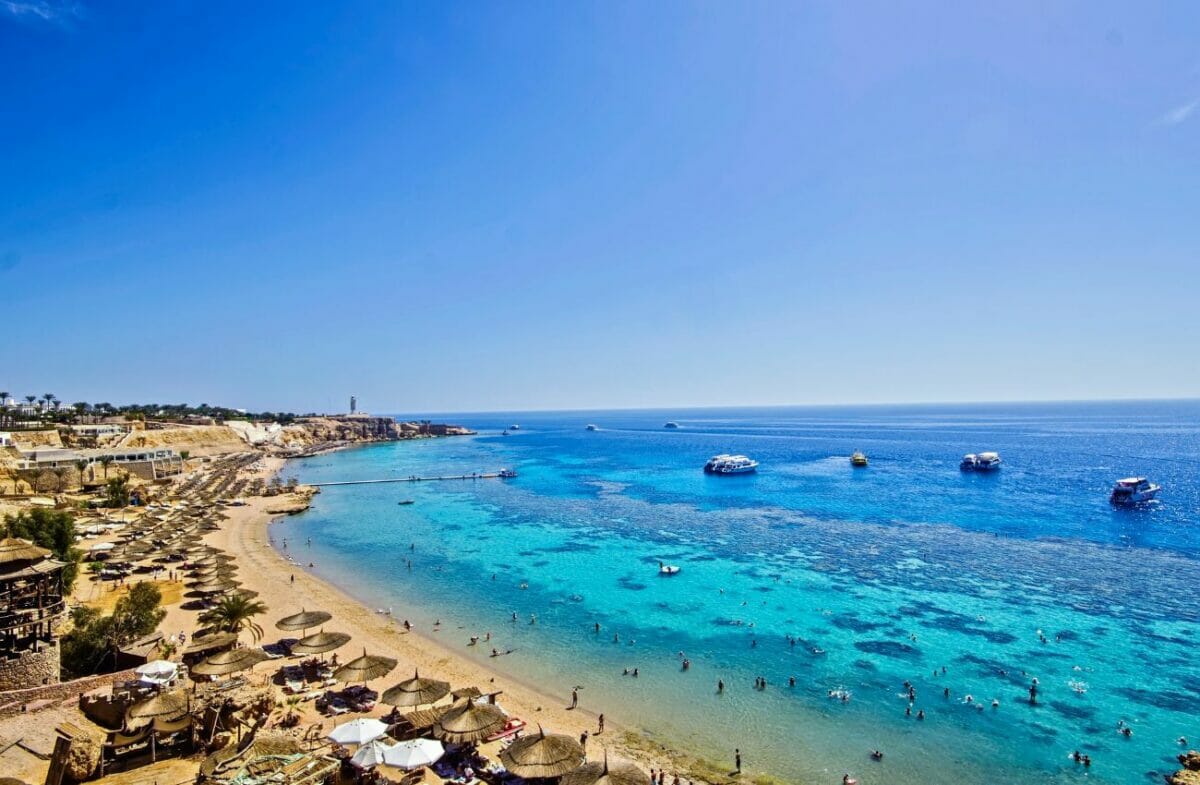
But here’s where we strike a somber note, my fabulous friends. While Egypt doesn’t explicitly outlaw homosexuality, the country’s legal system has a way of spinning its punitive web around unsuspecting gay couples. For our queer comrades venturing into these mesmerizing terrains, a word of caution is essential. Expressions of affection in public are as scarce as a raindrop in the desert, a rule not exclusive to Egypt but commonplace in many nations, even beyond the realm of Islam.
Returning to the glimmer of Gay Sharm El-Sheikh, the city is a coveted siren for scuba diving enthusiasts worldwide. Yet, if your desire is to simply bask in the sun-kissed beaches, this is one of Egypt’s finest spots.
For those less keen on plunging into the deep blue, the Sinai Peninsula’s magnificent natural and historical landmarks lie within a day’s journey. And let’s not forget Sharm el Sheikh’s recognition in the travel world, a testament to its splendid weather and breathtaking landscape, drawing travelers from every corner of the globe.
So, as you navigate this tantalizing terrain, remember to wear your fabulous colors with caution, keep your wits about you, and savor the stunning beauty of Gay Sharm El-Sheikh. But darling, please be safe!
While homosexuality is not illegal in Egypt at the moment, gay couples are exposed to persecution under the country’s current legal framework. Travelers who identify as LGBT should use caution when in Egypt. It is uncommon for Egyptians to express their affection for one another in public, so don’t expect to see it. This is the case not just in Egypt but also in many other countries, some of which are not even Muslim countries.
Sharm el-Sheikh, the main tourist center in Sinai, is one of the most popular sites in the world to go scuba diving. On the other hand, if all you want to do is kick back and relax on the beach, this is one of Egypt’s best spots.
Non-divers will have little problem finding things to do on land in Sharm since many of the Sinai Peninsula’s natural and historical landmarks are within a day’s drive of the city. Sharm el Sheikh has gained much recognition in the travel and tourist industry due to its nice weather and magnificent landscape, which attract travelers worldwide.
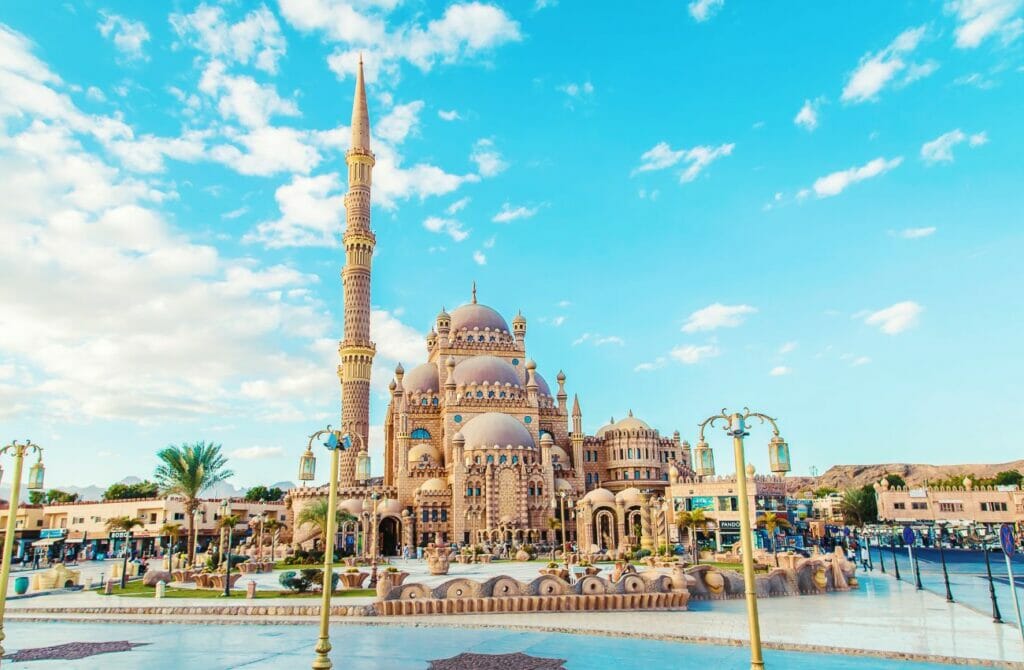
In this article we will cover...
Attractions in Sharm El Sheikh, Egypt
Gay-friendly and gay hotels in sharm el sheikh, egypt, gay-friendly bars and clubs in sharm el sheikh, egypt, gay-friendly cocktail bars and clubs in sharm el sheikh, egypt, gay-friendly rooftop bars and clubs in sharm el sheikh, egypt, lgbt rights in sharm el sheikh, gay map of sharm el sheikh.
Honey, welcome to Gay Sharm El Sheikh! Now, let’s spill the tea – this city may not be the most welcoming to our rainbow community, but don’t let that dim your sparkle! There are still plenty of fabulous things to see and do here, no matter who you love.
As passionate travelers and members of the LGBTQ+ community, we believe that queer travel is not only about having fun and exploring new places but also about promoting cultural understanding and spreading pride.
Through the journey, we can learn about different cultures, histories, and perspectives and share our experiences and identities with others. We can also support LGBTQ+ businesses and organizations and work together to create a safer and more accepting world for all members of our rainbow family.
Unfortunately, homophobia and discrimination still exist in many parts of the world, and it is important to be mindful of the laws, customs, and attitudes of the places we visit. But by being visible and proud and by supporting local LGBTQ+ communities and allies, we can help to change hearts and minds and make a positive impact wherever we go.
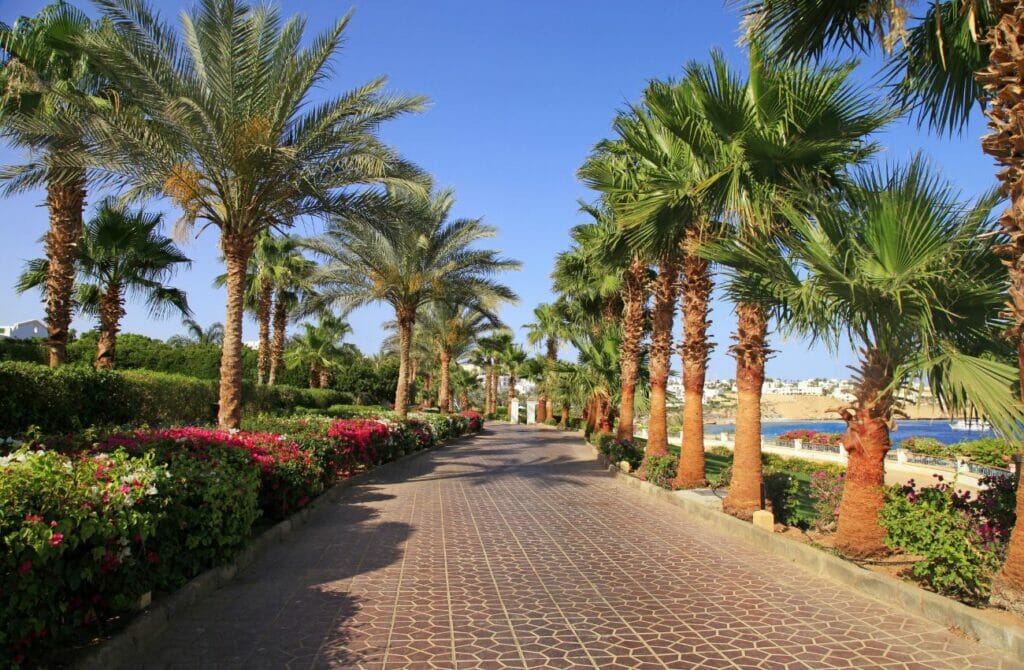
So let’s keep exploring, learning, and sharing, and continue to work towards a future where all travelers can feel safe and celebrated, no matter where they are in the world.
Check out the iconic landmarks and attractions, darling. Visit those historical monuments, museums, and art galleries like the true cultural connoisseur you are. And, of course, let’s not forget about the architecture, parks, and gardens. Trust us, the local cuisine will leave you gagging, and the markets are to die for. And, girl, let’s not even start on the cultural events like festivals, concerts, and shows – they are simply sickening!
Now, while we are out and proud queens, we must keep it on the down-low when we hit the streets, sis. Sadly, this city may not be as welcoming to us as we’d like. But no worries, we’ll just have to slay discreetly, okay? Let’s show these locals how to live our best lives, honey!
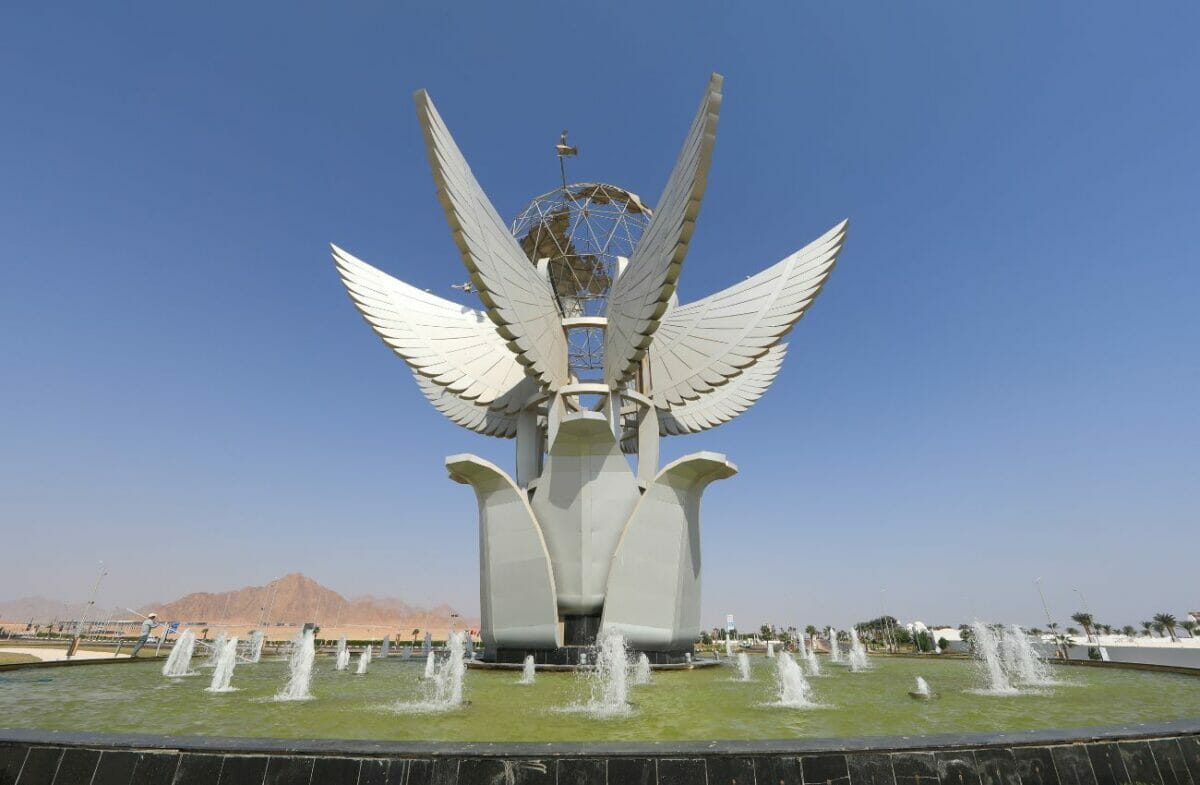
Ras Mohammed National Park
Ras Mohammed National Park is a major reason for Sharm el Sheikh’s popularity as a tourist destination. This peninsula is bordered by some of the world’s most excellent diving sites. It also has spectacular beaches with good diving and snorkeling right off the coast, the world’s second most northerly mangrove forest, and a saltwater lake. Old Quay Beach and Aqaba Beach are the best beaches.
Old Quay Beach is well-known for its magnificent coral reef, accessible from the shore. Aqaba Beach is famous for its pristine seas. Tourists who want to see the Red Sea should go to the cliff top of the Shark Observatory, situated on the southern edge of Ras Mohammed. Visitors may view both sides of the water from there.
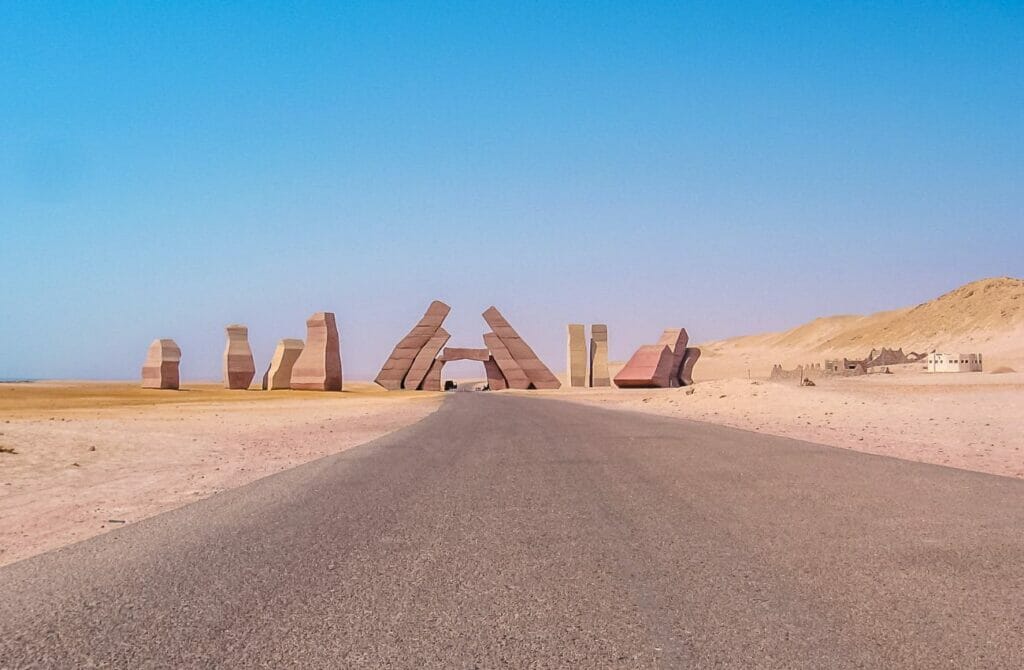
Sharm El Sheikh Museum
The museum’s display scenario portrays numerous aspects of human history and general culture, focusing on ancient Egyptian civilization. The strategy to attain this aim is meticulously selecting historical artifacts from the museum’s storage facilities.
The museum has around 5,200 artifacts spanning the history of Egyptian civilization, from ancient times to the present. This museum allows visitors to spend the morning enjoying the splendor of the city’s beaches, the afternoon participating in various fascinating water sports, and the evening learning about ancient Egyptian civilization.
Na’ama Bay
Most of the action occurs at the Sharm el Sheikh resort’s Naama Bay neighborhood. The pristine sand beach and flowing palm palms distinguish this place. Naama Bay is most known for its beach, but if you get tired of the sand, there are plenty of restaurants, cafés, and gift shops to explore for a change of pace.
It is a natural harbor on the Sinai peninsula, and in addition to diving, there are several snorkeling opportunities in this region.
This resort will not disappoint beach bums who want to soak up the sun and have a nice time; they don’t need to be activity addicts to have a good time here. Relax on the golden beaches flanked by palm trees, plunge in the crystal blue water, and have your credit card(s) ready for the busy bars, restaurants, and shopping off the promenade.
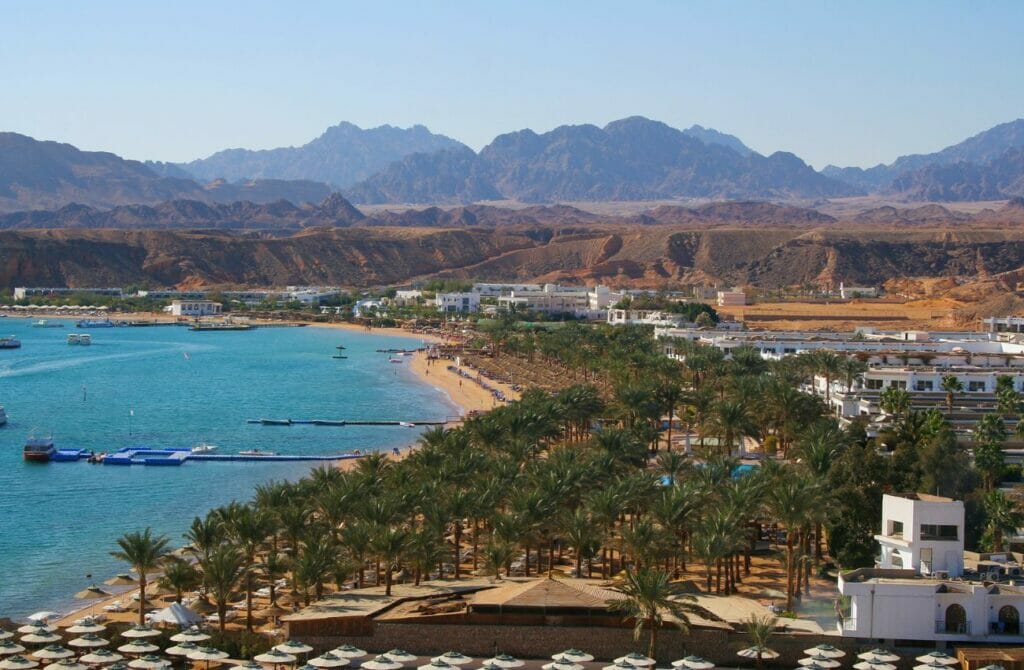
Sharm Old Market
Sharm Old Market, also known as Sharm al-Maya, is the town’s souq (bazaar) filled with shining Arabic lanterns, old shisha pipes, and wonderfully carved woodwork. It is ideal for arranging your trip around sunset or later in the evening when the hottest part of the day has passed, and the people have scattered, so you may shop and look about without interruption.
Evenings may be spent greatly in the neighborhood due to the variety of exciting and reasonably priced restaurants and cafés. Although most restaurants in Sharm El Sheikh’s resort districts offer food from other nations, this neighborhood is one of the best spots in the city to obtain real Egyptian cuisine. This restaurant serves typical café fare, including shisha, Arabic coffee, and other drinks.
The Heavenly Cathedral Church
The Heavenly Cathedral is one of Sharm El Sheikh’s most important and well-known Coptic Orthodox churches. It is also one of the oldest churches in the city. Construction on this remarkable religious monument in the Hay el Noor neighborhood started around the turn of the twentieth century.
The architecture of this magnificent structure is embellished with golden arches, royal ceilings, and superb chandeliers. The intricate biblical paintings will affect you, and if you extend your neck far enough, you can see the Apocalypse of St. John the Apostle, an artwork hanging from the ceiling heights.
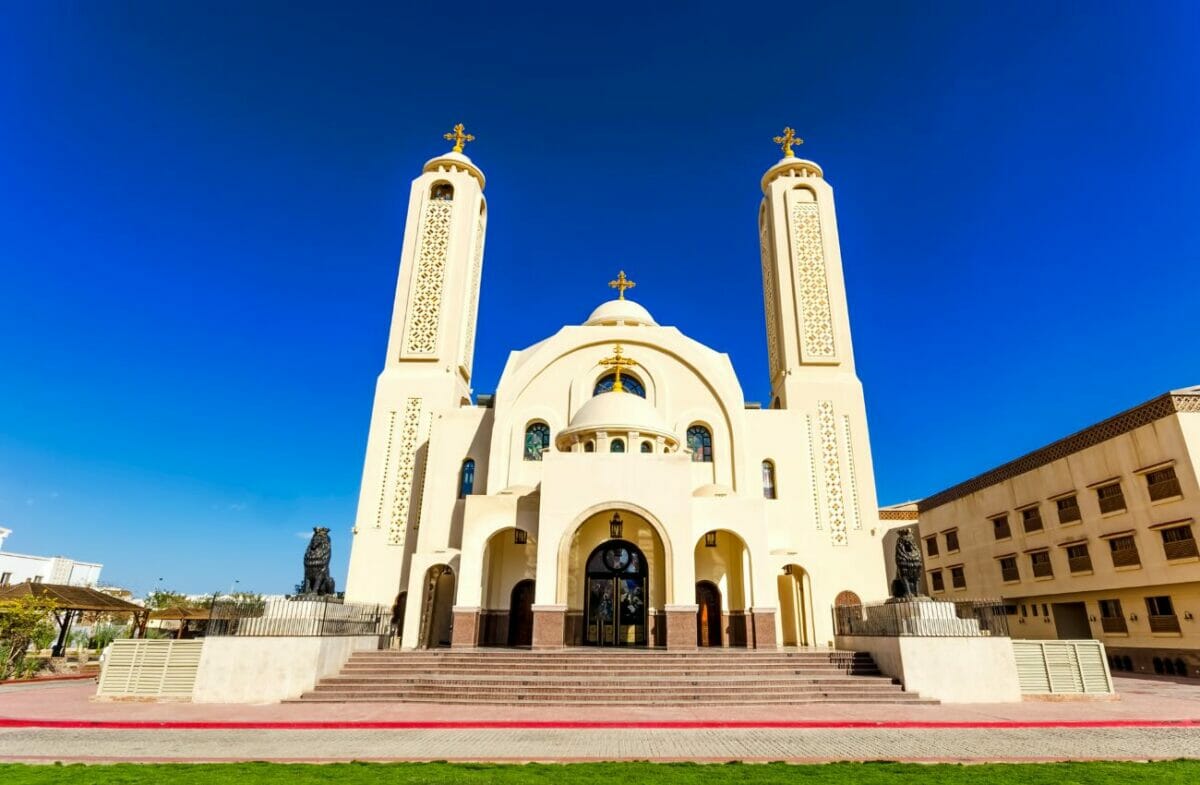
Because of the high winds and relatively calm sea conditions, the Red Sea is a good spot to learn how to windsurf. Apart from being a prominent scuba diving destination, Sharm el Sheikh’s position on the Red Sea makes it a perfect site to learn how to windsurf.
The most convenient location is Nabq Bay, located at the resort’s northernmost point and home to various enterprises that give training and equipment. The vast, shallow, and fully flat-water lagoon, shielded from the open sea by a natural reef, is ideal for beginners. As your confidence and speed grow, you should go farther from the reef to test how well you can handle smaller waves.
Al Mustafa Mosque
The Al Mustafa Mosque is perhaps the most stunning structure in Sharm El Sheikh. In fact, at first glance, you may mistake it for a beautiful castle rather than a mosque. The structure’s design, a combination of Ottoman and Mamluk architecture, was created by Egyptian architect Fouad Tawfik Hafez.
It was finished in 2008 at an estimated cost of 31 million pounds and can hold roughly three thousand people during worship sessions. The massive structure is embellished with two sparkling domes and 76-meter-high minarets. The inside of the mosque is equally as impressive as the outside. The mosque is a sight fit for the gods when illuminated at night.
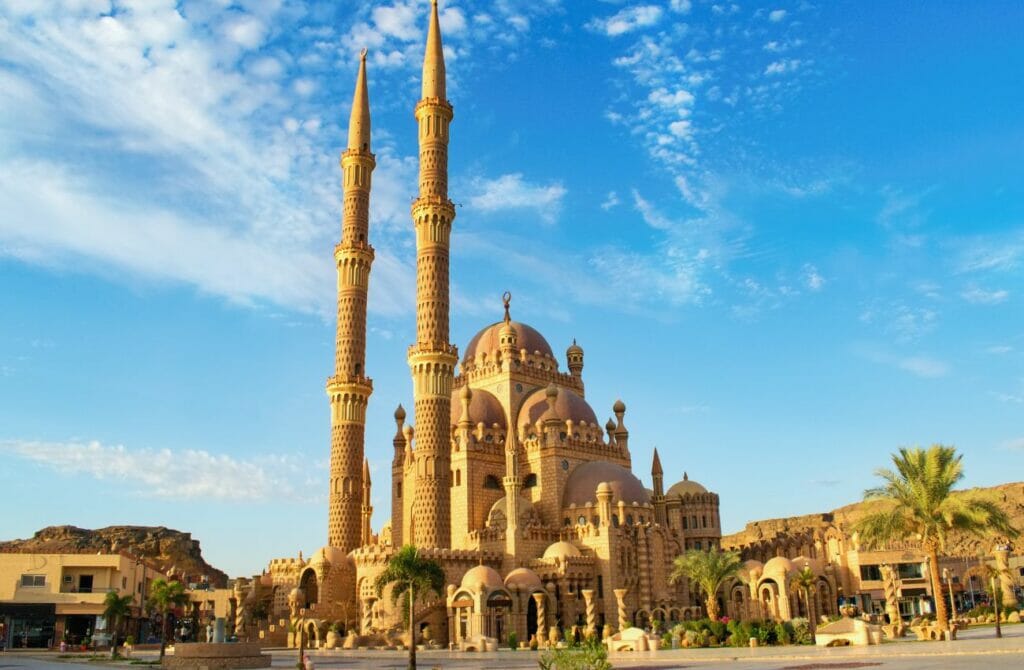
Prepare to be swept off your feet as we delve into the world of Sharm El Sheikh’s subtly hospitable abodes, teetering on the edge of fabulous while maintaining a dignified discretion. These hotels, although not openly declared, have the reputation of being welcoming spaces for the LGBT community.
While many establishments may not publicly embrace the rainbow flag, these distinguished accommodations have demonstrated an unspoken yet profound commitment to the spirit of queer acceptance. It’s as if they whisper, “We see you. We welcome you,” without ever uttering a word.
Even in the sanctity of these havens, the undercurrent of Egypt’s conservative society must be considered. Discretion remains the unsung anthem here, an oft-ignored melody that sings of respect for the culture and norms of this historical land.
Encompassing a wide spectrum, these hotels range from local, subtly gay-friendly establishments to international chains that carry the legacy of their parent brands’ inclusive policies. The latter, often seen as more familiar faces in an unfamiliar landscape, strive to create an environment of warmth, respect, and safety, albeit in a subdued manner.
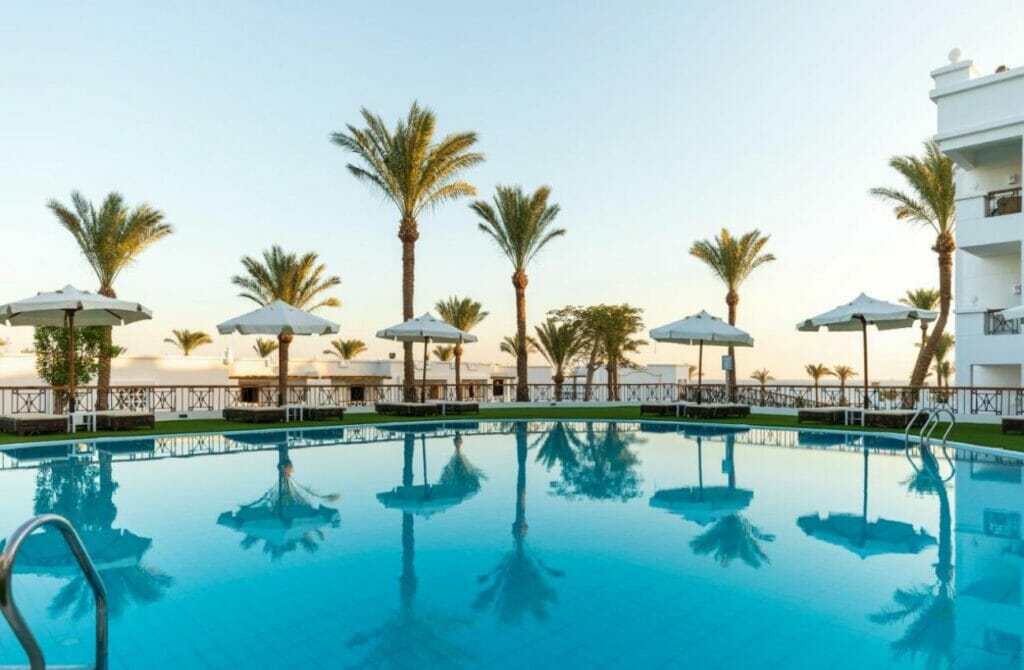
These accommodations, known for their high-quality amenities and services, aim to provide a comfortable stay for all travelers, including those identifying as LGBT. Yet, even within their walls, it is advisable for guests to navigate with an air of caution and subtlety, paying heed to the cultural nuances that permeate Egyptian society.
Whether the traveler’s choice leans towards the locally influenced retreats or the familiarity and luxury of the international hotel chains, research and careful selection are paramount. One should seek an establishment that offers comfort and a feeling of welcome while also promoting respect for local customs.
So, why hesitate? There’s a subtle, unspoken invitation extended to all those willing to experience the whispered luxuries these subtly queer-friendly hotels in Sharm El Sheikh offer. Yet remember, even amidst the comfort of these accepting sanctuaries, the song of discretion must never be forgotten.
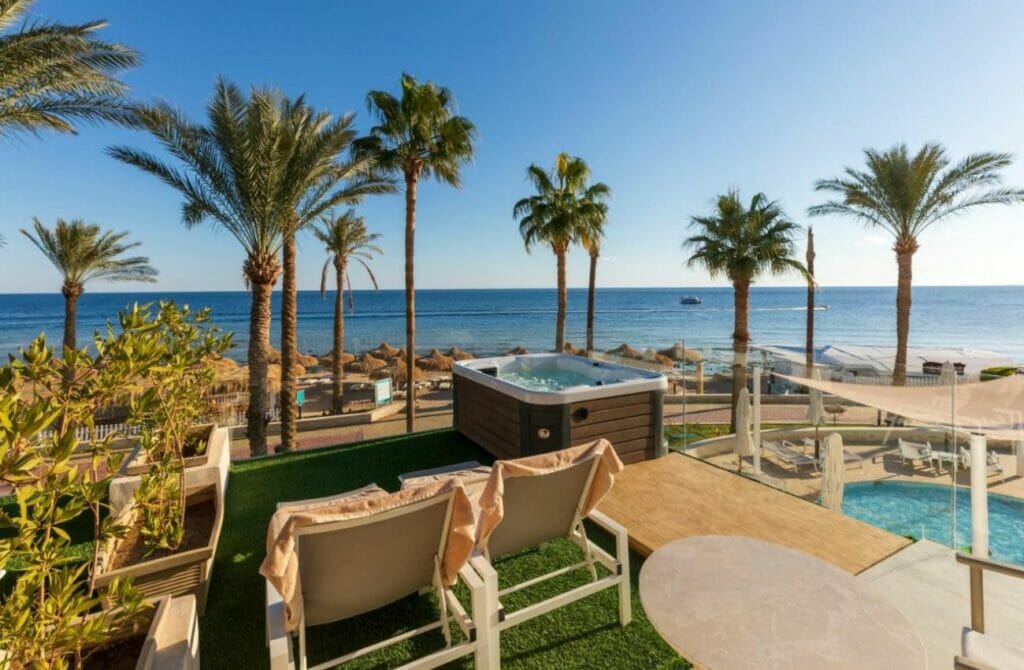
Sunrise Remal Beach Resort ☆☆☆☆☆
The Sunrise Remal Beach Resort is situated in Ras Nasrani, well-known for scuba diving and other water sports owing to a healthy coral reef and great scuba diving possibilities. Guests can relax in spacious, well-decorated rooms and private balconies. They may stroll out onto these balconies and enjoy the beautiful views of the natural surroundings.
At the Sunrise Remal Beach Resort, you can choose five pools where you may cool down. You may also relax on the beach while admiring the stunning beauty of the Red Sea and Tiran Island. If you have a lot of energy, you may participate in beach volleyball competitions or visit the international diving center at Sunrise Remal Beach Resort.
When you’ve worked up an appetite, go to the restaurant to feast on the delectable Mediterranean and international cuisine. Meet new friends and reconnect with old ones while sipping a refreshing beverage at one of the three pool bars or the well-known beach bar at the Sunrise Remal Beach Resort. This beachfront resort checks so many boxes in terms of attractive qualities.
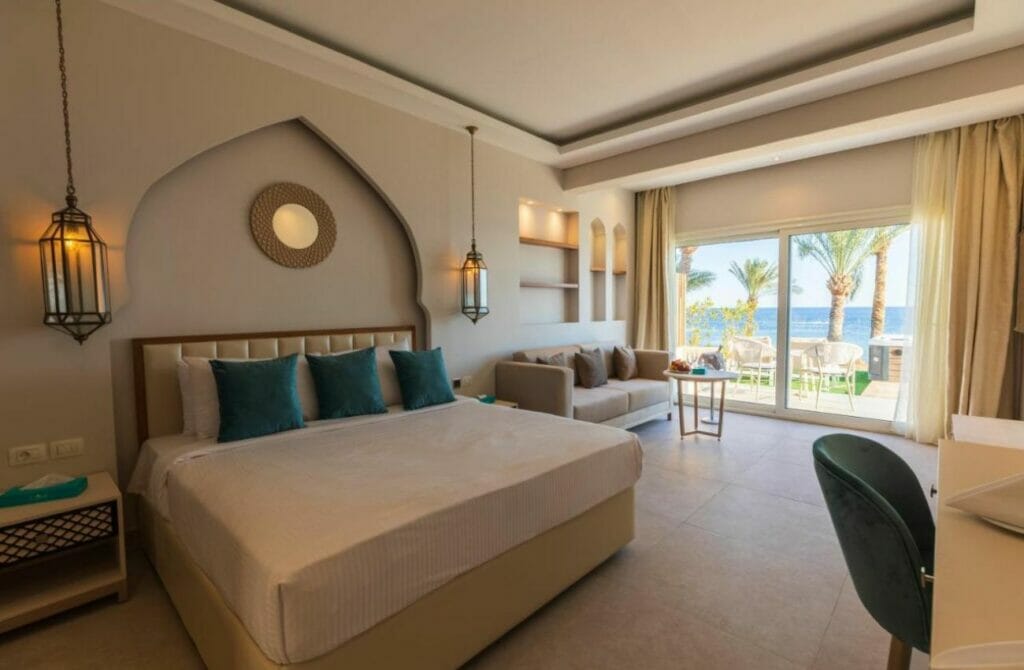
Four Seasons Resort Sharm El Sheikh ☆☆☆☆☆
The Four Seasons Resort in Sharm el Sheikh is an elegant oasis between the desert and the reef with year-round sunshine, sleek and modern hotels, and spectacular Red Sea views.
The resort has five outdoor pools, ten outdoor dining options, a highly recognized spa, a PADI diving center, one of the greatest house reefs in the region, and a funicular that takes guests from the top to the beach. Moreover, the resort is home to one of the greatest spas in the area.
You may stay in one of the resort’s big guest rooms or gigantic suites, which range from one to four bedrooms and are decorated in either a modern or traditional Arabian style. Each property has its balcony or patio, and some include a private pool and a kitchen or kitchenette.
These rooms are ideal for couples, families, and other small groups. Each room offers a peaceful sitting area with a flat-screen TV, the famed Four Seasons bed, and other amenities to guarantee a pleasant stay. You can look forward to a comfortable night’s sleep on the luxurious beds supplied in the particularly spacious rooms.
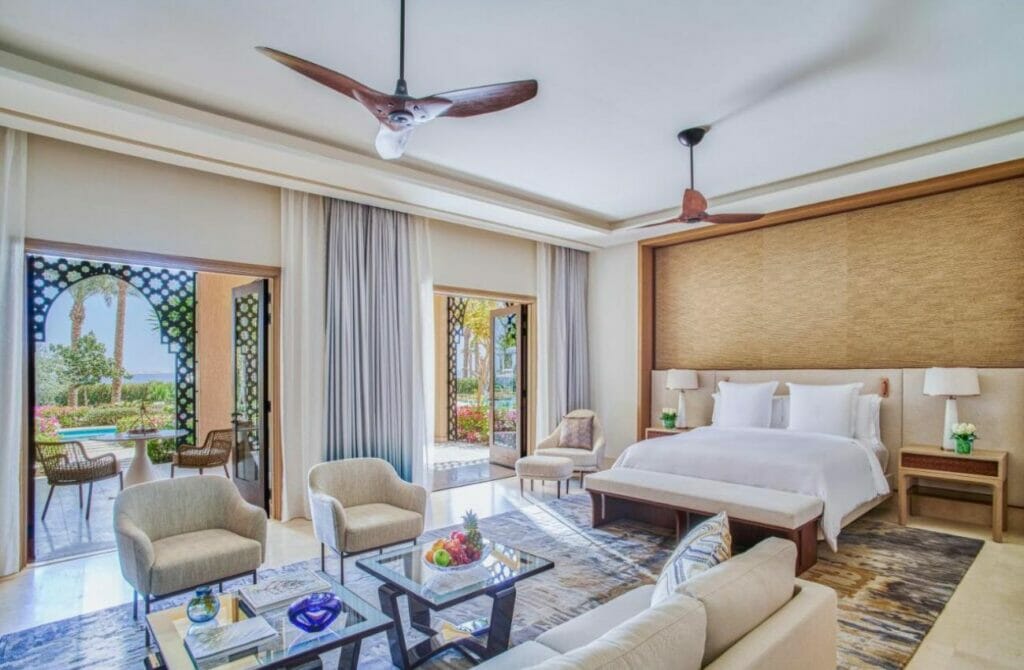
Serenity Lodge ☆☆☆☆☆
The Serenity Lodge is another fantastic option for those seeking a place to stay in the city. Anyone looking for an affordable and comfortable place to stay without breaking the bank will find it an excellent choice. You may start your day in this wonderful hostel with a typical Egyptian breakfast buffet while watching the sun rise over Tiran Island.
Tiran Island is home to the hostel. Spend the morning exploring the red sea’s shoreline, where you’ll find a profusion of colorful corals and fish of all shapes and sizes running down the edge of the perfect reef. Following that, you may dry off on the picture-perfect sand beach or while relaxing by the private pool with a sea view.
When the sun sets behind the mountains, the sky fills with blazing light, welcoming in the night and displaying a stunning show of sparkling stars shimmering in the darkness. After that, strike up a friendly chat with a staff member or another tourist.
Just before retiring to your room with an attached bathroom and a stunning view of the Red Sea. The suites have a variety of additional useful amenities that work together to give visitors the sensation that they are on top of the world. When staying at this hostel, you can engage in various exciting activities and excursions suited for thrill seekers and chillers.
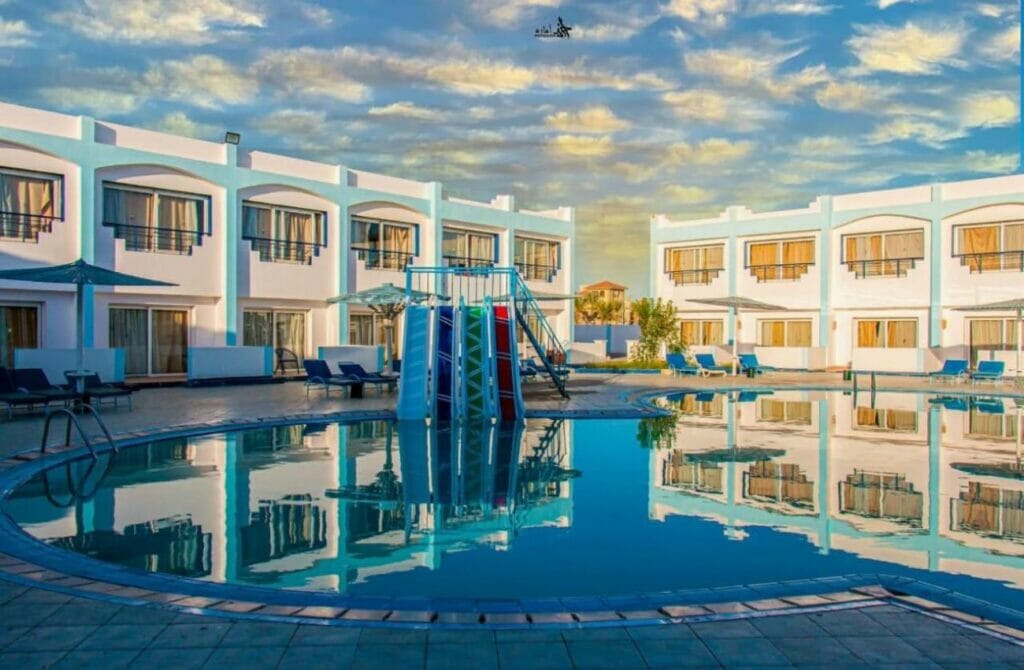
Gay Nightlife in Sharm El Sheikh, Egypt
Sharm el Sheikh is recognized for its year-round sunny climate, which makes it synonymous with sunbathing, tanning, and visiting lovely beaches. Yet, this city offers a thriving nightlife, with discotheques, clubs, and casinos until early morning.
Sharm el Sheikh is well-known for its active nightlife, including nightly entertainment, casinos, and social events. Most of the area’s nightclubs, casinos, bars, and restaurants are located on Naama Bay and the surrounding districts.
Exploring the queer nightlife scene in a new city can be one of the most exhilarating experiences while traveling, and Gay El Sheikh is certainly no exception. Not only do you have the chance to meet new people and make friends, but you’ll also immerse yourself in the local culture and learn more about the LGBTQ+ community.
Whether you prefer to connect with other queer folks in person at a gay bar or club or through a hook up app , Gay El Sheikh has plenty of options for you to explore. However, it’s important to keep in mind that many of the public spaces in the city are not queer-friendly, and it’s best to avoid displaying overt signs of queerness in certain areas due to the risk of discrimination or even violence.
So, go ahead and venture out to experience the vibrant and diverse queer nightlife in Gay El Sheikh, but always prioritize your safety and well-being. Take precautions when meeting new people, and be mindful of your surroundings. With a bit of caution and a lot of fun, you will surely have an unforgettable time in this amazing city.
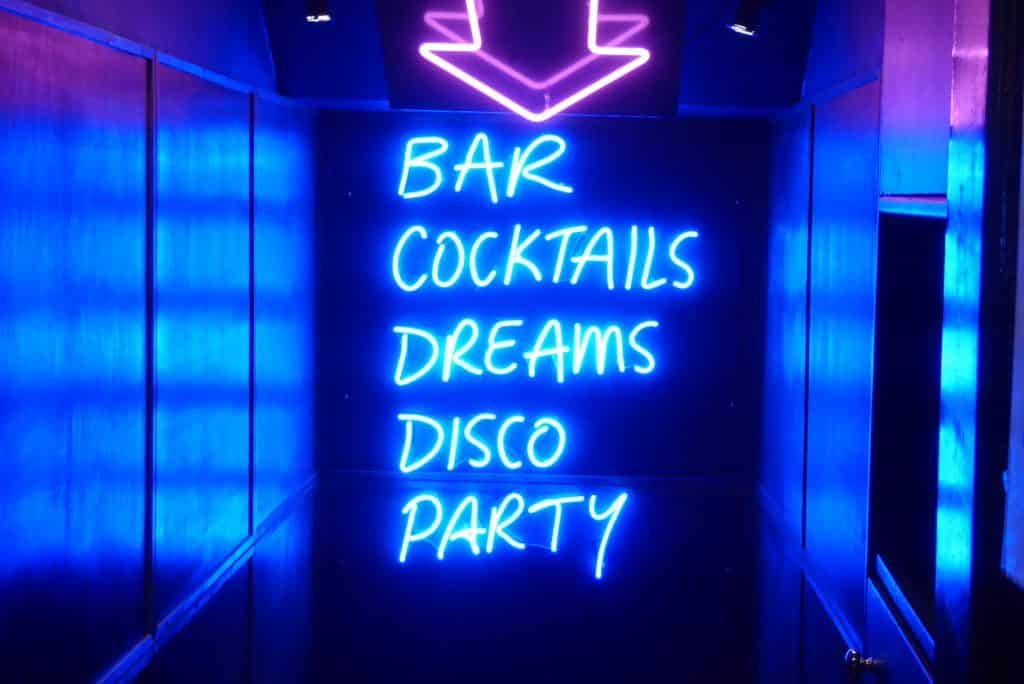
Pataya Beach Club
Pataya is a massive multi-purpose beach club in Sharm El Sheikh’s Nabq Bay neighborhood. It has a pool, an outdoor beach club, a restaurant, and a nightclub. Because of its fantastic live music and entertainment, which includes dancers, drummers, DJs, and other artists, this nightclub is known for throwing some of the most exciting parties in Sharm el Sheikh. Around eleven o’clock at night, the festivities begin.
Pacha Sharm El-Sheikh
The Pacha Pacha nightclub in Sharm el Sheikh is the epicenter of the thriving nightlife scene in Sharm el Sheikh. It is the largest and most well-known nightclub in both the city and Egypt. This club is open every night and is situated in the heart of Naama Bay. It features the typical ambiance of Pasha nightclubs but with an added touch of oriental flare, and it hosts evenings with internationally recognized DJs.
Inside this club, which also has a swimming pool and several indoor and outdoor lounge areas, you can hear House, Deep House, Trance, and Urban music. Sunday is dedicated to R&B and Hip Hop music, while Saturday is dedicated to electronic dance music, tech house, and progressive trance music.
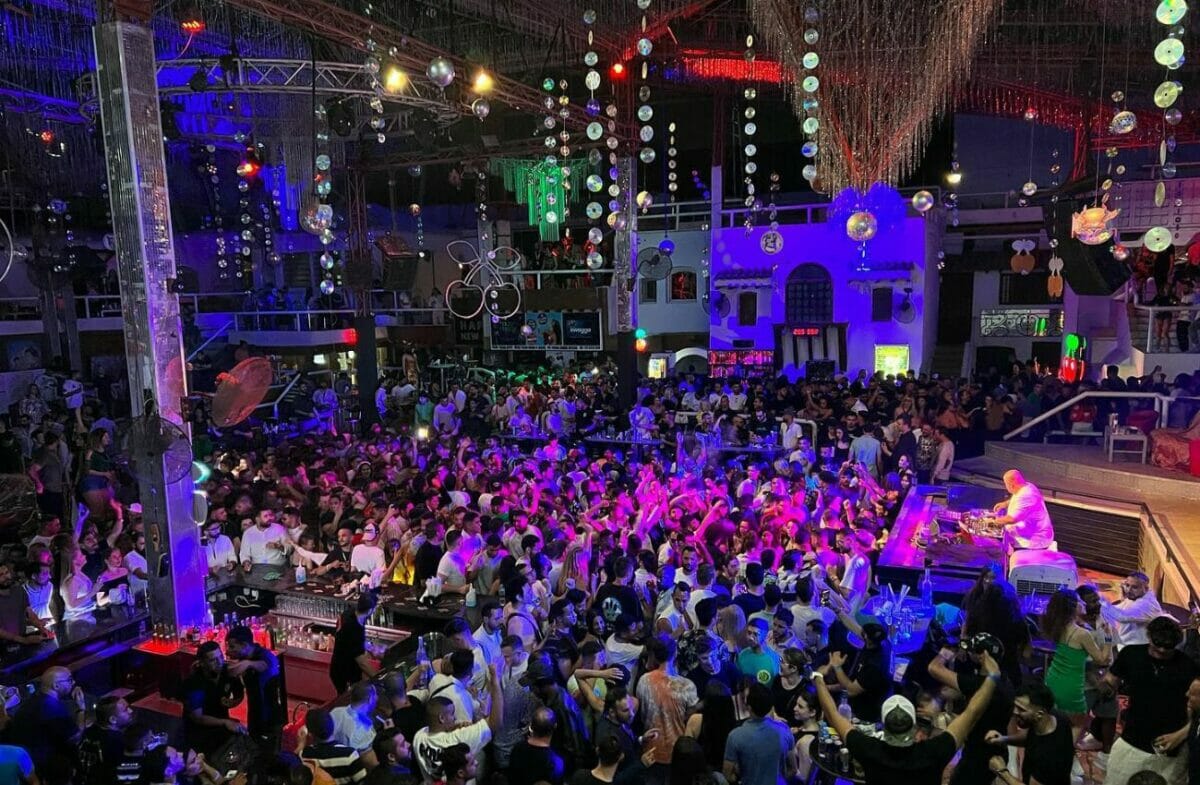
La Dolce Vita
Dolce Vita is, without a doubt, Sharm el Sheikh’s most provocative nightclub, and its location amid the desert further adds to its allure. This club, which is so vast that it is also known as “the Castle,” is open year-round and features nights featuring sets by DJs worldwide. The nightclub is located nearly entirely outside and is tucked along the side of a mountain.
It stands out for its stylish and cutting-edge architecture, which features a large swimming pool in the club’s center. The main Sharm el Sheikh resorts are accessible from La Dolce Vita owing to the hotel’s excellent shuttle service. Make sure you don’t miss their insane foam parties!
Taj Mahal
The Taj Mahal is a gigantic open-air disco with two floors in the center of Ram Um El Sid, only a few minutes via taxi from Naama Bay. If you wish to join, bring your swimming suit to the celebration, which will be held close to the pool. Moreover, a new foreign DJ takes turns behind the decks each week.
Hard Rock Cafe
The Hard Rock Café is a world-famous rock-style restaurant and disco bar on Naama Bay’s main promenade. It is readily identified by the massive guitar that rests on the building’s roof.
In addition to the normal collection of rock’n’roll artifacts exhibited within the pub, the restaurant and bar provide American atmospheres and cuisine. In the evening, the bar transforms into a true nightclub, offering a range of musical acts and exciting weekend parties. Male entry is 15 euros, which includes refreshments.
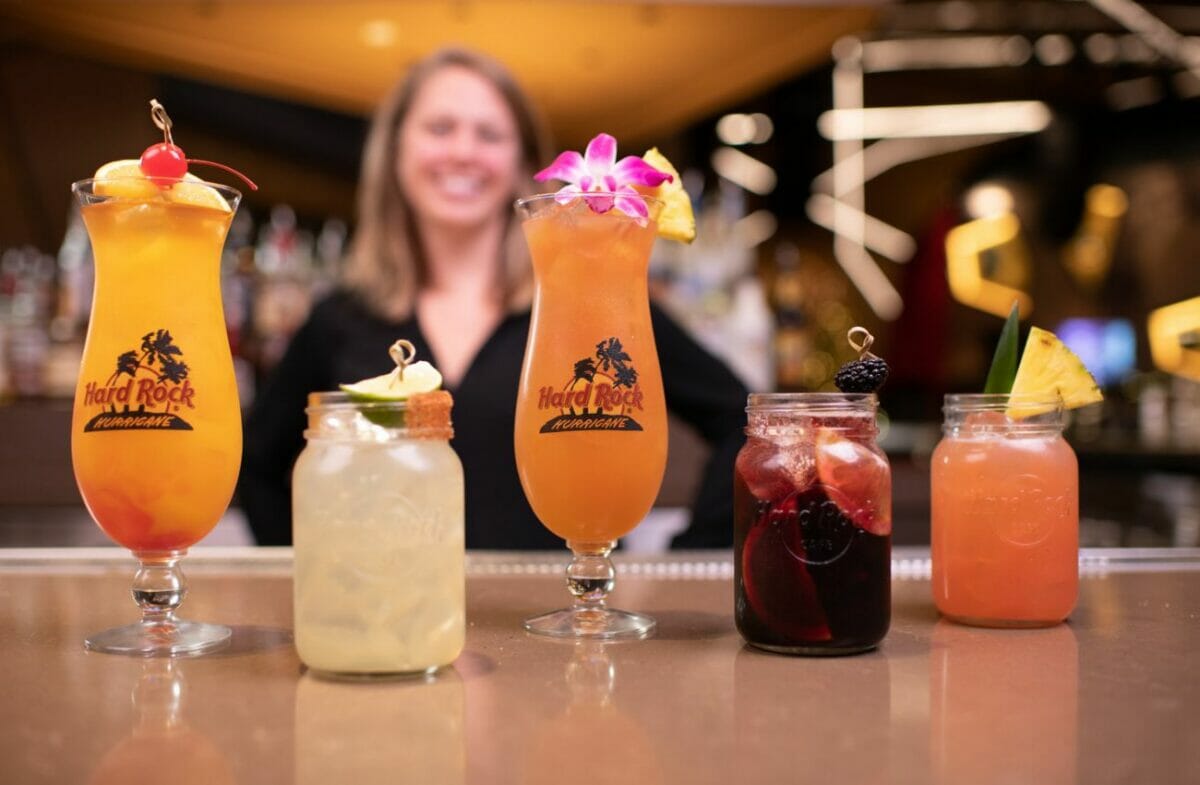
El Fanar Beach and Restaurant
El Fanar Beach and Restaurant El Fanar is another well-known Sharm el Sheikh nightclub in the Ras Um el Sid neighborhood. The beautiful view may be appreciated from the club, located on the same-named beach. The ideal position for dancing till dawn and watching the sunrise.
Terrazzina Beach
Terrazzina Beach is a place for anybody who would rather enjoy a beach party that lasts all night than go to an indoor bar. Terrazzina Beach is a business located in Sharm el Maya’s stunning bay. You may dine, swim in a beautiful sea, and dance from sunrise to sunset here. The club holds many events and offers excellent service at its bar and restaurant, noted for its wonderful fish specialties.
Mandarin bar
After a hard day at the beach, unwind in the lounge bar. Visitors may relax, listen to music, see live music performances at special events, and meet new people while eating and smoking hookahs. Indian, Thai, and Chinese meals are served.

The Tavern Bar
The Tavern Pub, located near Naama Bay, is a traditional English pub that broadcasts important sporting events, mostly rugby matches. The establishment attracts many British guests and hosts evenings of entertainment and karaoke.
Ice Bar
The Ice Bar is the greatest spot to gain much-needed reprieve from Sharm el Sheikh’s oppressive heat. Like every other good Ice Bar, this venue is fully composed of ice, from the bar to the tables, seats, and even the glasses, and the temperature is kept at a constant minus 10 degrees Celsius.
Admission includes a couple of shots of vodka to get the celebration started. Ice sculptures cover the inside of the bar, adding to the establishment’s distinct and intriguing aura.
Queen Vic British Pub
This pub delivers a little of British to Egypt. The décor is designed to resemble an English pub, and the bar serves a wide range of wines, beers, and other beverages. You may also watch football events throughout tournaments and seasons and play pool or darts.
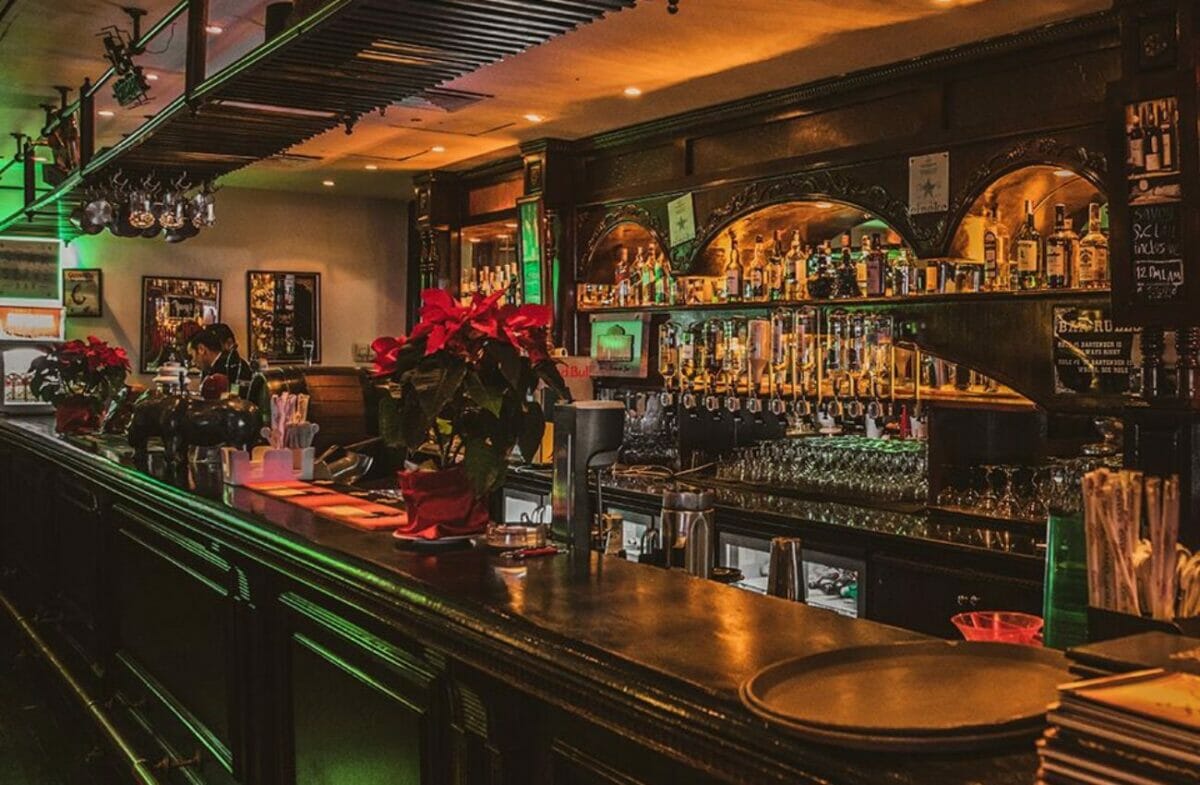
Bus Stop Naama Bay
The Bus Stop is a popular disco that plays R&B and Soul music. It takes the shape of a gigantic red bus. Happy hour is from 8:00 p.m. to 9:00 p.m., including two-for-one beers and half-priced drinks. If you don’t feel like dancing, you can use a pool table. The music will commence at 10 o’clock.
Farsha Café
This establishment is more than just a cafe; it is a masterpiece of eccentric design, complete with colorful floor cushions with striped patterns, Bedouin tents, and lighting that swings between red and yellow and shines at night. The view of the glistening ocean from the Farsha Cafe is so captivating that you won’t want to leave even after a few sips of your beverage.
Consequently, get yourself a cup of coffee, a few cocktails, and perhaps a shisha pipe. You should be able to go from enjoying a tranquil afternoon of lounging to going all out for a wild night of partying as the atmosphere changes and house vibes begin to pulse.
Little Buddha
Little Buddha, located in Naama Bay close to the Hard Rock Cafe, is considered one of the city’s most sumptuous places. It has flashy and futuristic décor inspired by Eastern culture and a massive golden Buddha statue. This unique institution combines a nightclub and a sushi bar.
There’s a restaurant, a lounge bar, an outdoor terrace, and a separate hookah smoking room. Little Buddha, a Sharm el Sheikh specialty restaurant, offers twenty distinct types of sushi and five types of sashimi.
Around 11:00 p.m., the venue changes into a club, organizing events with local DJs and attracting visitors and trendy young people who want to dance late into the night. The music encompasses various genres, from current electronic sounds to R&B rhythms. As you step through these doors, you’ll know you’re in a Buddha Bar because of the large drink menu and well-tuned music system.
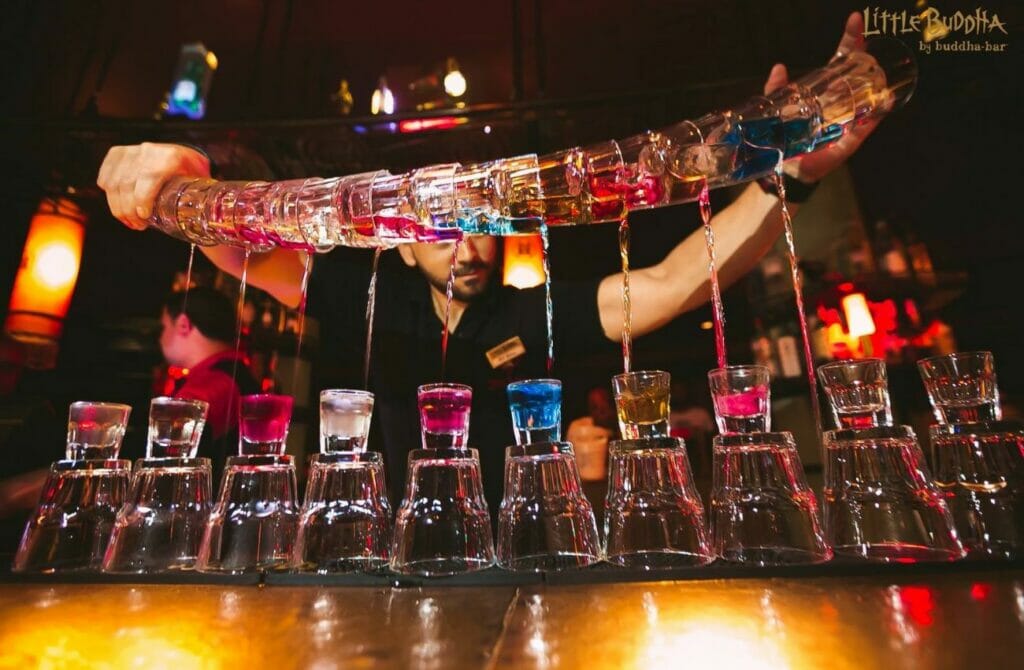
Panagea Club
The Panagea is a club in Soho Square that offers amazing music, DJs from all over the globe, and an incredible selection of beverages and cocktails. Because of the ample size of its dance floor, which features dynamically changing colors and lighting, this Sharm el Sheik club has emerged as a preferred location for socializing and dancing.
O Beach Club
Club Oasis del Mar O Beach, once known as the Cocco Beach Club, is now one of Sharm el Sheikh’s most popular nightclubs. It has excellent music, incredible entertainment with lovely cubistas, delectable drinks, and an unrivaled view of the Red Sea.
Caligula Hot Rock
Caligula is a prominent club in the Savoy Hotel in Sharm el Sheik. The club’s evenings include Hispanic, commercial, and funky music performances. Guests may enjoy a large selection of beverages, wines, exciting music, and attractive design while they are here.
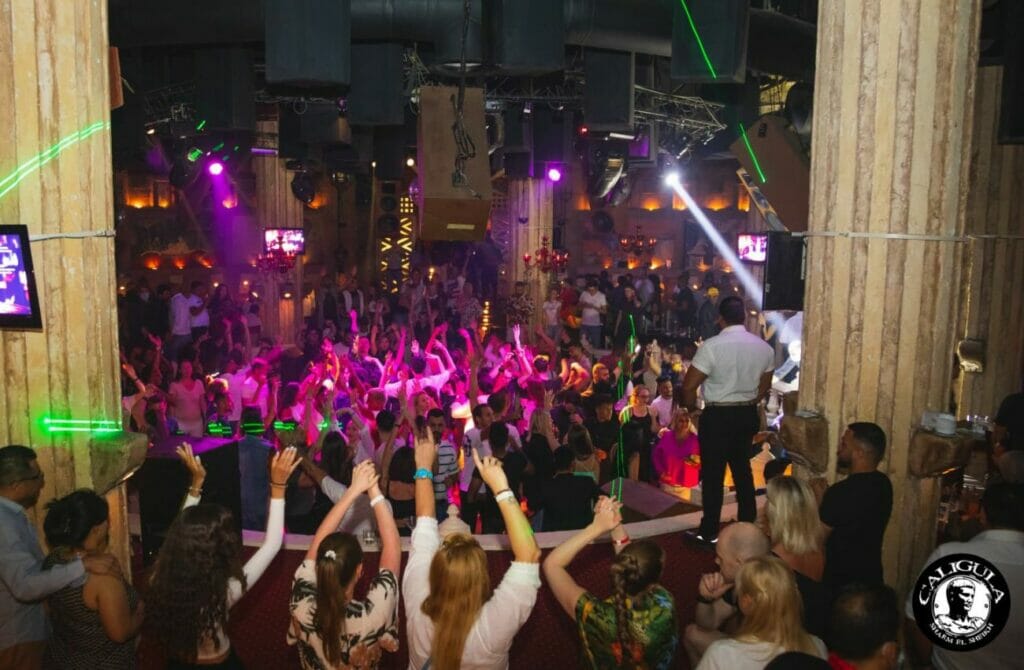
Camel Bar
The Camel Bar is one of Sharm el Sheikh’s most popular pubs, offering a range of entertainment alternatives such as sports events, live music, and nights with music types ranging from R&B to rock to dance music. Since this tavern draws residents and visitors, the crowd constantly varies.
A nice location to unwind with beverages, hookahs, and excellent appetizers. Visitors may watch the sunset on the rooftop patio or enjoy the panoramic views from the terrace below.
Space Sharm
This sprawling club is located north of Naama Bay. It is divided into three huge areas: the main room, which includes a swimming pool with a waterfall, a terrace with views of the sea, and a lounge room dominated by an aura of sheer luxury. Since it initially welcomed disco fans in 2010, The Space has grown to become one of Sharm el Sheikh’s most popular nighttime entertainment locations.
Expect to be wowed by the soundtrack, the thrilling laser displays, and the always-changing event calendar. There will undoubtedly be a party that suits your tastes, whether you enjoy R&B, hip-hop, or techno music. While the admittance fee may seem high at first look, it includes not one but two beverages.
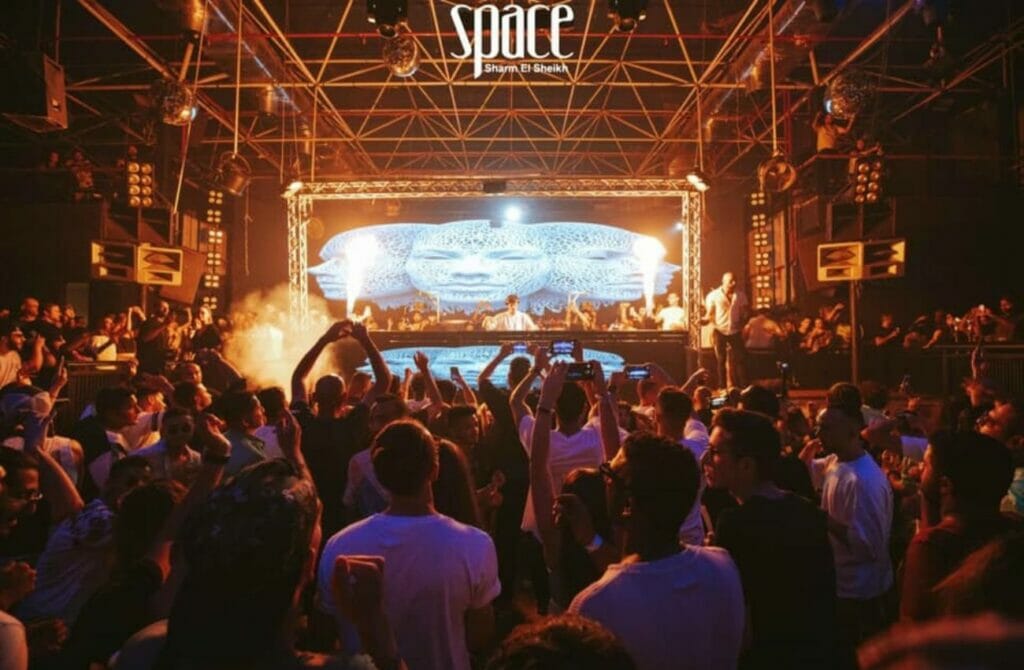
As we step further into the labyrinth of Egypt’s societal norms and laws, it becomes apparent that individuals identifying as Lesbian, Gay, Bisexual, or Transgender (LGBT) must navigate a legal landscape more convoluted than their heterosexual counterparts. The Egyptian legal fabric, though not explicitly criminalizing same-sex relationships, is fraught with nuances that turn the path of the LGBT community into an intricate maze.
Interestingly, the Egyptian legal system does not possess a direct law that criminalizes same-sex sexual behavior. Instead, the stage is set for a morality play where societal norms and conservative interpretations become the judge, jury, and executioner. The government deploys a medley of moral codes and religious teachings to prohibit and penalize homosexual activity, often under the umbrella of public decency and morality.
This tapestry of legal complexities envelops not only acts deemed ‘homosexual’ but also any expression or idea that might be construed as advocating or representing homosexuality. The very fabric of one’s identity and expression becomes susceptible to scrutiny and, potentially, prosecution. Such morality-based provisions stand as stern sentinels against any perceived threat to the conventional order and have been deployed against the LGBT community and those who dare to champion their cause for equality and acceptance.
These regulations, ostensibly there to uphold public morality and order, serve as potent weapons in curtailing LGBT rights and suppressing the voices calling for reform. Their implementation goes beyond merely controlling physical acts, extending to influence ideologies and suppress discourse, stifling the very concept of LGBT existence and acceptance in the Egyptian society.
In summary, the LGBT community in Egypt, while not directly criminalized, faces a litany of challenges due to the intricate intertwining of societal norms, religious teachings, and legal provisions that suppress their identities and rights. The struggle for recognition and reform, therefore, continues against a backdrop of legal ambiguities and societal conservatism.
Finding it hard to envisage where everything is in Sharm El Sheikh? Hopefully, this queer-centric map helps where we have marked all the bars, clubs, parties, hotels, saunas, massages, and more will help you stay in the spot best suited to you!

10 Days in Egypt
As far back as our memories go, we can all remember being amazed by the stories of ancient Egypt, the cradle of civilization. The mystery of how the pyramids were built, the unbelievable cache of treasures buried deep in tombs, the strange ritual of mummification, the art of hieroglyphics, and the wonder surrounding this unique civilization that existed 4500 years ago. There are few places on earth that so tightly grip our imagination and curiosity and it's all the more powerful when finally standing at the foot of the Great Pyramids of Giza, or exploring underground tombs in the Valley of the Kings surrounded by hieroglyphics, or standing beneath the massive pillars of the Karnak Temple in Luxor. The pages of our history books come to life right in front of us for 10 days that can only be called epic.
Our seasoned Detours travelers will note some differences with this itinerary. While we incorporate the same fun relaxed atmosphere that you've come to expect, this particular trip includes more structure each day, early mornings to beat the heat and crowds, and more inclusions in an effort to provide maximum comfort and safety in this unique part of the world. Check out the itinerary, inclusions, and trip notes for our upcoming 10-day Egypt adventures below.
NOTE: The dates of Ramadan in 2024 are March 10 to April 8. Some travelers may want to experience Egypt during Ramadan while others may not. It's a really unique time to experience Egypt, and in tourist areas you'll notice very few differences, for example some sites might close slightly earlier but this doesn't impact our schedule as we visit them earlier in the day to avoid the heat and crowds, and the restaurants where/when we dine will be open for visitors. Of course, it's a personal choice and so we suggest keeping this in mind when choosing your preferred travel dates.
- Accommodations
- What's Included
**NOTE: While the time spent in each destination remains the same on every departure, the order of stops will be different based on the cruise schedule**
There's no better place to kickstart your exciting adventure than right in the heart of bustling Cairo. Unique to our Egypt trip only: You'll be met at the airport by a representative holding a 'Detours' sign, who will personally assist you through the arrival process from start to finish, and even see that you get to the hotel via the arranged and included transportation.
On day 1 at 4:00pm, your Detours trip leader plus our local guide will meet the group in the hotel lobby and be ready to welcome you to Egypt over a drink and casual get-to-know-each-other, while preparing you for the adventure ahead. A great (and included) welcome dinner on the banks of the Nile follows, with Egyptian food and great views.
Our fabulous local guide is Hend , she's co-led every Detours group since we launched this itinerary and is regularly mentioned as a trip highlight by our travelers. She's a very qualified Egyptologist with 4 years of academic training and 15 years of experience leading group tours through her home country. You're in great hands with Hend who will lead the group through Egypt alongside one of our very own Detours trip leaders.
On day 2 we'll start the morning with a trip to the iconic Great Pyramids of Giza and the Sphinx! After we take in this incredible wonder of the world and learn some of its history, we'll take a short drive to a panoramic photo stop with an epic camel ride on the side (optional). In the afternoon we'll head over to the new GEM (Grand Egyptian Museum) to take a sneak peek inside. It's still not "officially open" (10+ years in the making!) but the building itself is a must-see!
Included Activities: The Pyramids of Giza & Sphinx, GEM (Grand Egyptian Museum).
Optional Activities: Entry inside King Cheop's Pyramid, Camel ride.
On the 3rd day we'll head to the airport together and jump on a short 1-hour flight down to Aswan (or Luxor - depending on the cruise schedule) for a few days of exploring the many incredible sights along the banks (and beyond) of the mighty Nile River, considered the source of life for thousands of years of Egyptian civilization.
Soon after arrival into Aswan - we'll take a boat to visit the beautiful Temple of Isis (the Goddess of health, marriage and wisdom) located on Philae Island. It's a marvel of decorative pylons featuring some of Egypt's finest carvings – definitely one of the real gems of Upper Egypt.
NOTE : Days 3-7 are reverse if the Cruise schedule goes from Luxor down to Aswan, all of the same inclusions/options apply.
Included Activities: Traditional Felucca boat ride, Temple of Isis, Philae Island
Optional Activities from Aswan: Abu Simbel, Nubian Museum
There's no better way to experience this beautiful region than by casually cruising down the Nile River on a comfortable ship with all the amenities of an upscale hotel. On our 4th day we'll board our floating home for 3 nights, where we can enjoy watching the daily life on the banks of the Nile from the comfort of our guest rooms, or the rooftop sundeck, the pool, or the bar. It's a fantastic way to enjoy constantly changing scenery, while also having plenty of opportunities to jump off to explore impressive sites along the way.
Our cruising trip ends with what many will consider the highlight of it all - the Valley of the Kings and Luxor. We'll go underground in the Valley of the Kings to explore royal tombs and learn about the vibrant hieroglyphics that surround us in each one. We'll explore the Temple of Queen Hatshepsut, who was the most famous queen of Egypt and ruled for the longest period.
Included Activities during the Cruise portion of the trip: Kom Ombo Temple, Valley of the Kings (entrance & 3 tombs), Queen Hatshepsut Temple, Colossi of Memnon, Karnak Temple, Traditional felucca boat at sunset.
Optional Activities during the Cruise portion of the trip: Abu Simbel, Hot Air Ballooning, Luxor Temple, Additional tombs in the Valley of the Kings (Seti I, Ramses V, Ramses VI, Tutankhamun).
On the morning of our 7th day, we'll wander around in awe at Karnak, one of the world's most celebrated temple complexes, built over a period of some 2000 years, some of it dating back to 2,055 BC - that's over 4000 years ago!
Afterwards, we'll jet back to Cairo on a 1-hour flight, then head back to the same hotel we started in for the remainder of the trip.
Our 8th day in the city introduces some of the flexibility our travelers expect with a day of options. Maybe you'd like to check out the ancient city of Memphis and Pyramid of Djoser in Saqqara (Egypt's first Pyramid) or give yourself some time for a poolside drink in the sun or spa day. This is a day to experience something that specifically interests you, before we are welcomed into the home of a local family for a delicious dinner all together.
Included Activities : Dinner with a family in Cairo
Optional Activities: Half-day trip to Saqqara/Memphis, Alexandria Day trip, Egyptian Museum, Coptic Cairo.
Cairo is packed full of amazing sites to experience and this day is spent exploring the best of them together. These include the NMEC (National Museum of Egyptian Civilization), which holds the mummies of 18 kings and 2 queens and is the first museum in the Arab world dedicated to all the historical periods and their impact on the area.
From there, we'll ascend to the Citadel of Saladin built in 1176 to protect the city from the Crusaders invasion. Perched above the city, this makes for a great viewpoint in addition to its historical significance and architectural beauty. It's here that we'll visit inside the stunning Mosque of Muhammad Ali and have a fascinating and beautiful introduction to Islam from our guide Hend.
The last stop of the day is the eclectic souks of the Khan al-Khalili Bazaar, which is an essential Egyptian experience. You'll have plenty of time to lose yourself in the colors and aromas of this fascinating marketplace, one of the worlds’ oldest. We’ll learn how various vendors prepare popular food, explore the Al Attarin spice and El Sagha gold markets, and take a break for tea at the iconic Feshawi Café.
Included Activites: NMEC, Mosque of Muhammad Ali, visit to the Khan al-Khalili Bazaar.
Our Egyptian adventure together comes to a close today in Cairo, after an incredible 10 days of unique experiences you'll never forget. There are no scheduled activities today, leaving you free to book your departing flight from Cairo any time on this 10th day.
Included is your departing 'concierge' service which is transportation from the Hotel to Cairo airport where a representative will meet you and assist with your departure, right up until you go through passport control.
Want more of this beautiful part of the world? Keep the adventure going from Cairo on the 10th day as you jet over to the capital city of Jordan - Amman - on this 4-night optional extension just for Detours travelers! The optional extension includes 4 nights in a beautiful 4-star and 5-star hotels, a full-time local Jordanian guide, a visit to the Dead Sea, a tour of the ancient city of Petra, and even a Jeep tour and camel ride in the Wadi Rum desert. Full details can be found here . Simply get in touch with us if you'd like to add this to your Egyptian adventure.
We don't like staying in smelly shacks on our vacations and we're pretty sure you don't either! You work hard to go on vacation and we believe you deserve an enjoyable, comfortable place to wind down at the end of each day. We put a LOT of time into finding the perfect accommodation for your trip. Check out our approved accommodation to see where we've stayed in the past and where we'll likely be staying on your trip.
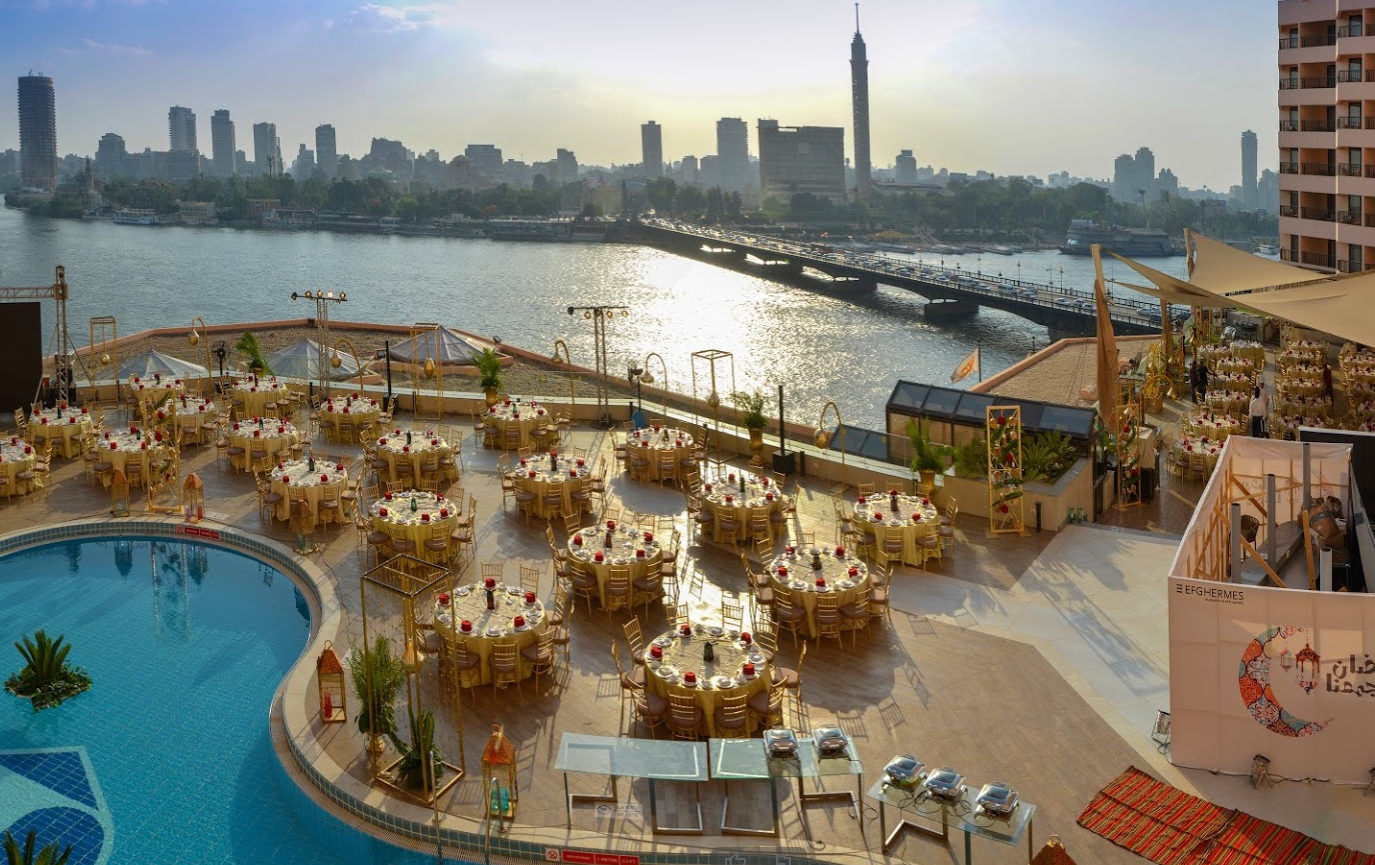
Standing on the site of the historic Semiramis hotel, this IHG property is situated right on the River Nile and features an outdoor pool, great dining options, a Spa, small arcade of convenient shops, and is within walking distance of the Egyptian Museum.
While we don't normally use big-brand hotels on our trips, in Egypt, we've found that it serves as the best combination of comfort and convenience for our guests. The Intercontinental is in a great location, it's safe to walk on the streets nearby and over to the island of Zamalek (though you'll want to ignore any of the locals who are trying to 'help' you cross the street - as our guide says, in Egypt - nothing is for free!) We also love that at this hotel all of the staff are trained in diversity and inclusion, and are familiar and welcoming of its international, LGBT guests.

Perched right on the West bank of the Nile River, with views over the city, the river, and the giant sand dunes, the 5-star Movenpick Resort is a fantastic home for us in Aswan. Very quick walking distance to downtown (via the complimentary ferry cross-river), a rooftop bar with stunning views, and two beautiful pools, all help make this the most comfortable place to stay in the city. NOTE: Some groups spend their night in Aswan on the Nile cruise ship, rather than on land, depending on ship scheduling.
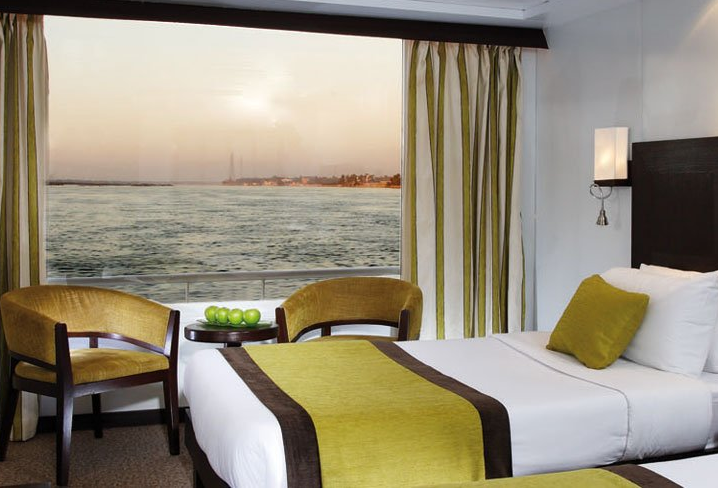
With just 60 cabins, the Royal Lotus/Lily are some of the smaller, more intimate of the Nile ship options. With a nice rooftop pool, great on-board restaurant, and all the amenities you'd expect from a hotel room on land. All-in-all a very comfortable way to enjoy a cruise down the Nile River.
*Please note that due to availability, these exact hotels may not all be available during all Detours trips. However, we will always replace these with similar hotels, and will never downgrade.
Egypt has experienced a sustained period of relative calm and peace since their latest regional flare-up ended over 10 years ago. The governments of Canada, USA, and the UK currently do not advise against travel to the areas on this itinerary (Cairo and tourist areas along the Nile River). That said, it's important to use the resources provided by these official governement sources to ensure you are making informed travel choices about any destination you're interested in traveling to. For extra safety, the Tourist Police have copies of our itinerary and know of our whereabouts at all times. Occasionally we'll be escorted by an officer, as is common practice for all tour groups in Egypt.
Local attitudes towards LGBT people mean that this trip may not be right for all travelers. While homosexuality isn't illegal in Egypt, it isn't socially tolerated by most Egyptians. To help improve the comfort, enjoyment, and safety of our travelers Detours partners with local LGBT-friendly inbound operators and accommodation, and uses private services including local guides and transportation. We encourage travelers to respect local customs and behaviors while in Egypt and any country they visit.
In any country that we operate in, we encourage our travelers to respect the local culture, and this should be applied to modesty within a majority-Muslim country such as Egypt. For the safety and comfort of your fellow group members as well as your own, we require that you do not engage in any public displays of affection. The use of online meet-up apps is also discouraged in Egypt. Outside of our group itself, this particular trip is not one with a LGBT-focus.
While this part of the world is known for its hot and sunny climate, we've scheduled our Egypt trips outside of the hottest months of the year to get those great hot-but-not-too-hot days with plenty of sunshine!
March/April : In locations like Cairo, Luxor, and Aswan, average high temperatures in March/April range from around 20 to 27°C (68 to 81°F). These temperatures provide comfortable conditions for outdoor activities and sightseeing. Average low temperatures during the night range from approximately 11 to 17°C (52 to 63°F)
October in Egypt offers delightful weather with milder temperatures, making it an ideal time for outdoor exploration. The scorching summer heat starts to dissipate, providing a more comfortable climate for travellers.
In cities like Cairo, Luxor, and Aswan, as well as the Nile Valley, daytime temperatures range from 25°C to 30°C (77°F to 86°F). The evenings start to become cooler as well, with temperatures ranging from 16°C to 20°C (61°F to 68°F).
The weather in October is generally sunny and pleasant, allowing for enjoyable outdoor activities and sightseeing. However, it's still advisable to wear sunscreen, bring a hat, and dress in layers to accommodate temperature fluctuations throughout the day.
We highly recommend wearing shirts that breathe (i.e. anything but cotton!)
Traditional Egyptian cuisine includes many legumes and vegetables and closely resembles cuisines of Eastern Mediterranean countries. While there are a lot of vegetarian options here, meat-eaters need not worry as there's plenty of options too. Think shawarma, hummus, kofta, pita bread, and kebab. In the areas that we'll be visiting on this trip you'll have the opportuity to experience the local cuisine, while also having varied other options as well. Tea is the national drink so you'll find lots of it! And if you're looking for alcohol, don't worry, it's not actually that hard to find. While local Muslims avoid alcohol, there are many non-Muslims who enjoy drinking in Egypt.
The tax on liquor is significantly higher than other alcohol in Egypt, so you might find yourself choosing a local Egyptian wine (yep, that's a thing!) or a beer instead of a cocktail or mixed drink.
You'll want to pack for warm weather in Egypt, so plenty of short-sleeved shirts (ideally not cotton as they don't breathe well in the scorching heat), and shorts to ensure you're comfortable outside in the sun.
While the majority of this trip will be very casual and t-shirts and shorts are completely accepted (just not short-shorts, like booty shorts), you may want to bring a few button-up shirts for nice meals - along with your swimwear and tanktops of course! Comfortable walking shoes are very important on this trip so make this your priority footwear. No hiking shoes required. Flip-flops or sandals can be nice for the boat too. On the Nile cruise there's a dress code for dinner only, where pants must be worn.
It's a good idea to pack a little bug repellent, as the flies can get a little frustrating at times.
Egypt uses the "Egyptian Pound" as their official currency. While many places accept (and prefer!) US Dollars, you'll generally get a better price when using their local currency. There are NO currency exchange shops around Egypt , only one at the airport on your departure out of Egypt (it's located after you've passed through passport control).
We advise arriving to Egypt with the following: 5-7 USD tip for the welcome concierge service, 5 USD tip for the driver (airport to hotel), and your bank card to withdraw EGP from any of the 5 ATMs in the hotel lobby. The maximum you can withdraw per transation is 4000 EGP and you will be able to withdraw from multiple machines (and/or withdraw as you go). You could arrive with 1,000 EGP to ensure you're ready for those first little necessities but the ATMs will dispense smaller bills and are very conveniently located in the hotel lobby. Just remember to always deny conversion (for the better exchange) and 'Current' account is what they call your checking account. Credit cards are accepted in all of our hotels for personal meals (not group meals), and on our cruise but cash will be necessary for things like tips and all group meals and optional activities/entrance fees .
If possible, it's always a good idea to travel internationally with a credit card that doesn't charge foreign transaction fees. The savings will add up over the course of your trip and may end up being worth the work of getting a new card prior to your trip. Once you're overseas, if presented with the option to pay in the local currency or your home currency, we suggest always choosing the local currency to further avoid fees.
Tipping is a large part of the tourism industry in Egypt. Those who work in the tourism industry in Egypt have come to expect tips at almost every interaction, and that's why we encourage our groups to participate in the tip pool at the beginning of the trip (approximately 70 USD per person) as it takes away the frustration of always looking for cash, and allows our guide to appropriately tip service staff along the way. Your trip leader and guide will cover this topic during your welcome talk/drink. As is standard in the industry, most travelers budget around $10-15 USD per day for their Detours trip leader.
On this partiular trip we've chosen big-brand hotels as they provide a higher level of comfort and safety than the smaller boutique properties that we use in other destinations. They're beautiful properties, all in great locations, with fantastic reputations that we're sure you're going to love! Just note that the 5-star designation can mean different things to different people and in different countries so we encourage you to check out the listed properties online to get a better understanding if this is something that concerns you. A 5 star ranking in one country is not always the same as a 5 star ranking in another.
You'll have one Detours trip leader and Hend, our local guide - during your entire Egyptian adventure! Our leaders are a big part of the success of your experience with us and their job is to help ensure that this is your trip of a lifetime by taking the hassle out of your trip and enabling you to experience everything you came to Egypt for. Don't hesitate to ask them questions along the way and let them know if there's something that can make your trip more enjoyable.
In most of the destinations we operate in, we avoid scheduling activities or transfers early in the morning. However, given the heat and crowds that reach the sites on this itinerary in the mid-day, we know that the best time to experience Egypt is in the early mornings. That's why, on this particular itinerary only, days tend to start quite early to avoid that heat and those crowds. While our scheduled activities and tours may start together at 6am-7am most days, you may even choose optional activities that begin earlier than this, such as hot air balloon rides or a trip to Abu Simbel. If you're looking for a "stay up late, sleep in late" type of trip, this may not be the right itinerary for you.
While there is no minumum group size on a Detours trip, our maximum group size is 16. Ages of group members vary but almost all our travelers are in their 30's to 60's. Whatever the age of the guests on our trips, everyone's already got something in common, an exciting new experience in a new country! We welcome everyone onto our trips although it’s important to know that most groups are made up of entirely gay men.
No problem! Don’t worry, at least half our travelers come solo and our trip will provide plenty of chances to meet great people within the group, including other solo travelers. As far as your accommodations go, you’ve got two choices. We can either pair you up with another solo group member in a two-bed room for no extra charge, or you can have your own room for a very reasonable surcharge.
Egypt uses the same plug shape that most of Europe uses, with two circular pins. The voltage is 230V with 50 Hz frequency. These days, the majority of items that are plugged into an outlet are built to handle varying voltage and frequency levels, but just to be sure, we suggest checking your item for its accetable range.

To ensure you don't lose connection along the way, your cell phone provider likely has several roaming options available. We suggest reaching out to them prior to the trip to find out which package is right for you as it will depend on how much you intend to use your phone while traveling. Keep in mind that all accommodation and most restaurants have free WiFi available as well.
A NOTE ABOUT WIFI IN EGYPT : Specifically, the Nile cruise operates on a SIM-based WiFi system, which often has weak signals especially when docked close to other ships. The WiFi is also only available in one common area on the ship. Please remember that there are still many places in the world where signal strength won't be as good as what you might be used to at home, so we encourage you to excercise patience and understanding - or to go grab a cocktail and chat with other guests up on the sundeck as you watch the world pass you by, you're here to enjoy it after all!
What's included? • All taxes • All group transport between itinerary destinations • Accommodations for your 10-day Detours experience • Two domestic flights from Cairo to Aswan/Luxor and Aswan/Luxor to Cairo • 3-night Nile River Cruise • Guided visits and entrance fees at Giza Pyramids, Egyptian Museum, Edfu Temple, Karnak Temple, Temple of Isis, Kom Ombo Temple, Temple of Queen Hatshepsut • Entrance to 3 tombs in the Valley of the Kings • 4 lunches • 4 dinners • All full breakfasts • Local Egyptian guide throughout • Knowledgeable and fun Detours leader •
What isn't included? • Meals and drinks outside of those listed above • Activities outside of the those listed above • International Airfare • Visa/departure fees • Optional gratuities •
Additional spending budget? Your big-ticket items are included through the trip, but you'll want to budget for additional spending such as additional meals, drinks, shopping, activities, etc. These costs can vary dramatically with differing personal habits but we suggest expecting to spend an additional $700 USD at the lower end for the more budget-conscious and $1100 USD at the higher end for the splurgers. We suggest arriving to Egypt with approximately 5000 Egyptian Pounds in cash.
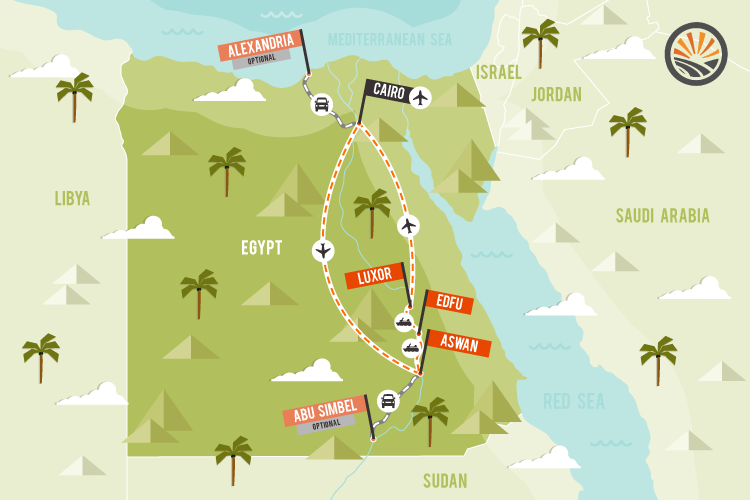
$4170.00 USD
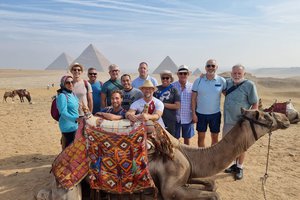
Trip Reviews
Efren e. - usa, march 11, 2024.
As we wrap up our trip to Egypt, I thank Detours for a second amazing trip, having gone to South Africa last year. Once again, the tour was well-organized from beginning to end. Maurice was fully available in the months leading up to the trip. Once on the ground, Darren was my tour leader for a second year in a row. He is an enthusiastic, organized, kind and true leader. He created a fun and friendly atmosphere while also providing daily guidance and updates on when and where to eat, what to bring, what to wear and great tips based on previous trips. He is always willing to help or trouble-shoot on any questions. He really looks out for his guests. Hend was our local Egyptian content expert and educator and provided tremendous insights on all our sites and Egyptian history. She is a lovely person who was also instrumental in helping the group seamlessly navigate every city we visited, providing best recommendations on where and what to eat, how much to tip, and much more. She is open to sharing what life is like in Egypt and providing insights on topics including Islam. We kept thinking: I would not have wanted to wing this trip on my own. We felt extremely welcome and safe on this trip. The actual experiences and sites are breath-taking. Loved everything about this trip. I would go as far as to say that it was the best trip of my entire life.
Ian S. - Australia
March 14, 2024.
We did a Detours Egypt trip in March 2024 and it was fabulous. The trip leader (Darren) and local guide looked after us so well. The schedule and places we visited we just perfect. The River Nile boat cruise was amazing. All through the trip we felt safe. Being a small group tour it was easy and quick to move around. Highly recommend Detours Travel.
Our Other Trips
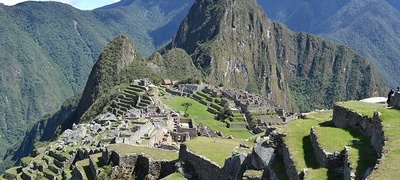
12 Days in Peru
Starting at $3,740 usd.
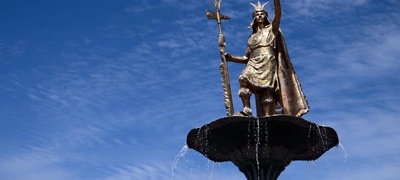
8 Days in Peru
Starting at $3,390 usd.
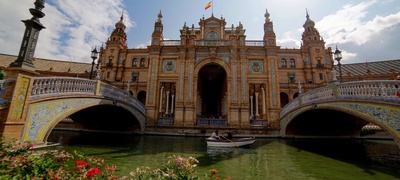
12 Days in Spain
Starting at $3,660 usd.
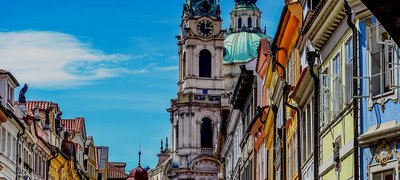
10 Days in Europe
Starting at $3,540 usd.
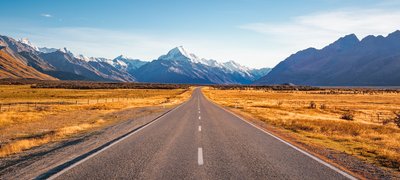
11 Days in New Zealand
Starting at $3,830 usd.
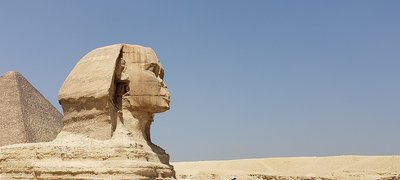
Starting at $4,170 USD
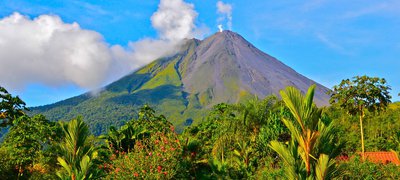
11 Days in Costa Rica
Starting at $3,680 usd.

11 days in South Africa
Starting at $4,080 usd.

11 Days in Scandinavia
Starting at $3,970 usd.
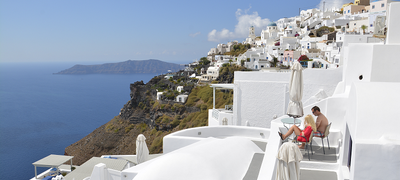
11 Days in Greece

11 Days in Portugal & Morocco
Starting at $3,990 usd.
8 Days in Italy
Starting at $3,320 usd.

10 Days in Japan
Starting at $4,130 usd.

10 Days in Australia
Starting at $4,190 usd.
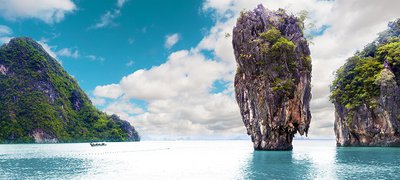
13 Days in Thailand & Cambodia
Starting at $3,690 usd.

The 203 Worst (& Safest) Countries for LGBTQ+ Travel in 2023

Instead of relying on hearsay and anecdotes from other travelers, we took a deep look at LGBTQ+ rights, country by country. After 400+ hours of research, we’ve reviewed all countries’ individual laws and gathered data from a variety of trusted international sources to create the definitive “LGBTQ+ Travel Safety Index” that will help you find the safest (and least safe) countries for your next trip abroad.

Our methodology
We ranked 203 countries with available data, and then carefully examined LGBTQ+ rights for each country. We created our LGBTQ+ travel safety index based on a total of ten ranking factors, each pertaining to the health and wellbeing of LGBTQ+ individuals. We worked with academic researcher, Eliot Assoudeh PhD. , to design the methodology and cross-reference all data. We utilized a mixed-methods research design to create the index.
Note on Russia/Ukraine: Russia and Ukraine were included in this study. However, keep in mind that (as in all instances of political unrest), the most marginalized people in society are often targets . Please note that the situation for LGBTQ+ people is constantly evolving in the region.
Positive factors
- Legalized Same-Sex Marriage (0 to +50 Points) — Is same-sex marriage legal and equal under the law in this country? If marriage is not equal, are civil unions legal? If not, does the country legally recognize foreign LGBTQ+ marriages? We ranked the scores for this metric based on how many years same-sex marriage has been legal in this country with the highest possible score being 50 points. Civil unions and other types of partnerships received 25 points or less and were also ranked by the number of years they have been legal. Additionally, if a country only legally recognizes foreign LGBTQ+ marriages then they earned 10 points. Source: Recognition of same-sex relationships – Human Rights Watch , we also cross-referenced with Equaldex: Collaborative LGBTQ Knowledge Base
- LGBTQ+ Worker Protections (0 to +50 Points) — For the people living in that country, are there legal protections against discrimination in the workplace? 50 points were awarded for both sexual orientation and gender protection; 25 points were awarded for sexual orientation protection only. Additionally, if a country only recognizes limited rights for LGBTQ+ worker protections, then they earned 10 points. Source: LGBTQ+ Worker Protections – ILGA
- Legal Protections Against Anti-LGBTQ+ Discrimination (0 to +50 Points) — Are there either constitutional or broad legal protections of LGBTQ+ people in this country? Constitutional protections were awarded 50 points; broad protections were awarded 25 points. Additionally, if a country only recognizes limited protections against discrimination, then they earned 10 points. Source: Anti Discrimination Laws – ILGA
- Criminalization of Hate-Based Violence (0 to +50 Points) — Is anti-LGBTQ+, hate-based, or homophobia-inspired violence considered a hate crime in this country? Is hate-based, anti-LGBTQ+ speech considered hate speech? The existence of hate crime penalties received 50 points; incitement-only punishments received 25 points. Additionally, if a country only has limited criminalization of hate-based violence, then they earned 10 points. Source: Criminalization of Hate-Based Violence – ILGA
- Adoption Recognition (0 to +50 Points) — Is joint adoption and/or second-parent adoption legal in this country for same-sex parents? The recognition of both joint and second-parent adoption received 50 points, while only second-parent adoption recognition received 25 points. Source: Adoption Recognition – ILGA
- Gallup World Poll (0 to +100 points) — In the Gallup poll, individuals were asked, “Is the city or area where you live a good place or not a good place to live for gay and lesbian people?” The percentages represented and used in our metrics include those who said “good place” for that country. We gave this factor a double weighting (maximum 100 points) because it gives a very clear pulse on the general attitude towards LGBTQ+ people by locals in each country. If, for example, a country answered 92% positively to the Gallup question, then they were awarded 92 points. We use the most recently available data available for that country. Source: Gallup World Poll
- Transgender Legal Identity Laws (0 to +50 points) — The degree of legal recognition provided to transgender people varies widely throughout the world. We individually reviewed the laws for each country and asked the following questions. Does the country allow individuals to change their legal gender identity without requiring sex reassignment surgery (SRS) or hormone replacement therapy (HRT)? If so, these countries were awarded 50 points or less depending on the details of the law. Does the country require SRS for people to qualify for legal gender change? If so, these countries received 25 points or less depending on the details of the law. Does the country have no rights for or against people legally changing their gender? If so, these countries received 0 points. Source: We reviewed individual laws of each country and Transgender Rights – Wikipedia
Negative factors
- Illegal LGBTQ+ Relationships and Acts (0 to -100 Points) — Can “sodomy,” “indecent acts,” or “buggery” result in punishments under the law such as physical violence, a fine, or prison time? Any possible death sentences or life-in-prison sentences under the law receive the maximum -100 point penalty. All other punishments were ranked by severity. We gave this factor a negative double weighting because the fact that homosexuality is illegal and can receive the death sentence means that the laws of these countries are extremely unfavorable for LGBTQ+ people. Source: Global Anti-LGBTQ+ Laws – Human Rights Watch
- Propaganda/Morality Laws (0 to -50 Points) — Are there laws sanctioned by the state to prevent the dissemination or publication of information about queer culture? Are there laws affecting the creation of LGBTQ+ advocacy groups and non-governmental organizations (NGOs)? This metric was graded based on the severity of the punishments with -50 points being the worst score. Source: Global Anti-LGBTQ+ Laws – Human Rights Watch
- Transgender Legal Identity Laws (0 to -50 points) — We individually reviewed the laws for each country and asked the following question. Does the country make it illegal for people to change their gender? If so, these countries were given up to negative fifty points depending on the severity of punishment. For example, in Oman, simply imitating the opposite sex gets up to 1 year in prison and this country received the full -50 points. Source: Global Anti-LGBTQ+ Laws – Human Rights Watch
- Transgender murder rates (0 to -100 points) — Countries were awarded zero points if they did not have any recorded transgender murders, but were deducted up to 100 points if transgender murders were reported through the Transgender Murder Monitoring website. Rates are per million citizens and occurred between 2008 and September 2022. Source: Transgender Murder Monitoring – TvT
To measure LGBTQ+ safety abroad, one cannot look only at data on whether or not same-sex marriage is legal and if anti-LGBTQ+ discrimination laws are in place. It also depends on the general attitude of the culture, minutiae of the legal system, and oppression of LGBTQ+ rights. These issues can affect everything, from your ability to show public displays of affection to being able to share a hotel room bed to the capacity at which you can use dating apps without being caught by the local police. A few items on our list, such as adoption recognition and worker protections, may not affect LGBTQ+ travelers directly, but these factors are a good indication of overall attitudes within the culture.
Study Limitations: Due to budget constraints, the methodology used in our index does not sample the actual experiences of LGBTQ tourists who have visited each country. One way we attempted to overcome this weakness was by utilizing the Gallup World Poll as well as looking at each country’s laws and any progress the country’s had in comparison with our previous years’ studies.
What’s changed for LGBTQ+ individuals over the past year?
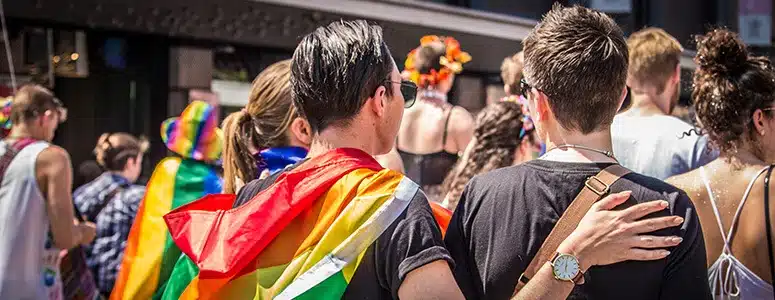
Some of the positive highlights include:
- Cuba legalized same-sex marriage in September 2022.
- While gay marriage is still banned, Japan is making progress toward the acceptance of same-sex marriage, and gay couples can now register a domestic partnership as of November 2022.
- Switzerland legalized same-sex marriage on July 1, 2022.
- Singapore, Antigua and Barbuda, Barbados, Saint Kitts and Nevis decriminalized homosexuality in 2022.
- As of January 31, 2023, same-sex marriage and adoption are fully legal in Slovenia.
- Croatia passed laws expanding the rights of same-sex couples to joint adoption in August 2022.
- In December 2022, the U.S. Virgin Islands increased its discrimination protections for people based on their sexual identity and gender expression.
- New Zealand plans to implement gender self-identification on June 15, 2023.
Unfortunately, not all news was good for LGBTQ+ rights in the past year. Russia passed stricter laws that prohibit LGBTQ+ “ propaganda .” In 2022, Indonesia banned sexual activity outside of marriage to come into effect in three years, but this will target LGBTQ+ people who are not permitted to marry in the country. According to the ACLU , the 2023 legislative session has already seen over 120 bills aimed at restricting the rights of LGBTQ+ people in the United States.
Where are same-sex relationships illegal?
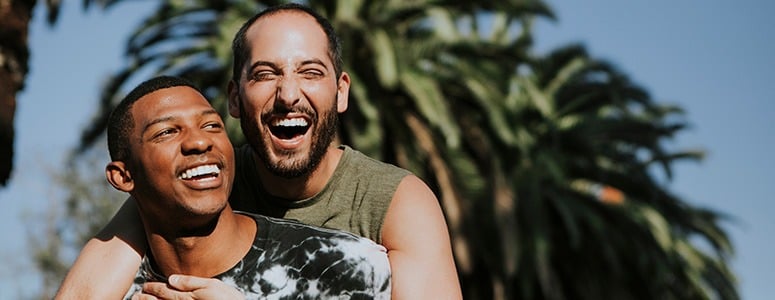
Unfortunately, some countries where it’s illegal to be gay or trans also happen to be popular vacation spots. For instance, it’s illegal to be gay in Jamaica; the “buggery law,” which is leftover from the colonial era, allows for a sentence of up to 10 years in prison, including hard labor. Jamaica was called “ the most homophobic place on Earth ” by Time magazine in 2006. That label has clung to Jamaica ever since, and with good reason. In a 2013 survey of 71 LGBTQ+ people conducted by Human Rights Watch, more than half said they had been victims of homophobic violence. Non-violent discrimination is even more pervasive, with bullying and exclusion faced in education, healthcare, and within local communities. Although there is some light at the end of the tunnel for Jamaica since there are signs that it’s moving toward reform.
Those looking for trans- and gay-travel-safe countries should reconsider popular vacation destinations like Malaysia, Saudi Arabia, Morocco, Myanmar, and Egypt as well as some of the more popular beaches in the Caribbean, like Saint Lucia and Barbados.
Please note: All countries marked with an asterisk* in the below list were former British colonies and their anti-LGBTQ+ laws mostly came into effect under British rule.
(CLICK the country names for more details on their anti-LGBTQ+ laws) Jamaica* LGBTQ+ Travel Safety Index Score: -132
Section 76. Whosoever shall be convicted of the abominable crime of buggery, committed either with’ mankind or with any animal, shall be liable to be imprisoned and kept to hard labour for a term not exceeding ten years.
LGBTQ+ Travel Safety Index Score: -75
Sections 132, 133.
- GROSS INDECENCY
(1) A person who commits an act of gross indecency with another person commits an offence and is liable on conviction on indictment to imprisonment for 10 years or on summary
conviction to 5 years.
(2) Subsection (1) does not apply to an act of gross indecency committed in private between an adult male person and an adult female person, both of whom consent.
(3) For the purposes of subsection (2)
(a) an act shall be deemed not to have been committed in private if it is committed in a public place; and
(b) a person shall be deemed not to consent to the commission of such an act if
(i) the consent is extorted by force, threats or fear of bodily harm or is obtained by false and fraudulent representations as to the nature of the act;
(ii) the consent is induced by the application or administration of any drug, matter or thing with intent to intoxicate or stupefy the person; or
(iii) that person is, and the other party to the act knows or has good reason to believe that the person is suffering from a mental disorder.
(4) In this section “gross indecency” is an act other than sexual intercourse (whether natural or unnatural) by a person involving the use of the genital organs for the purpose of arousing or gratifying sexual desire.
Laws of Saint Lucia Criminal Code Cap.3.01 95 Revision Date: 31 Dec. 2005
(1) A person who commits buggery commits an offence and is liable on conviction on indictment to imprisonment
(a) life, if committed with force and without the consent of the other person;
(b) ten years, in any other case.
(2) Any person who attempts to commit buggery, or commits an assault with intent to commit buggery, commits an offence and is liable to imprisonment for 5 years.
(3) In this section “buggery” means sexual intercourse per anus by a male person with another male person.
Source: Criminal Code, No. 9 of 2004, sections 132, 133.
Article 16. Buggery “(1) A person who commits buggery is guilty of an ofence and liable on conviction to imprisonment for— (a) twenty-fve years, if committed by an adult on a minor; (b) ten years, if committed by an adult on another adult; or (c) fve years, if committed by a minor; and, if the Court thinks it ft, the Court may order that the convicted person be admitted to a psychiatric hospital for treatment. (2) Any person who attempts to commit the ofence of buggery, or is guilty of an assault with the intent to commit the same is guilty of an ofence and liable to imprisonment for four years and, if the Court thinks it ft, the Court may order that the convicted person be admitted to the psychiatric hospital for treatment. (3) In this section “buggery” means sexual intercourse per anum by a male person with a male person or by a male person with a female person.
Source: Sexual Offences Act 1998, article 16. Grenada* LGBTQ+ Travel Safety Index Score: 33
Article 431. If any two persons are guilty of unnatural connexion, or if any person is guilty of unnatural connexion with any animal, every such person shall be liable to imprisonment for ten years.
Source: Criminal Code of 1987, article 431. Saint Vincent and the Grenadines* LGBTQ+ Travel Safety Index Score: -70
Sections 146, 148.
148. Any person, who in public or private, commits an act of gross indecency with another person of the same sex, or procures or attempts to procure another person of the same sex to commit an act of gross indecency with him or her, is guilty of an offence and liable to imprisonment for five years.
146. Any person who commits buggery with any other person; commits buggery with an animal; or permits any person to commit buggery with him or her; is guilty of an offence and liable to imprisonment for ten years.
(Click the country names for more details on their anti-LGBTQ+ laws)
Sections 214, 215, 217. 214. Any person who- (1) has carnal knowledge of any person against the order of nature; or (2) has carnal knowledge of an animal; or (3) permits a male person to have carnal knowledge of him or her against the order of nature; is guilty of a felony, and is liable to imprisonment for fourteen years.
215. Any person who attempts to commit any of the offences defined in the last preceding section is guilty of a felony, and is liable to imprisonment for seven years. The offender cannot be arrested without warrant.
217. Any male person who, whether in public or private, commits any act of gross indecency with another male person, or procures another male person to commit any act of gross indecency with him, or attempts to procure the commission of any such act by any male person with himself or with another male person, whether in public or private, is guilty of a felony, and is liable to imprisonment for three years. The offender cannot be arrested without warrant.
Source: Criminal Code Act (Chapter 77), 1990, sections 214, 215, 217; Same Sex Marriage (Prohibition) Act 2013. Malawi* LGBTQ+ Travel Safety Index Score: -163
Sections 153, 137A. 153. Unnatural offences Any person who— (a) has carnal knowledge of any person against the order of nature; or (b) has carnal knowledge of an animal; or (c) permits a male person to have carnal knowledge of him or her against the order of nature, shall be guilty of a felony and shall be liable to imprisonment for fourteen years, with or without corporal punishment.
Source: Penal Code of 1930 (amended 2010), sections 153, 137A. Oman LGBTQ+ Travel Safety Index Score: -145
Articles 33, 233, 266(d).
266. The penalty shall be imprisonment for a period not less than one month, and not more than one year, and a fine of not less than (100) one hundred Omani riyals, and not more than (300) three hundred Omani riyals, or one of these two penalties for each mention: D – appeared publicly in the appearance of women in his clothing or body.
Source: Omani Penal Code No. 7/1974, articles 33, 223 and Oman Penal Code, Article 266(d) Zambia* LGBTQ+ Travel Safety Index Score: -104
Sections 155, 156. 155. Any person who- (a) has carnal knowledge of any person against the order of nature; or (b) has carnal knowledge of an animal; or (c) permits a male person to have carnal knowledge of him or her against the order of nature; commits a felony and liable, upon conviction, to imprisonment for a term not less than fifteen years and may be liable to imprisonment for life: Provided that where a person- (i) has carnal knowledge of a child against the order of nature; (ii) causes a child to have carnal knowledge of an animal; or (iii) permits a male person to have carnal knowledge of a male or female child against the order of nature; that person commits an offence and is liable, upon conviction, to imprisonment for not less than twenty-five years and may be liable to imprisonment for life. (As amended by No. 26 of 1933 and repealed and replaced by Act No. 15 of 2005) Unnatural offences
156. Any person who attempts to commit any of the offences specified in section one hundred and fifty-five commits a felony and is liable, upon conviction of not less than seven years but not exceeding fourteen years. (As amended by No. 26 of 1933 and repealed and replaced by Act No. 15 of 2005)
Source: Penal Code Act (as amended by Act No. 15 of 2005), sections 155, 156. Tanzania* LGBTQ+ Travel Safety Index Score: -120
Sections 138(a), 154. 138 A. Acts of gross indecency between persons and person who, in public or private commits, or is a party to the commission of, or procures or attempts to procure the commission by any person of, any act of gross indecency with another person, is guilty of an offence and liable on conviction to imprisonment for a term not less than one year and not exceeding five years or to a fine not less than one hundred thousand and not exceeding three hundred thousand shillings; save that where the offence is committed by a person of eighteen years of age or more in respect of any person under eighteen years of age, a pupil of primary school or a student of secondary school the offender shall be liable on conviction to imprisonment for a term not less than ten years, with corporal punishment, and shall also be ordered to pay compensation of an amount determined by the court to the person in respect of whom the offence was committed for any injuries caused to that person.”
154. Unnatural of offences (1)Any person who- (a)has carnal knowledge of any person against the order of nature; or (b)has carnal knowledge of an animal; or (c)permits a male person to have carnal knowledge of him or her against the order of nature.commits an offence, and is liable to imprisonment for life and in any case to imprisonment for a term of not less than thirty years. (2)where the offence under subsection (1) of this section is committed to a child under the age of ten years the offender shall be sentenced to life imprisonment.”
Source: Penal Code of 1945 (as amended by the Sexual Offences Special Provisions Act, 1998), section 138(a), 154. Sudan* LGBTQ+ Travel Safety Index Score: -109
In July 2020, Sudan’s Sovereign Council amended the penal code, removing some crimes from the books and reducing sentences for others, including sodomy. Previously, the death penalty was punishment for individuals accused by committing “homosexual sex” defined by the act of penetration, for the third time. For people found guilty of this offense for the first time, sentences were lashing 100 times or prison up to 5 years. For the second time, the sentence was both punishments combined. Learn more here . Uganda* LGBTQ+ Travel Safety Index Score: -92
Sections 145, 148. 145. Unnatural offences. Any person who— (a) has carnal knowledge of any person against the order of nature; (b) has carnal knowledge of an animal; or (c) permits a male person to have carnal knowledge of him or her against the order of nature, commits an offence and is liable to imprisonment for life.
148. Indecent practices. Any person who, whether in public or in private, commits any act of gross indecency with another person or procures another person to commit any act of gross indecency with him or her or attempts to procure the commission of any such act by any person with himself or herself or with another person, whether in public or in private, commits an offence and is liable to imprisonment for seven years.
Source: Penal Code Act of 1950 (Chapter 120), (as amended), section 145, 148. Egypt* LGBTQ+ Travel Safety Index Score: -96
Article 9(c), Article 1. Article 9: Punishment by imprisonment for a period not less than three months and not exceeding three years and a fine not less than 25 LE and not exceeding 300 LE in the Egyptian administration and not less than 250 Lira and not exceeding 3000 Lira in the Syrian administration or one of these two punishments applies in the following cases: (c) Whoever habitually engages in debauchery or prostitution.
Upon the apprehension of a person in the last category, it is permitted to send him for a medical examination. If it is discovered that he is carrying an infectious venereal disease, it is permitted to detain him in a therapeutic institute until his cure is completed.
It is permitted to determine that the convicted person be placed, upon completion of his sentence, in a special reformatory until the administrative agency orders his release. This judgment is obligatory in cases of recidivism, and the period spent in the reformatory is not allowed to be more than three years. …
Article 1: (a) Whoever incites a person, be they male or female, to engage in debauchery or in prostitution, or assists in this or facilitates it, and similarly whoever employs a person or tempts him or induces him with the intention of engaging in debauchery or prostitution, is to be sentenced to imprisonment for a period not less than one year and not more than three years and a fine between 100 and 300 LE in the Egyptian administration and between 1000 and 3000 Lira in the Syrian administration.
(b) If the person upon whom the crime is perpetrated has not reached the age of twenty-one years, the punishment is imprisonment for a period not less than one year and not more than five years and a fine between 100 and 500 LE in the Egyptian administration and between 1000 and 5000 Lira in the Syrian administration.
Source: Law 10/1961 on the Combating of Prostitution, article 9(c), article 1. Algeria LGBTQ+ Travel Safety Index Score: -75
Art. 338. – All guilty of an act of homosexuality is punished with imprisonment of two (2) months to two (2) years and a fine of five hundred (500) to two thousand (2,000) DA .
If a sponsor is a minor of eighteen years, the penalty in respect of the major can be elevated up to three (3) years’ imprisonment and ten thousand (10,000) DA fine.
Source: 1966 Penal Code, article 338. Morocco LGBTQ+ Travel Safety Index Score: -89
Article 489. Is punished by imprisonment from six months to three years and a fine of 200 to 1,000 dirhams, unless the fact constitutes a more serious offense, whoever commits an immodest or unnatural act with an individual of his sex.
(This has been Google translated from French).
Source: Penal Code of 1962, article 489. Tunisia LGBTQ+ Travel Safety Index Score: -91
Article 230. Sodomy, if it does not enter any of the cases provided for in the preceding articles, is punishable by imprisonment for three years.
Source: Penal Code of 1913 (as modified), article 230. Ethiopia LGBTQ+ Travel Safety Index Score: -93
Articles 629, 630.
Article 629.- Homosexual and other Indecent Acts. Whoever performs with another person of the same sex a homosexual act, or any other indecent act, is punishable with simple imprisonment.
Article 630.- General Aggravation to the Crime. (1) The punishment shall be simple imprisonment for not less than one year, or, in grave cases, rigorous imprisonment not exceeding ten years, where the criminal: a) takes unfair advantage of the material or mental distress of another or of the authority he exercises over another by virtue of his position, office or capacity as guardian, tutor, protector, teacher, master or employer, or by virtue of any other like relationship, to cause such other person to perform or to submit to such an act; or b) makes a profession of such activities within the meaning of the law (Art. 92). (2) The punishment shall be rigorous imprisonment from three years to fifteen years, where: a) the criminal uses violence, intimidation or coercion, trickery or fraud, or takes unfair advantage of the victim’s inability to offer resistance or to defend himself or of his feeble-mindedness or unconsciousness; or b) the criminal subjects his victim to acts of cruelty or sadism, or transmits to him a venereal disease with which he knows himself to be infected; or c) the victim is driven to suicide by distress, shame or despair.
Source: Criminal Code of the Federal Democratic Republic of Ethiopia, Proclamation No. 414/2004, articles 629 and 630. Kenya* LGBTQ+ Travel Safety Index Score: -87
Sections 162, 165.
162. Unnatural offences Any person who— (a) has carnal knowledge of any person against the order of nature; or (b) has carnal knowledge of an animal; or (c) permits a male person to have carnal knowledge of him or her against the order of nature, is guilty of a felony and is liable to imprisonment for fourteen years: Provided that, in the case of an offence under paragraph (a), the offender shall be liable to imprisonment for twenty-one years if— (i) the offence was committed without the consent of the person who was carnally known; or (ii) the offence was committed with that person’s consent but the consent was obtained by force or by means of threats or intimidation of some kind, or by fear of bodily harm, or by means of false representations as to the nature of the act. [Act No. 42 of 1951, s. 6, Act No. 5 of 2003, s. 30.]
165. Indecent practices between males Any male person who, whether in public or private, commits any act of gross indecency with another male person, or procures another male person to commit any act of gross indecency with him, or attempts to procure the commission of any such act by any male person with himself or with another male person, whether in public or private, is guilty of a felony and is liable to imprisonment for five years.
Source: Penal Code of Kenya, Revised Edition 2012 [2010], section 162, 165. Senegal LGBTQ+ Travel Safety Index Score: -67
Article 319 (para. 3). Any indecent assault or attempted without violence on the person of a child of one or the other sex under the age of thirteen, shall be punished by imprisonment for two to five years. Will be punished the maximum penalty, the indecent assault committed everywhere ascendant or any person having authority over the minor victim, even over the age of thirteen.(Law No. 66-16 of February 1, 1966)
Notwithstanding the heavier penalties provided for by the previous paragraphs or Articles 320 and 321 of this Code shall be punished by imprisonment for one to five years and a fine of 100,000 to 1,500,000 francs, anyone who commits an indecent act or act against nature with an individual of his sex. If the act was committed with a minor of 21 years, the maximum penalty will always be.
Source: Penal Code of 1965, article 319 (para. 3). Cameroon* LGBTQ+ Travel Safety Index Score: -54
Article 347 bis. – Homosexuality. Is punished with imprisonment of six months to five years and a fine of 20,000 to 200,000 francs anyone who has sex with someone of their sex. (This has been Google translated from French).
Source: Cameroon Penal Code of 1967, article 347 bis. Zimbabwe* LGBTQ+ Travel Safety Index Score: -52
Section 73. (1) Any male person who, with the consent of another male person, knowingly performs with that other person anal sexual intercourse, or any act involving physical contact other than anal sexual intercourse that would be regarded by a reasonable person to be an indecent act, shall be guilty of sodomy and liable to a fine up to or exceeding level fourteen or imprisonment for a period not exceeding one year or both. (2) Subject to subsection (3), both parties to the performance of an act referred to in subsection (1) may be charged with and convicted of sodomy. (3) For the avoidance of doubt it is declared that the competent charge against a male person who performs anal sexual intercourse with or commits an indecent act upon a young male person— (a) who is below the age of twelve years, shall be aggravated indecent assault or indecent assault, as the case may be; or (b) who is of or above the age of twelve years but below the age of sixteen years and without the consent of such young male person, shall be aggravated indecent assault or indecent assault, as the case may be; or (c) who is of or above the age of twelve years but below the age of sixteen years and with the consent of such young male person, shall be performing an indecent act with a young person.
Source: Criminal Law (Codification and Reform) Act, (Effective 2006), section 73. Ghana* LGBTQ+ Travel Safety Index Score: -49
Section 104. Unnatural Carnal Knowledge. (1) Whoever has unnatural carnal knowledge— (a) of any person of the age of sixteen years or over without his consent shall be guilty of a first degree felony and shall be liable on conviction to imprisonment for a term of not less than five years and not more than twenty-five years; or (b) of any person of sixteen years or over with his consent is guilty of a misdemeanour; or (c) of any animal is guilty of a misdemeanour. (2) Unnatural carnal knowledge is sexual intercourse with a person in an unnatural manner or with an animal.
Source: Criminal Code 1960 (amended 2003), section 104. Eswatini* LGBTQ+ Travel Safety Index Score: -46
Common Law Offense
Same-sex relations are outlawed in Eswatini. Sodomy is criminalized though the sentence is not specified and is regarded as a common law offense.
Source: Common law offense. Togo LGBTQ+ Travel Safety Index Score: -45
Article 88. Will be punished by imprisonment of one to three years and a fine of 100,000 to 500,000 francs anyone who has committed a shameless act or against nature with an individual of his sex. (This has been Google translated from French).
Source: Penal Code of 13 August 1980 (amended 2000), article 88. Namibia LGBTQ+ Travel Safety Index Score: 48
Common Law Offense. Sodomy and “unnatural sexual offences between men,” are illegal in Namibia, though the sentence is not specified and is considered to be a common law offense.
Source: Common Law Offense. Mauritius* LGBTQ+ Travel Safety Index Score: 15
Section 250. Sodomy and Bestiality (1) Any person who is guilty of the crime of sodomy or bestiality shall be liable to penal servitude for a term not exceeding 5 years.
(2) (a) Notwithstanding sections 151 and 152 of the Criminal Procedure Act, where it is averred that the sodomy is committed on a minor or a physically or mentally handicapped person, the person charged shall, on conviction, be liable to imprisonment for a term of not less than 2 years.
(b) Part X of the Criminal Procedure Act and the Probation of Offenders Act shall not apply to a person liable to be sentenced under paragraph (a).
Source: Mauritius Criminal Code of 1838, section 250. Burundi LGBTQ+ Travel Safety Index Score: -45
Subsection 3: Homosexuality
Article 567: Whoever makes sex with the same sex is punished with imprisonment of three months to two years and a fine of fifty thousand to hundred thousand francs or one of these penalties.
Source: Law No. 1/05 of April 22, 2009, on the Revision of the Criminal Code, article 567. Comoros LGBTQ+ Travel Safety Index Score: -56
Article 318: Any indecent assault consummated or attempted on the person of a child of one or the other sex under the age of fifteen will be punished by imprisonment for two to five years. Will be punished with the maximum of the sentence, the indecent assault committed by any ascendant or any person having authority over the minor victim over the age of fifteen. Without prejudice to the more serious penalties provided for in the preceding paragraphs or Articles 320 and 321 of this Code shall be punishable by imprisonment for one to five years and fine of 50,000 to 1,000,000 francs, anyone who has committed a shameless act or against nature with an individual of his sex. If the act was committed with a minor, the maximum of penalty will always be pronounced. (This has been Google translated from French).
Source: Penal Code of the Federal Islamic Republic of Comoros, 1995, article 318. Chad LGBTQ+ Travel Safety Index Score: -58
Article 354: Is punished by imprisonment from three months to two years and a fine of 50,000 to 500,000 FCFA, whoever has sex with the people of his sex. (This has been Google translated from French).
Source: Chad Penal Code 2017 Eritrea LGBTQ+ Travel Safety Index Score: -75
Articles 310, 311. Art. 310. – Homosexual Conduct. (1) A person who performs with a person of the same sex an act corresponding to the sexual act, or any other indecent sexual act, is guilty of homosexual conduct, a Class 7 serious offence, punishable with a definite term of imprisonment of not less than 5 years and not more than 7 years.
Art. 311. – Consent to Sexual Conduct. (3) Consent is no defense to an offence under Article 309 (Incest) or Article 310 (Homosexual Conduct).
Source: Penal Code of 2015, article 310, 311. Gambia* LGBTQ+ Travel Safety Index Score: -139
A “person who has carnal knowledge of any person against the order of nature … or permits any person to have carnal knowledge of him or her against the order of nature” commits a felony known as an unnatural offense and, on conviction, is punishable by a 14-year prison term. (Criminal Code of 1934, § 144, 3 LAWS OF GAMBIA, Cap. 8:01 (rev. ed. 2009).) Acts that constitute “carnal knowledge against the order of nature” include:
(a) carnal knowledge of the person through the anus or the mouth of the person; (b) inserting any object or thing into the vulva or anus of the person for the purpose of simulating sex; and (c) committing any other homosexual act with the person. (Id. § 144.)
Attempt to commit an unnatural offense, which is also a felony, is subject to a seven-year prison term. (Id. § 145.).
The legislation introduces a new offense involving homosexuality known as “aggravated homosexuality,” which is punishable on conviction by life in prison. (Id.) A person commits this offense if he or she engages in a homosexual act and the:
(a) person against whom the offence is committed is below the age of eighteen; (b) offender is a person living with HIV Aids; (c) offender is a parent or guardian of the person against whom the offence is committed; (d) offender is a person in authority over the person against whom the offence is committed; (e) victim of the offence is a person with disability; (f) offender is a serial offender; or (g) offender applies, administers or causes to be administered by any man or woman, any drug, matter or substance with intent to stupefy or overpower him or her, so as to enable any person to have un-lawful carnal connection with any person of the same sex. (Criminal Code (Amendment) Act No. 11 of 2014, § 4, SUPPLEMENT C TO THE GAMBIA GAZETTE No. 15 (Oct. 16, 2014), HUMAN RIGHTS WATCH.)
Source: Gambia Criminal Code (Act No. 25 of 1933), amended 1965; Gambia Criminal Code (Amendment) Act, 2005; Gambia Criminal Code (Amendment) Act, 2014. Guinea LGBTQ+ Travel Safety Index Score: -80
Article 274: Any shameless or unnatural act committed with an individual of his sex or with an animal is punishable by imprisonment from 6 months to 3 years and a fine of 500,000 to 1,000,000 Guinean francs or one of these only two sentences. When the act was committed with a minor under 18, the maximum penalty is always pronounced. When this act has been consummated or attempted with violence, the culprit is sentenced to 5 to 10 years’ imprisonment. (This has been Google translated from French).
Source: Penal Code of the Republic of Guinea, 2016, article 274. Kuwait* LGBTQ+ Travel Safety Index Score: -180
Article 193 and Article 198.
Article 193 If another man becomes a man who has reached the age of twenty-one and that is with his consent, both of them shall be punished by imprisonment for a period not exceeding seven years.
Article 198 Any person who brings a signal or acts of indecent assault in a public place or who is seen or heard by anyone in a public place or resembles the opposite sex in any way shall be punished. Imprisonment for a period not exceeding one year and a fine not exceeding one thousand dinars or one of these two penalties.
(This has been Google translated from Arabic).
Source: Kuwait Penal Code (1960), Law No. 16, article 193. And Kuwait Penal Code, No. 16 of 1960, art. 198. Liberia LGBTQ+ Travel Safety Index Score: -40
Article 14.74 – Voluntary Sodomy. A person who engages in deviate sexual intercourse under circumstance not stated in Section 14.72 or 14.73 has committed a first degree misdemeanor.
Source: Penal Law – Title 26 – Liberian Code of Laws Revised, 1978, article 14.74. Libya* LGBTQ+ Travel Safety Index Score: -150
Articles 407-408.
Article 407 (4) Whoever has intercourse with a person with his consent will be punished with his partner by imprisonment of not more than five years.
Article 408 (4) Whoever commits an indecent act with a person with his consent will be punished with his partner with imprisonment. (ibid., 38)
Source: Libyan Penal Code of 1953, as amended by Law No. 70 (1973), articles 407-408. Mauritania LGBTQ+ Travel Safety Index Score: -96
Articles 306, 308.
ART. 308. Every major Muslim who commits an immodest act or an unnatural act with an individual of his sex shall be punished with death by public stoning. In the case of two women, they will be punished by the penalty provided for in Article 306 (1).
ART. 306. – Anyone who commits public outrage against Islamic modesty and morals or who has violated sacred places or helped to violate them, if this action is not included in crimes carrying Ghissass or Diya, shall be punishable by a correctional sentence of three months to two years’ imprisonment and a fine of 5,000 to 60,000 UM. Every Muslim guilty of the crime of apostasy, either by word or by action in an apparent or obvious manner, will be invited to repent within three days. If he does not repent within this time, he is condemned to death as an apostat, and his property will be confiscated for the benefit of the Treasury. If he repents before the execution of this sentence, the public prosecutor will seize the Supreme Court, for the purpose of his rehabilitation in all his rights, without prejudice to a correctional penalty envisaged with the 1st paragraph of this article. Anyone guilty of the crime of apostasy (Zendagha) will, unless he repents beforehand, be punished with the death penalty. Will be punished with imprisonment from one month to two years, anyone who will be guilty of the crime of indecent assault. Any major Muslim who refuses to pray while recognizing the obligation of the prayer will be asked to fulfill it until the time limit for the completion of the obligatory prayer concerned. If he persists in his refusal until the end of this period, he will be punished with the death penalty. If he does not recognize the obligation of prayer, he will be punished with the penalty for apostasy and his property confiscated for the benefit of the Treasury. He will not benefit from the service consecrated by the Muslim rite.
Source: Penal Code of 1983, articles 306, 308. Sierra Leone* LGBTQ+ Travel Safety Index Score: -63
Section 61. Whosoever shall be convicted of the abominable Crime of Sodomy and Buggery, committed either with Mankind or with any Animal, shall Bestiality. be liable, at the Discretion of the Court, to be kept in Penal Servitude for Life or for any Term not less than Ten Years.
Source: Offences against the Person Act 1861, section 61. Somalia* LGBTQ+ Travel Safety Index Score: -150
Articles 409, 410.
Art. 409. (Homosexuality). – Whoever has carnal intercourse with a person of the same sex shall be punished, where the act does not constitute a more serious crime, with imprisonment [96. P.C.] from three months to three years. Where the act committed is an act of lust different from carnal intercourse, the punishment imposed shall be reduced by one third [119 P.C.].
Art. 410. (Security Measures). – A security measure [161 s. P.C.] may be added to a sentence for the crimes referred to in articles 407, 408, and 409.
Source: Penal Code, Legislative Decree No. 5/1962, articles 409, 410. South Sudan* LGBTQ+ Travel Safety Index Score: -126
Section 248, Section 379.
248. Unnatural Offences. (1) Whoever, has carnal intercourse against the order of nature with any person and whoever allows any person to have such intercourse with him or her commits an offence, and upon conviction, shall be sentenced to imprisonment for a term not exceeding ten years and may also be liable to a fine. (2) If the intercourse referred to in subsection (1), above, is committed without consent, the offender shall be sentenced to imprisonment for a term not exceeding fourteen years and may also be liable to a fine; provided that, a consent given by a person below the age of eighteen years to such intercourse shall not be deemed to be a consent within the meaning of this section. Explanation— Penetration is sufficient to constitute the carnal intercourse necessary to the offence described in this section.
379. Vagabond. (1) The term “vagabond” means— (a) any person who after being convicted as an idle person, commits any of the offences which would render him or her liable to be convicted as such again; (b) any person who is found to be in possession of breaking implements with the intent to commit house trespass; 187 Act 9 Penal Code Act 2008 (c) any suspected person or reputed thief who by night frequents or loiters about any shop, warehouse, dwelling house, dock or wharf with the intent to commit any offence under Chapter XXI of this Act; (d) any person who knowingly lives wholly or in part on the earnings of a prostitute or in any public place solicits or importunes for immoral purposes; and (e) any male person who dresses or is attired in the fashion of a woman in a public place. (2) Whoever is convicted as a vagabond shall be sentenced to imprisonment for a term not exceeding three months or with a fine or with both.
Middle East
LGBTQ+ Travel Safety Index Score: -143
There is no codified penal Law in Saudi Arabia. Sentences are derived from interpretations of Sharia law.
Source: There is no codified penal Law in Saudi Arabia. Sentences are derived from interpretations of Sharia law. Qatar* LGBTQ+ Travel Safety Index Score: -137
Articles 296, 298.
Article (296) One is convicted to no less than a year and no more than three years in prison in case of: 1- Leading a female to commit adultery. 2- Instigating, inducing, seducing a female anyhow to commit adultery or frequenting a brothel in order to commit debauchery whether inside or outside the country. 3- Leading, instigating or seducing a male anyhow for sodomy or dissipation. 4- Inducing or seducing a male or a female anyhow to commit illegal or immoral actions. 5- Bringing, exposing or accepting a male or a female in the purpose of sexual exploitation.
Article (298) Anyone who takes adultery or sodomy as a profession or a living is convicted to no more than ten years in prison. The same penalty is imposed on anyone who exploits a person’s debauchery and dissipation.
Source: Penal Code, Law No. (II) of 2004, articles 296, 298. Sharia law also applies to Muslims. United Arab Emirates (UAE)* LGBTQ+ Travel Safety Index Score: -134
Article 359. Any person who denies the dress of a woman and enters a special place for women shall be punished by imprisonment for a period not exceeding one year and by a fine not exceeding ten thousand dirhams or by one of these penalties. It is forbidden for non-women to enter at that time.
Source: Federal Law No. 7 of 2016, art. 359. Yemen* LGBTQ+ Travel Safety Index Score: -128
Articles 264, 268.
Article (264): Homosexuality is the contact of one man to another through his posterior; both sodomites whether males or females are punished with whipping of one hundred strokes if not married. It is admissible to reprimand it by imprisonment for a period not exceeding one year punishment by stoning to death if married.
Article (268): Lesbianism is intercourse between one female and another. Anyone engaged in this act with another shall be punished with imprisonment for a period not exceeding three years. If the act happens under coercion imprisonment may be expanded to seven years.
Source: Penal Code 1994, articles 264, 268. Iran LGBTQ+ Travel Safety Index Score: -104
Articles 233-41.
Article 233- Livat is defined as penetration of a man’s sex organ (penis), up to the point of circumcision, into another male person’s anus.
Article 234- The hadd punishment for livat shall be the death penalty for the insertive/active party if he has committed livat by using force, coercion, or in cases where he meets the conditions for ihsan; otherwise, he shall be sentenced to one hundred lashes. The hadd punishment for the receptive/passive party, in any case (whether or not he meets the conditions for ihsan) shall be the death penalty.
Note 1- If the insertive/active party is a non-Muslim and the receptive/passive party is a Muslim, the hadd punishment for the insertive/active party shall be the death penalty.
Note 2- Ihsan is defined as a status that a man is married to a permanent and pubescent wife and whilst he has been sane and pubescent has had a vaginal intercourse with the same wife while she was pubescent, and he can have an intercourse with her in the same way [vaginal] whenever he so wishes.
Article 235- Tafkhiz is defined as putting a man’s sex organ (penis) between the thighs or buttocks of another male person.
Note- A penetration [of a penis into another male person’s anus] that does not reach the point of circumcision shall be regarded as tafkhiz.
Article 236- In the case of tafkhiz, the hadd punishment for the active and passive party shall be one hundred lashes and it shall make no difference whether or not the offender meets the conditions of ihsan [mentioned in note 2 of article 234], or whether or not [the offender] has resorted to coercion.
Note- If the active party is a non-Muslim and the passive party is a Muslim, the hadd punishment for the active party shall be the death penalty.
Article 237- Homosexual acts of a male person in cases other than livat and tafkhiz, such as kissing or touching as a result of lust, shall be punishable by thirty-one to seventy-four lashes of ta’zir punishment of the sixth grade.
Note 1- This article shall be equally applicable in the case of a female person.
Note 2- This article shall not be applicable in the cases punishable by a hadd punishment under Shari’a rules.
Article 238- Musaheqeh is defined as where a female person puts her sex organ on the sex organ of another person of the same sex.
Article 239- The hadd punishment for musaheqeh shall be one hundred lashes.
Article 240- Regarding the hadd punishment for musaheqeh, there is no difference between the active or passive parties or between Muslims and non-Muslims, or between a person that meets the conditions for ihsan and a person who does not, and also whether or not [the offender] has resorted to coercion.
Article 241- In the cases of indecent offenses, in the absence of admissible legal evidence and with denial of the accused, any type of investigation and interrogation in order to discover hidden affairs and things concealed from the public eye shall be prohibited. In cases with the possibility of commission of an offense with force, coercion, assault, abduction, or deception, or cases which are considered as commission [of an offense] with resorting to force, this rule shall not be applicable.
Source: Islamic Penal Code of Iran, 2013, articles 233-41. Pakistan* LGBTQ+ Travel Safety Index Score: -89
Section 377 Unnatural offences: Whoever voluntarily has carnal intercourse against the order of nature with any man, woman or animal, shall be punished with imprisonment for life, or with imprisonment of either description for a term which shall not be less than two years nor more than ten years, and shall also be liable to fine.
Explanation: Penetration is sufficient to constitute the carnal intercourse necessary to the offence described in this section.
Source: Pakistan Penal Code (XLV of 1860), section 377 Lebanon LGBTQ+ Travel Safety Index Score: -70
Article 534.
Penal Code 1943, Article 534 Sexual Intercourse Against Nature Article 534 prohibits “sexual intercourse against nature” with a penalty of up to one year imprisonment. This provision has been applied to intercourse between men and between women.
Penal Code 1943, Article 521 Disguising as a Woman Article 521 criminalises gender expression by making it an offence for a man to “disguise himself as a woman”. The penalty for this offence is up to six years imprisonment.
Source: Criminal Code of 1943, article 534. Uzbekistan LGBTQ+ Travel Safety Index Score: -70
Article 120 Besoqolbozlik* (Homosexual Intercourse): Besoqolbozlik, that is, voluntary sexual intercourse of two male individuals – shall be punished with imprisonment up to three years.
The following country does not have sufficient data on the LGBTQ+ community, so it has not been included in our LGBTQ+ Danger Index graphic above. However, same-sex relationships are illegal:
Article 520 Three years imprisonment shall be punished by nature violates the mjamah. (This has been Google translated from Arabic).
The following country lacks adequate information on LGBTQ+ issues, so they have not been included in our LGBTQ+ Danger Index graphic above. However, same-sex relationships are illegal:
Section 152(2).
152.— (2) Any person who:— ( a ) has carnal knowledge of any person against the order of nature; or (6) has carnal knowledge of an animal; or (c) permits a male person to have carnal knowledge of him or her against the order of nature, is guilty of a felony, and is liable to imprisonment for ten years.
Asia/Pacific
Sections 377A, 377B, 377D.
Carnal intercourse against the order of nature 377A. Any person who has sexual connection with another person by the introduction of the penis into the anus or mouth of the other person is said to commit carnal intercourse against the order of nature. Explanation—Penetration is sufficient to constitute the sexual connection necessary to the offence described in this section.
Punishment for committing carnal intercourse against the order of nature 377B. Whoever voluntarily commits carnal intercourse against the order of nature shall be punished with imprisonment for a term which may extend to twenty years, and shall also be punished with whipping.
Outrages on decency 377D. Any person who, in public or private, commits, or abets the commission of, or procures or attempts to procure the commission by any person of, any act of gross indecency with another person, shall be punished with imprisonment for a term which may extend to two years.
Source: Malaysia Penal Code, 2006, section 377A, 377B, 377D. State Sharia (Islamic) laws also apply. Myanmar* LGBTQ+ Travel Safety Index Score: -118
Sections 377. Whoever voluntarily has carnal intercourse against the order of nature with any man, woman or animal shall be punished with transportation for life, or with imprisonment of either description for a term which may extend to ten years, and shall also be liable to fine.
Source: Penal Code of 1860, section 377. Maldives* LGBTQ+ Travel Safety Index Score: -100
Sections 410, 411, 412.
Section 410 – Unlawful Marriage (a) Unlawful Marriage. A person commits an offense if: (8) two persons of the same sex enter into a marriage;
Section 411 – Unlawful Sexual Intercourse (a) Unlawful Intercourse. A person commits an offense if: (1) he engages in sexual intercourse (2) he engages in sexual intercourse with a person of the same sex. (b) Grading. [(d) Additional Punishment Authorized. In addition to the punishment authorized under Chapter 90, to impose the penalty imposed under Islamic Sharia, an additional punishment of 100 lashes is authorized for the offense.]* (f) Definitions. (2) “Same- sex intercourse means”; (A) Insertion by a man his sexual organ or any object into the anus of another man for sexual gratification. Or the insertion into another mans mouth the penis of a man or (B) Insertion of a woman’s organ or any object into the vagina or anus of another woman for sexual gratification. (3) “Lashes” means the symbolic punishment of striking an offender’s back with a short length of rope in a manner not designed to cause bodily injury. A single person must inflict all of the lashes prescribed as punishment, and he may only drive the rope using his wrists; he may not use any other part of his arm or movement in his shoulders, hips, back, legs or torso for that purpose.]9
Section 412 – Unlawful Sexual Contact (a) Unlawful Intercourse. A person commits an offense if: (b) Offense Defined. A person engaging in sexual contact with a person of the same is committing an offense. (c) Prohibition. “prohibited sexual contact” means indecent acts other than the offenses prescribed under Section 411 (a) of this Code, with a person of same sex, or with a person of the opposite sex other than with a person to whom he is married, or with an animal, for obtaining sexual gratification.
Source: Maldives Penal Code, Section 410, 411, 412. Sri Lanka* LGBTQ+ Travel Safety Index Score: -91
Sections 365, 365A.
Article 365. Unnatural ofences [AGAINST THE ORDER OF NATURE] “Whoever voluntarily has carnal intercourse against the order of nature with any man, woman or animal, shall be punished with imprisonment of either description for a term which may extend to ten years […] Explanation – penetration is sufcient to constitute the carnal intercourse necessary to the ofence described in this section.”
Article 365A. Acts of gross indecency between persons [GROSS INDECENCY] “Any person who, in public or private, commits, or is a party to the commission of, or procures or attempts to procure the commission by any person of any act of gross indecency with another person, shall be guilty of an ofence and shall be punished with imprisonment of either description for a term which may extend to two years or with a fne, or with both and where the ofence is committed by a person over eighteen (18) years of age in respect of any person under sixteen (16) years of age shall be punished with rigorous imprisonment for a term not less than 10 years and not exceeding 20 years and with a fne and shall also be ordered to pay compensation of amount determined by court to the person in respect of whom the ofence was committed for the injuries caused to such a person.”
Source: Penal Code (as amended by the Penal Code (Amendment) Act, No. 22 of 1995), articles 365, 365A. Bangladesh* LGBTQ+ Travel Safety Index Score: -9
Section 377: Unnatural offenses. Whoever voluntarily has carnal intercourse against the order of nature with any man, woman or animal, shall be punished with imprisonment for life, or with imprisonment of either description for a term which may extend to ten years, and shall also be liable to fine.
Explanation: Penetration is sufficient to constitute the carnal intercourse necessary to the offense described in this section.
Source: Penal Code 1860, section 377. Bhutan LGBTQ+ Travel Safety Index Score: 16
Section 213, 214
Unnatural sex 213. A defendant shall be guilty of the offence of unnatural sex, if the defendant engages in sodomy or any other sexual conduct that is against the order of nature.
Grading of unnatural sex 214. The offence of unnatural sex shall be a petty misdemeanour.
Source: Penal Code of Bhutan, 2004, Chapter 14: Sexual Offences, Section 213. Brunei* LGBTQ+ Travel Safety Index Score: -200
Article 377
Unnatural offences. 377. Whoever voluntarily has carnal intercourse against the order of nature with any man, woman, or animal, shall be punished with imprisonment for a term which may extend to 10 years, and shall also be liable to fine. [S 12/97] Explanation — Penetration is sufficient to constitute the carnal intercourse necessary to the offence described in this section.
Sections 153, 155.
153. Any person who- (a) commits buggery with another person or with an animal; or (b) permits a male person to commit buggery with him or her, shall be guilty of a felony, and shall be liable to imprisonment for 14 years.
Indecent practices between males: 155. Any male person who, whether in public or private, commits any act of gross indecency with another male person, or procures another male person to commit any act of gross indecency with him, or attempts to procure the commission of any such act by any male person with himself or with another male person, whether in public or private, shall be guilty of a felony, and shall be liable to imprisonment for 5 years.
Source: Kiribati Penal Code, Revised Edition 1977, section 153, 155. Papua New Guinea* LGBTQ+ Travel Safety Index Score: -80
Sections 210, 212.
210. 1. UNNATURAL OFFENCES. (1)A person who– (a) sexually penetrates any person against the order of nature; or (b) sexually penetrates an animal; or (c) permits a male person to sexually penetrates him or her against the order of nature, is guilty of a crime. Penalty: Imprisonment for a term not exceeding 14 years. (2) A person who attempts to commit an offence against Subsection (1) is guilty of a crime. Penalty: imprisonment for a term not exceeding seven years.
212. INDECENT PRACTICES BETWEEN MALES. (1) A male person who, whether in public or private– (a) commits an act of gross indecency with another male person; or (b) procures another male person to commit an act of gross indecency with him; or (c) attempts to procure the commission of any such act by a male person with himself or with another male person, is guilty of a misdemeanour. Penalty: Imprisonment for a term not exceeding three years.
Source: Criminal Code Act 1974, section 210, 212. Samoa* LGBTQ+ Travel Safety Index Score: 48
Section 67: Sodomy. (1) A person who commits sodomy is liable: (a) where the act of sodomy is committed on a female, to imprisonment for a term not exceeding 7 years; or (b) where the act of sodomy is committed on a male, and at the time of the act that male is under the age of 16 years and the offender is of or over the age of 21 years, to imprisonment for a term not exceeding 7 years; or (c) in any other case, to imprisonment for a term not exceeding 5 years. (2) Sodomy is complete upon penetration. (3) It is no defence to a charge under this section that the other party consented
Source: Crimes Act 2013, No. 10, section 67. Solomon Islands* LGBTQ+ Travel Safety Index Score: -85
Sections 160, 162.
160. Any person who- (a) commits buggery with another person or with an animal; or (b) permits a male person to commit buggery with him or her, shall be guilty of a felony, and shall be liable to imprisonment for fourteen years.
162. Any person who, whether in public or private – (a) commits any act of gross indecency with another of the same sex; (b) procures another of the same sex to commit any act of gross indecency; or (c) attempts to procure the commission of any act of gross indecency by persons of the same sex, shall be guilty of a felony and be liable to imprisonment for five years.
Source: Penal Code (Revised Edition 1996), sections 160-162. Tonga* LGBTQ+ Travel Safety Index Score: -155
Sections 136, 139, 142.
136 Sodomy and bestiality. Whoever shall be convicted of the crime of sodomy with another person or bestiality with any animal shall be liable at the discretion of the Court to be imprisoned for any period not exceeding ten years and such animal shall be killed by a public officer. (Substituted by Act 9 of 1987.)
139 Attempted sodomy, indecent assault upon a male. Whoever shall attempt to commit the said abominable crime of sodomy or shall be guilty of an assault with intent to commit the same or of any indecent assault upon any male person shall be liable at the direction of the Court to imprisonment for any term not exceeding 10 years.
142 Whipping for certain offences. Whenever any male person shall be convicted of any offence against sections 106, 107, 115, 118, 121, 122, 125, 132, 136 and 139 of this Act the Court may, in its discretion in lieu of or in addition to any sentence of imprisonment authorised under this Act order the person so convicted to be whipped in accordance with the provisions of section 31 of this Act. (Substituted by Act 9 of 1987.)
LGBTQ+ Travel Safety Index Score: -65
Article 135
(1) Sodomy, that is, sexual intercourse between a man and a man, shall be punishable by imprisonment for up to two years, with or without the obligation to reside in a certain locality for a period of two to five years.
Source: Criminal Code of Turkmenistan
Sections 153, 154, 155
153 Unnatural offences Any person who — (a) commits buggery with another person or with an animal; or (b) permits a male person to commit buggery with him or her, shall be guilty of a felony, and shall be liable to imprisonment for14 years.
154 Attempts to commit unnatural offences and indecent assault Any person who attempts to commit any of the offences specified in the last preceeding section, or who is guilty of any assault with intent to commit the same, or any indecent assault upon any male person shall be guilty of a felony, and shall be liable to imprisonment for 7 years.
155 Indecent practices between males Any male person who, whether in public or private, commits any act of gross indecency with another male person, or procures another male person to commit any act of gross indecency with him, or attempts to procure the commission of any such act by any male person with himself or with another male person, whether in public or private, shall be guilty of a felony, and shall be liable to imprisonment for 5 years.
Source: Tuvalu Penal Code
Sections 154, 155.
154. Indecency between males – (1) Every one is liable to imprisonment for a term not exceeding five years who, bring a male,- (a) Indecently assaults any other male; or (b) Does any indecent act with or upon any other male; or (c) Induces or permits any other male to do any indecent act with or upon him. (2) No boy under the age of fifteen years shall be charged with committing or being a party to an offence against paragraph (b) or paragraph (c) of subsection (1) of this section, unless the other male was under the age of twenty-one years. (3) It is not defence to a charge under this section that the other party consented.
155. Sodomy – (1) Every one who commits sodomy is liable- (a) Where the act of sodomy is committed on a female, to imprisonment for a term not exceeding fourteen years; (b) Where the act of sodomy is committed on a male, and at the time of the act that male is under the age of fifteen years and the offender is of over the age of twenty-one years, to imprisonment for a term not exceeding fourteen years; (c) In any other case, to imprisonment for a term not exceeding seven years. (2) This offence is complete upon penetration. (3) Where sodomy is committed on any person under the age of fifteen years he shall not be charged with being a party to that offence, but he may be charged with being a party to an offence against section 154 of this Act in say case to which that section is applicable. (4) It is no defence to a charge under this section that the other party consented.
South America
(Click the country name for more details on their anti-LGBTQ+ laws)
Articles 352, 354.
352. Any male person who, in public or private, commits, or is a party to the commission, or procures or attempts to procure the commission, by any male person, of any act of gross indecency with any other male person shall be guilty of a misdemeanour and liable to imprisonment for two years.
354. Everyone who commits buggery, either with a human being or with any other living creature, shall be guilty of felony and liable to imprisonment for life.
The homophobic legacy of the British Empire
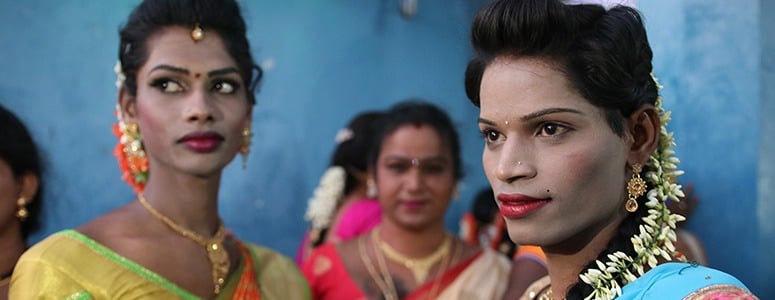
As noted, an asterisk next to the country names in the above list means that it was a former British colony. A whopping 44 of the 66 countries that have illegal same-sex relationships were once part of the British Empire. That is over 66%! This isn’t a coincidence. In almost all cases, the laws outlawing consensual gay sex were put into place under British rule and were left in place following independence.
India is an example country that has only in 2018 managed to annul Section 377, a British colonial-era law prohibiting “unnatural acts,” in order to legalize consensual gay sex. Ancient Indian literature such as the Mahabharata and Ramayana have many references to LGBTQ+ heroes including transgender warriors and two queens who made love in order for one queen to get pregnant with an heir for their kingdom. Long story short, this points to the fact that it was likely the British influence that largely led to Indian homophobia in the first place.
With this being said, all these countries have the choice and ability to update their laws. And in most cases, these former British colonies have been fully independent for half a century or more and have chosen not to change these antiquated laws. Long story short, the British influence may have brought the “sodomy” laws in the first place but the local attitudes and customs have decided to keep them .
Which are the top 50 LGBTQ+ safe countries for travelers?
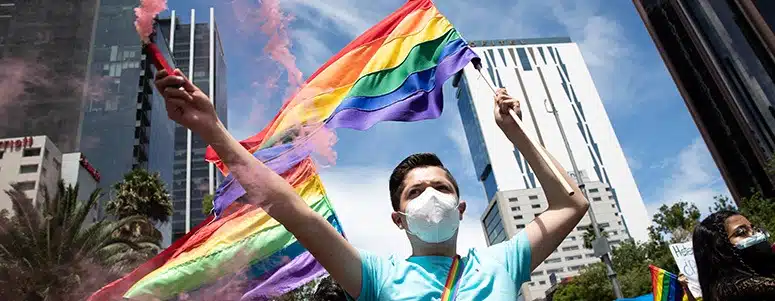
- Netherlands
- United Kingdom
- Switzerland
- South Africa
- New Zealand
- United States
- Virgin Islands
- Puerto Rico
- Czech Republic
One country might surprise you for not ranking higher on our list: the United States. One reason for that is, of course, that there is a great deal of variation in gay rights depending on the state you’re in . There are also no constitutional or broad protections for LGBTQ+ rights under federal law in the U.S. Also, in some states, LGBTQ+ youth do not have access to helpful information, with these so-called “no-promo homo” laws counting in the “propaganda/morality” category. The U.S. might have come far, but it has a long way to go in terms of LGBTQ+ rights, especially for young transgender people .
How many countries have legalized gay marriage?
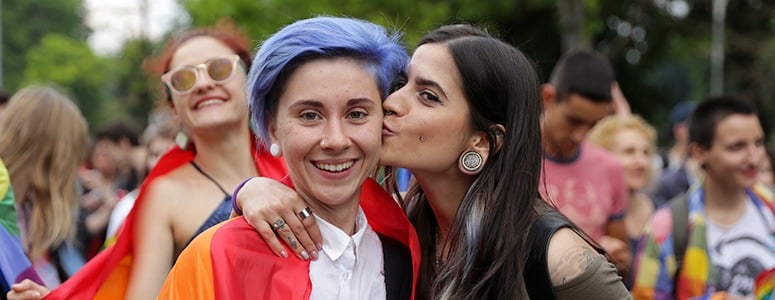
As of now, 30 countries (plus Guam, Virgin Islands, and Puerto Rico) have marriage equality, with Switzerland joining in July 2022. 15 countries recognize civil unions or partnerships. 9 countries do not allow marriage equality for their citizens but formally recognize foreign marriages.
Countries with marriage equality laws are often great spots for LGBT+ vacations, but be aware that gay travel to rural or fundamentalist communities can be problematic in almost any country — definitely don’t make assumptions when visiting smaller towns and communities.
Global transgender murder rates
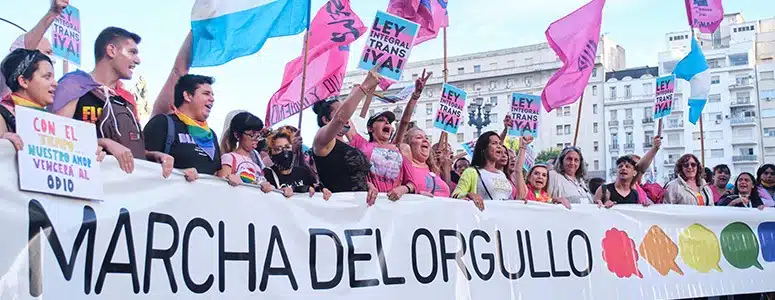
TvT (Transrespect versus Transphobia) Worldwide tracks the instances of transgender people who have been murdered around the world. As of this publishing, over 4,000 trans murders have been tracked during the past 13 years with 1,645 of those crimes taking place in Brazil alone.
Countries with the highest rates of transgender murders (per million residents):
- Honduras – 11.80
- El Salvador – 9.30
- Brazil – 8.25
- Puerto Rico – 5.64
- Belize – 5.12
- Guyana – 5.11
- Mexico – 5.09
- Colombia – 4.63
- Venezuela – 4.59
- Dominican Republic – 4.38
- Uruguay – 4.04
- Guatemala – 3.92
- Ecuador – 3.28
- Argentina – 2.52
- Fiji – 2.25
Why are 14 of these 15 countries with the highest trans murder rates located in Central and South America?
The majority of reported trans murders are currently happening within Central and South America. But why is transgender murder such a frequent occurrence in Latin America? One article from Equal Times posits that a heavily patriarchal society combined with high transgender rates of sex work may be contributing factors. As many transgender individuals are shunned by their families, they turn to sex work to survive, which carries an additional risk to their safety. It is estimated that an extremely high number of transgender individuals are living in poverty , and only an estimated 25% of trans women will complete secondary school in Latin America.
The ostracization of individuals from their families and communities is considered another major factor in the high rates of violence and murder against LGBTQ+ people within Latin America. Additionally, police are often not a source of safety, and governmental protections are not in place to support those most vulnerable.
Learn more about the plight of trans people in Latin America:
- Fighting transfemicide in the Americas
- Brazil continues to be the country with the largest number of trans people killed
- Transgender immigrants who fled Latin America still face uncertainty in the US
- Three lives, one message: Stop killing Mexico’s transgender women
What other countries might be a problem for LGBTQ+ international travelers?
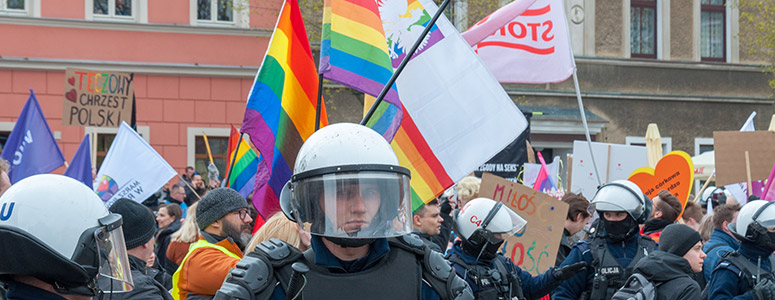
114 of the 203 countries offer at least some form of legal protection for LGBTQ+ people, but 82 of the 202 countries penalize either sexual acts, being trans, or the dissemination of information about LGBTQ+ rights. Many countries have confusing or inconsistent legislation, allowing for protections among some of the LGBTQ+ community while penalizing or harming others. This creates a grey area where it’s not quite safe to be out but not immediately threatening.
One of those countries is Japan . While LGBTQ+ representation in Japanese media has mostly been positive, and the Japanese public has consistently polled in favor of same-sex marriage, there’s a long way to go as far as legislation outside of the major cities.
But the conversation about danger is a little bit different than the question of which countries do not allow gay marriage. Japan is rarely dangerous, with 35% of locals saying Japan is a “good place” for gay people to live, while Russia frequently polls at only 9%. Countries like Armenia (at 4%), Kyrgyzstan (7%), and Mongolia (17%) all may be bad places to go as well, despite not having any formal anti-LGBTQ+ legislation that could harm travelers.
Beyond gay-marriage-illegal countries, here are some real problem places among the list of most-visited countries in the world:
- China — China’s relationship to LGBTQ+ culture is dubious to say the least. Homosexuality is no longer considered a mental disorder as of 2001, and the consensus is that homosexuality is legal and that most locals won’t care so long as you find the right bar to hang out in. At the same time, groups and events have frequently been banned, and censorship laws have frequently been used to ban LGBTQ+ content online in China. LGBTQ+ travel is possible, but only with caution and thorough research into the specific cities you’ll be visiting.
- Russia — Russia has gained increasing international infamy for the way the government treats its LGBTQ+ citizens. Activists have died or gone missing, and individuals who followed Russian gay marriage laws to the letter have been forced to flee the country . That’s ignoring the purges and torture happening in Chechnya . Rights have regressed in recent years, and travel isn’t advised, despite homosexuality being legal on paper.
- Indonesia — LGBTQ+ rights are increasingly considered to be a “moral threat” in Indonesia, with a law against pornography being used for any non-pornographic, pro-LGBTQ+ content. Meanwhile, the HIV/AIDS epidemic has only gotten worse as a result of this persecution. While it’s not illegal in the country, homosexuality could result in public humiliation and arrests nevertheless . This has become more perilous with the 2022 legislation passed that will outlaw all sex outside of marriage.
Iraq , Mozambique , and Bahrain are also examples of countries where same-sex relations are not illegal in the traditional sense but expression of LGBTQ+ sexuality has been suppressed and may still be considered “indecency” with legal consequences, depending on the circumstance.
If the country you want to visit is in one of those grey areas, consider reading more about it, talking to fellow travelers, or doing a bit more research before booking a flight.
If you don’t know whether or not the country you’re visiting will be safe, check the U.S. State Department’s write-ups for LGBTQ+ travelers . The Human Rights Watch’s country profiles are a good place to find information, too.
37 safety tips shared by four LGBTQ+ travel experts
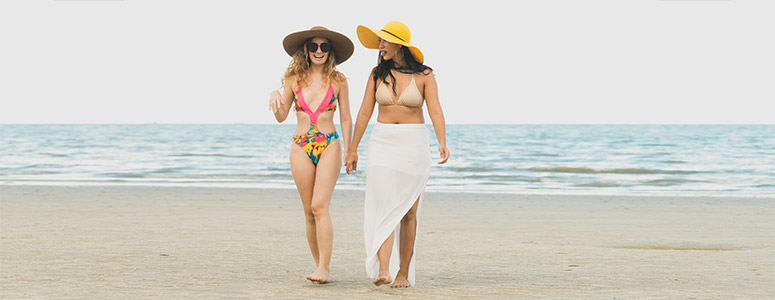
As one can plainly see, LGBTQ+ travel safety varies a great deal, from relative comfort to the real possibility of danger. We looked at the specific legal status of rights abroad as well as polling information to create our LGBTQ+ travel index, but the on-the-street experience can be much more nuanced. Because anti-LGBTQ+ crime and harassment is rarely reported, especially not on an international scale, it’s hard to find data to inform travelers of what walking the streets might be like. Beyond our list, ask other queer people and allies there before you go. Make an online friend, do your research, and take your time.
Want to get tips from our four LGBTQ+ travel experts?
Keep reading!
8 tips from a trans travel expert
Aaron Edwards, an FTM trans travel blogger, shares the following helpful tips on staying safe while traveling.
1. Remember to bring all your documents
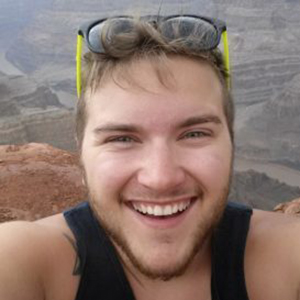
2. Research your destination thoroughly
Read up on local laws regarding LGBTQ+ people. Some places are much more restrictive than others and it is better to know your rights and not need them than to be stuck in a jail cell somewhere.
3. Knowing your next bathroom stop is must
Always know where your next bathroom stop will be or have a backup bathroom plan in case you are not comfortable with the situation.
4. Some destinations are best to avoid and travel insurance is worth it
Do your research and know which locations are best to avoid. I also recommend getting a good travel insurance plan no matter what your destination is because you never know when you might need it.
5. Have a letter from your doctor handy at the airport
If you are on HRT (hormone replacement therapy), always try to bring a doctor’s note to keep with your medication in your bag in case you have issues with airport security.
6. You will probably be questioned
Brace yourself to be questioned. A lot of cultures are known for their bluntness. Even people who pass extremely well can get stopped and asked questions based on documents, appearance, etc.
7. If possible, travel with a friend or a group
When in doubt, be with people. There is safety in numbers, especially if they are your friends and people who will stand up for you if it is needed. This applies whether you’re on a camping trip , staying at Airbnbs or at regular hotels.
8. Network via LGBTQ+ Facebook groups
Join transgender or LGBTQ+ related Facebook groups. It is an easy way to find other trans people who LIVE where you are traveling. They can give you their personal experiences, ideas of places to go, or even offer to hang out with you and give you a local tour.
12 travel safety tips from a gay couple
Derek and Mike are an American couple living in Europe and are the authors of Robe Trotting . They have written the following useful tips.
1. Check out Misterbnb

2. Bring copies of your important documents
All travelers should carry backup copies of their passport and other personal information, but there are some extra considerations that LGBTQ+ travelers should consider. It isn’t fun to think about, but Healthcare Power of Attorney and Hospital Visitation Authorization documents are essential. This is because domestic partnership and same-sex marriage laws differ widely around the world. We carry these documents on a flash drive and our attorney has prepared laminated wallet-sized Hospital Visitation Authorizations. This is something we hope to never use, but we feel better having when we travel. A neck wallet can be a great way to carry your most important documents including your passport etc.
3. Know your rights
Transgender and gender non-conforming travelers face higher levels of marginalization than other “LGB” travelers. For trans and gender non-conforming travelers, it’s important to know your rights, especially in airports. There are legal protections in the EU, UK, and USA to protect trans and gender non-conforming air travelers. Do some additional research when traveling outside of America, the UK, and Europe. In this travel zone, here are a few tips and expectations.
4. Select the gender that appears on your Government ID
When booking tickets, indicate the gender that appears on your government-issued identification. Sometimes this is different than the gender you present, but the legal requirement is only for the names on your ID and travel documents to match. You should never be questioned or forced to further prove your gender based on your gender presentation.
5. Pat-downs are based on the gender you present, not your ID
If a security pat-down is required, it must be completed by security personnel of the same sex as the passenger. In a pat-down situation, it will be based on the gender that the passenger presents and not their government-issued ID.
6. Body scanners don’t actually show your body
For trans and non-binary travelers worried about body scanners, the countries mentioned do not display the actual scan of your body to security personnel. In fact, all passenger images are displayed as generic body forms on the screens visible to staff. The screen does identify areas that should be screened more closely, but it uses a generic body form. For example, there would be a highlighted box around the midsection of the form if a traveler forgets to remove their belt. It does not show any details of the body or anatomy.
7. Wearing a prosthetic device or binder can lead to further questioning
Trans and non-binary travelers should be prepared for additional questioning if wearing prosthetic devices or binders. These travelers are not required to show, remove or lift clothing to reveal these devices. Simply answer any questions in a straight-forward manner and speak to a supervisor if any of those described situations should arise.
8. Consider LGBTQ+ tours
We all find safety in numbers, so consider LGBTQ+ tours that will specialize in gay travel. Similarly, consider booking a traditional tour company where you will have a local guide who is familiar with customs, speaks the language, and can advise you on how to stay safe while exploring the world. Many tour companies display their credentials in serving the LGBTQ+ community on their websites. You can also contact their customer service staff with additional concerns or specific questions on travel to certain destinations.
9. Know the local laws in the country you plan to visit
Do some research on the laws that exist in each country you plan to visit. Specifically, look up how often they’re enforced and when the laws were written. For example in Africa, many laws are left-over colonial-era codes that were put in place by other powers and are not enforced or are selectively enforced. For example, Morocco only sporadically enforces its anti-LGBTQ+ law and does not enforce it in resort towns like Marrakech . It’s mostly a law that still exists because of Islamic morality. Morocco even has an LGBTQ+ rights group and is largely viewed as tolerant. Some nations, like Uganda, are actively creating and expanding laws that target the LGBTQ+ community with penalties of death. Make a distinction between countries like Morocco and Uganda when considering your travels.
10. Remember to enjoy the local historic sites and cuisines
Focus on what you can do, and not what you can’t. Many countries will have a less visible LGBTQ+ community and social scene. Sometimes, this can be a blessing in disguise because it frees up your trip for other meaningful activities. Travel should be more than gay bars and nightclubs. Focus on what you can do like touring historic sites, visiting museums and trying new cuisines. It can be tough for a couple to resist public displays of affection, but no laws will be able to keep you from building travel memories, and you can make it up with extra private displays of affection.
11. Be careful with the location feature of dating apps
On gay apps like Grindr and Scruff, turn off the location feature. Even in countries where your rights are protected, gay-bashing can be an issue. In the Ukraine, for example, the “how far away” location feature is disabled nation-wide because of past incidents. Still, there is a thriving gay culture and plenty of gay locals. Always exercise caution and meet strangers in public spaces.
12. Always be culturally aware
Be culturally aware when you’re traveling anywhere. In many nations, public displays of affection from any couple, same or differing sex, are a taboo. Comply with these customs without feeling singled out. It may still be upsetting, but know that different-sex couples are also conforming their behavior to local norms. Similarly, some conservative destinations will have different norms on appearance and dress. It can be triggering to change your appearance, clothing, mannerisms, and behavior if you are LGBTQ+. Previous life experiences like bullying can bring up tough emotions but know that it’s most often local customs and not bigotry that require cultural conformity. I realize that for some individuals that will be easier than for others. My advice comes from a point of privilege as a masculine cis-gendered male, but I truly feel that certain sacrifices are worth it to travel.
9 safety tips from a traveling lesbian couple
Meg Ten Eyck is the creator of EveryQueer.com which is a website dedicated to inspiring and equipping LGBTQ+ travelers to live a life of adventures. She shared the following tips.
1. Cisgender people will most likely have fewer issues

2. Respect local customs
Be aware of local gender expectations. Are women supposed to be covered, wear headscarves or avoid certain activities? Try to respect local customs and blend in as much as possible.
3. Have someone you trust know your itinerary
Be sure to leave your itinerary and contact information with someone you trust. It’s always a good idea to have someone back home who has an idea of what you’re up to and where you plan on heading. It doesn’t have to be a minute-to-minute breakdown, contact information of hotels and flight numbers will work just fine.
4. Find LGBTQ+ friendly businesses before you leave
Consider using the International Gay and Lesbian Travel Association as a resource for finding LGBTQ+ owned and affirming businesses in countries where you may have more concerns. Knowing that a business is owned by LGBTQ+ people or specifically seeks out LGBTQ+ accreditation may offer some peace of mind.
5. Be careful with PDA’s in certain countries
Be mindful of public displays of affection, in some locations like Russia or Morocco, mundane actions like holding hands, requesting a double bed at a hotel, casual touching, and kissing can be considered public displays. In some countries these actions are illegal and the consequences can be anything from a fine to imprisonment to being punishable by death. Not to be overly sensationalist here, there are lots of people who have traveled in anti-LGBTQ+ countries and have been just fine. There are also people who have not. It’s a case-by-case situation.
6. Be sure that sex toys are legal
In some countries, traveling with sexually explicit material can be used as evidence of sex work which may result in you being detained while traveling. Transgender and gender-nonconforming people are often unfairly targeted, be aware that in recent years there have been a few instances where people have used sex toys to victimize LGBTQ+ travelers. One couple was the victim of an alleged hate crime by TSA agents and another couple was arrested in Malaysia for being in possession of a sex toy. Keep in mind that traveling with these items into some countries is illegal. Be very cautious and do your homework before crossing borders with anything you think could be questionable.
7. Consider who you disclose your identity to
Consider who you disclose your identity to while you are traveling in countries that are not as LGBTQ-affirming as your home country.
8. Walk with confidence
Appear confident while walking in public areas. The more afraid and buckled over you look, the more of a target you’ll appear to be.
9. Invest in your personal safety
When in doubt invest in personal safety, if taking the more expensive cab ride over the bus ride seems like the safer option for you, do it.
8 tips from a gay travel expert
Andrew Dobson runs Dobbernationloves , an LGBTQ+ travel blog based in Toronto and shares these very helpful tips on international travel safety.
1. Take precautions with dating apps

2. Use the geo search to research your destination prior to leaving home
Use the geo-search feature on dating apps like Scruff and Grindr before you depart for your trip. You can ask locals about what the most popular gay bars and businesses are before you even arrive. Many destinations have suffered from gay bar closures so weekly or monthly LGBTQ+ parties are the norm and locals are always in the know.
3. Connect with the locals before you arrive
Use gay dating apps to connect with locals before you arrive and you’ll find friendly folks keen to show a tourist around. This is particularly helpful if you’re visiting a country like Germany where bartenders may not speak English.
4. Keep spots you discover confidential in sensitive destinations
If you’re visiting places like Egypt or Jordan where the LGBTQ+ community is largely underground for safety reasons, be sure to keep the spots you discover confidential to protect the local LGBTQ+ community. Posting about a popular gay coffee shop hangout in Cairo on TripAdvisor, for example, is a no-no.
5. Negative LGBTQ+ laws may not reflect tourist areas
Remember that just because a country’s government may have negative LGBTQ+ policies, doesn’t mean it isn’t a great gay holiday destination. The Maldives, for example, has laws in place for locals but during our visit to the Four Seasons Maldives, a majority of the guests at the resort were gay couples. Research the hotel and resort brands you’re planning on staying with before you book to ensure they are LGBTQ+ friendly.
6. Certain regions may be very LGBTQ+ friendly within a conservative country
Indonesia is the largest known as a conservative Muslim country but ironically the island of Bali is considered to be one of the best LGBTQ+ destinations in Asia. There can be significant tolerance differences based on each region you visit. Many hotels host luxurious gay honeymoons in Bali
7. Do your research on festival dates
Research the annual LGBTQ+ festivals to determine when the destination is likely to offer the most fun on holiday. In North America, we’re familiar with Pride parades but in Europe, the annual festival is referred to as CSD Celebrations or Christopher Street Day. LGBTQ+ festivals vary based on the culture of a place and its people. North American and Europe are known for flashy parades and all-night parties, where some smaller towns or more reserved countries focus on political protest, poetry readings or events centered around theatre and film.
Contact your hotel ahead of time
If you’re traveling with a same-sex friend or partner we always suggest contacting your hotel in advance to confirm what sort of bedding they offer. In some countries, two men will always be booked into a room with separate beds. In other countries, they’re happy to provide one bed for two men but you’d have to specify that in advance as they’ll automatically assume you’re traveling friends.
Why we wrote this article & did this study
Lyric grew up in Hollywood surrounded by actors, producers, and what she thought was a very open and accepting community for LGBTQ+ individuals. It wasn’t until she was 13 when she overheard her Uncle explaining that he was concerned he would be fired from an acting job if they found out he was gay, that she realized even one of the most liberal US communities was still plagued with homophobia.
Since then, LGBTQ+ rights have been at the forefront of Lyric’s awareness. She wondered how safe the US was for the LGBTQ+ community vs the rest of the world after hearing stories from other travelers. We then decided to dive deep into the subject and what we found was shocking.
So many questions entered our minds. For example, “Is it safe to travel to countries where the death penalty or life imprisonment is still a sentence for being openly gay?”
As travel journalists, we wanted to help the LGBTQ+ community educate themselves on the very complex and layered world of staying safe during international travel. But also, to try to bring more awareness to the often horrific treatment of LGBTQ+ people in many parts of the world. And hopefully, this will bring about change, acceptance, and love for all people regardless of their orientation.
How can you help bring about change?
Are you an ally and upset by this information? Here are two obvious ways you can help:
1. Share this article. Bringing awareness to a problem is the first step to fixing it. Share it on social media, send it to your loved ones and anyone you think should see it.
2. Consider donating to organizations that are making a difference. For example, the International Lesbian, Gay, Bisexual, Trans, and Intersex Association or Human Rights Watch are organizations working to help find and report these issues and to help make the whole world — not just a piece of it — safer for LGBTQ+ people.
- Recognition of same-sex relationships 2020 – Human Rights Watch
- LGBTQ+ Worker Protections 2020 – ILGA
- Anti Discrimination Laws 2020 – ILGA
- Criminalization of Hate-Based Violence 2020 – ILGA
- Adoption Recognition 2020 – ILGA
- Gallup World Poll (2020 Data)
- Transgender Rights – Wikipedia
- Transgender Murder Monitoring – TvT
- Global Anti-LGBTQ+ Laws 2020 – Human Rights Watch
- Equaldex: The Collaborative LGBT Rights Knowledge Base
You may also like…
We believe knowing what to pack for any trip can improve your enjoyment and safety while abroad. Below are some of our most popular packing lists (shown alphabetically):
Africa | Alaska | Arizona | Aruba | Baby Travel Gear | Bahamas | Beach | Belize | Cabo San Lucas | Camping | Cancun | Colorado | Cruise | Day Hike | Disney | Dominican Republic | Dubai | Flight | Florida | Glacier NP | Grand Canyon NP | Hawaii | Jamaica | Kauai | Key West | Las Vegas | Maui | Miami | Moab | New York | Puerto Vallarta | Punta Cana | Theme Park Trip | Two Week Trip | Yellowstone NP | Yosemite NP | Zion NP
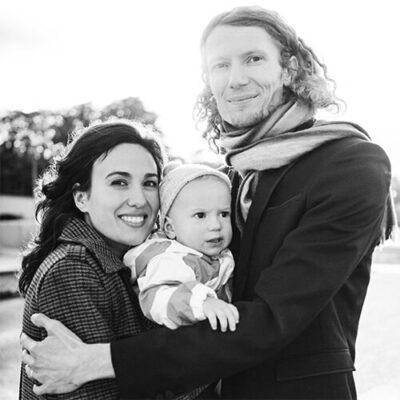
We’ll never email more than once per month.

Call Us: 305-672-9779
The LGBTQ+ Guide to Safe and Welcoming Travel in Africa
by Craig Smith | Jun 7, 2023 | Africa , Blog

Africa is an incredibly diverse continent, rich in culture, history, and breathtaking landscapes. However, when it comes to LGBTQ+ rights and acceptance, the picture is not uniform across the continent. This raises concerns about the safety of LGBTQ+ travelers in Africa .
LGBTQ+ travelers can have diverse experiences throughout Africa by choosing tour operators that prioritize LGBTQ+ inclusivity. With the right planning and accommodations, LGBTQ+ travelers can explore the captivating landscapes, vibrant cultures, and rich histories that Africa has to offer while feeling welcomed and respected.

By selecting LGBTQ+ friendly accommodations, travelers can find comfort and support during their journey. It is also essential to exercise discretion and respect local customs and traditions, especially in countries where LGBTQ+ rights may still be developing. In this blog post, we will explore the legal and social landscapes in various African countries, provide tips on choosing a safe destination, and offer resources and inspiring stories to guide and encourage LGBTQ+ travelers in Africa.
Legal Status of LGBTQ+ Rights in Africa
Understanding the legal situation for LGBTQ+ individuals in Africa is crucial for ensuring a safe and enjoyable trip. While some countries have progressive LGBTQ+ laws and protections, others enforce harsh anti-LGBTQ+ laws and penalties.
Countries with relatively progressive LGBTQ+ laws and protections:
- South Africa : As the first African country to legalize same-sex marriage in 2006, South Africa has robust legal protections for LGBTQ+ individuals. Discrimination based on sexual orientation is also prohibited by its constitution.
- Botswana : In November 2019, the Botswana Court of Appeal upheld a lower court decision to decriminalize consensual same-sex conduct, declaring the colonial-era penal code provisions unconstitutional.
- Mozambique decriminalized same-sex sexual activity in 2011, and the country has a non-discrimination law that protects LGBTQ+ people from discrimination in employment, education, and housing.
- Seychelles : Same-sex sexual activity is legal in Seychelles, and the country has a non-discrimination law that protects LGBTQ+ people from discrimination in employment, education, and housing.
- Angola’s new penal code , effective since January 2021, no longer criminalizes same-sex conduct and includes a non-discrimination provision protecting sexual orientation.
- Namibia decriminalized same-sex sexual activity in 2008, and the country has a non-discrimination law that protects LGBTQ+ people from discrimination in employment, education, and housing.
It is important to note that the legal status of LGBTQ+ rights in Africa is constantly changing. Some countries may have progressive laws on the books, but LGBTQ+ people may still face discrimination and violence in practice. It is also important to remember that the legal status of LGBTQ+ rights can change rapidly.
In recent years, there have been a number of positive developments in the legal status of LGBTQ+ rights in Africa. However, there have also been a number of setbacks. It is important to stay informed about the latest developments in this area.
Popular Destinations in Africa for LGBTQ+ Travelers
These destinations offer a combination of luxury accommodations, breathtaking scenery, and unique wildlife experiences, ensuring a memorable trip for LGBTQ+ travelers.
- Nairobi, Kenya: The Hemingway House Nairobi is a luxury boutique hotel known for its spacious suites and private balconies with stunning views of the Ngong Hills. It provides a serene and comfortable stay in a quiet residential area.
- Laikipia Plains, Kenya: Elewana Loisaba Tented Camp is an award-winning luxury camp situated on the edge of an escarpment, offering breathtaking views of the Laikipia landscape and Mount Kenya. Guests can enjoy a range of activities, including game drives, horseback riding, camel trekking, guided bush walks, and mountain biking.
- Masai Mara, Kenya: Angama Mara is an owner-run lodge perched high above the Great Rift Valley, providing panoramic views of the Masai Mara . Their luxurious tented suites feature floor-to-ceiling glass windows, allowing guests to immerse themselves in the natural beauty surrounding them. Activities in the area include game drives, hot air ballooning, walking safaris, and visits to Maasai villages.

- Kigali, Rwanda: The Marriott Kigali Hotel is located in Rwanda’s capital city, offering a convenient base to explore the vibrant culture and history of Kigali. Visitors can visit the Kigali Genocide Memorial, explore local markets, and experience the lively atmosphere of the city.
- Volcanoes National Park, Rwanda: Bisate Lodge, located adjacent to Volcanoes National Park , is a luxurious and eco-sensitive safari lodge. With only six opulent Forest Villas, it provides an intimate and exclusive experience. Guests can embark on gorilla treks to encounter these magnificent creatures and participate in reforestation and community partnership initiatives.
Splendors of Morocco
Morocco is a beautiful country with a lot to offer visitors, including its rich history, culture, and stunning scenery. LGBTQ+ travelers can have safe and welcoming experiences in Morocco by choosing tour operators that prioritize LGBTQ+ inclusivity. With LGBTQ+ friendly accommodations , cruises, and guides, you can explore Morocco’s beauty and cultural heritage while feeling respected.
The travel industry in Morocco is evolving to create a safer and more accepting environment for LGBTQ+ travelers. Plan thoughtfully, respect local customs, and enjoy a luxurious experience while prioritizing your safety.

Treasures of Egypt
Egypt offers a mesmerizing landscape and an array of exquisite attractions, making it an alluring destination for luxury LGBTQ+ travelers. While Egypt has undeniable allure, it’s worth noting that the country’s LGBTQ+ inclusivity may be a concern for some.
LGBTQ+ travelers can enjoy safe and welcoming experiences in Egypt by partnering with tour operators that have established connections with LGBTQ+ friendly hotels, cruises, and guides. With the right tour operator and accommodations, LGBTQ+ travelers can embark on a memorable journey through Egypt, embracing its beauty and cultural heritage while feeling welcomed and respected
The travel industry in Egypt is evolving, with more establishments becoming LGBTQ+ friendly, contributing to a safer and more accepting environment for LGBTQ+ travelers. With careful planning and consideration, LGBTQ+ travelers can still enjoy Egypt’s captivating wonders while prioritizing their safety and comfort. By collaborating with LGBTQ+ friendly travel services and embracing cultural sensitivity, you can enhance your luxury travel experience in this enchanting destination.

Mortuary Temple of Queen Hatshepsut. West Bank, Luxor, Nile Valley, Egypt
It is important to note that these are just a few resources that may be helpful for gay and lesbian travelers to Egypt. There are many other resources available, and it is important to do your own research to find the ones that are most helpful for you.
Travel Tips for LGBTQ+ Travelers in Africa
Being culturally sensitive and respecting local customs is vital for all travelers, but especially for LGBTQ+ individuals in Africa. Here are some suggestions for staying safe and avoiding potential risks:
- To ensure personal safety, it is advisable to exercise caution and avoid using location-based dating apps such as Grindr or Scruff. This precaution helps mitigate potential risks and ensures a more secure travel experience.
- Embrace Cultural Sensitivity and Respect Locals: When traveling to Africa, it is crucial to respect the diverse cultural practices and customs that you may encounter. This includes dressing modestly, avoiding public displays of affection, and being mindful of local social norms. Researching the cultural and social expectations of the countries you plan to visit will help you navigate these nuances with sensitivity and respect.
- Staying Safe and Avoiding Potential Risks: To minimize risks, it is essential to research the legal landscape and societal attitudes towards LGBTQ+ individuals in the countries you plan to visit. Exercise caution when discussing your sexual orientation or gender identity with strangers, especially in countries where LGBTQ+ rights are not well-protected
- Communication and Collaboration with Fellow LGBTQ+ Travelers and Allies: Stay connected with fellow LGBTQ+ travelers.

- Know Your Rights and Seek Help When Needed: Familiarize yourself with your rights in each country you visit and be prepared to seek help if necessary. This might include contacting your country’s embassy or consulate or reaching out to local LGBTQ+ organizations for assistance.
- Prioritize Your Well-Being and Self-Care: Traveling can be physically and emotionally demanding, especially when navigating complex social and legal environments. Prioritize self-care by ensuring you get enough rest, maintaining a healthy diet, and engaging in activities that bring you joy and relaxation.
Resources and Support for LGBTQ+ Travelers in Africa
Several international organizations provide resources and support for LGBTQ+ travelers worldwide, including those visiting Africa. Some of these organizations include:
- International Gay and Lesbian Travel Association (IGLTA): IGLTA is a global organization dedicated to promoting LGBTQ+ travel and tourism. They provide a wealth of information, including LGBT-friendly accommodations, travel agents, and tour operators in various African countries. Website: https://www.iglta.org/
- OutRight Action International: This organization advocates for LGBTQ+ rights worldwide and offers valuable resources and information for LGBTQ+ travelers, including country-specific data on LGBTQ+ rights and safety. Website: https://outrightinternational.org/
Country-Specific LGBTQ+ Organizations and Support Networks
Many African countries have local organizations dedicated to supporting and advocating for the LGBTQ+ community. These organizations can provide valuable insights and resources for LGBTQ+ travelers. Some examples include:
- South Africa: The Triangle Project offers support services, advocacy, and resources for the LGBTQ+ community in South Africa. They also provide information on LGBT-friendly accommodations and events. Website: https://triangle.org.za/
- Kenya : The Gay and Lesbian Coalition of Kenya (GALCK) is a coalition of organizations advocating for LGBTQ+ rights and providing support services. They can be a valuable resource for LGBTQ+ travelers seeking information on local events, safe spaces, and support services. Website: https://www.galck.org/
- Gay Egypt: Gay Egypt is a website for gay and lesbian travelers to Egypt. The website has information about gay-friendly hotels, restaurants, and bars in Egypt.
Start Your Unforgettable LGBTQ+ Travel Experience in Africa
Africa offers a range of luxury destinations and accommodations that cater to LGBTQ+ travelers. Countries like South Africa, Botswana, Mozambique, and the Seychelles have progressive laws and protections for LGBTQ+ individuals. However, it’s important to consider the legal and social landscape of each destination, as some countries have harsh anti-LGBTQ+ laws and social stigmas. Nairobi, Egypt , Laikipia Plains, and Masai Mara in Kenya, as well as Morocco , Kigali, and Volcanoes National Park in Rwanda, are popular luxury gay-friendly destinations in Africa. It’s crucial to be culturally sensitive, respect local customs, and prioritize safety while traveling. Connecting with LGBTQ+ travel organizations, online forums, and social media groups can provide additional resources and support for LGBTQ+ travelers in Africa.

Craig Smith
Privacy overview.
- Equality Index
Public Opinion
- âï¸ Rate Your Region NEW
- Organizations
- Editor Dashboard
- Login / Join
LGBT Rights in Egypt
Recent studies in Egypt indicate societal resistance to LGBTQ+ rights.
Acceptance of homosexuals as neighbors (2022)
Support for same-sex marriage (2016), support for same-sex marriage (2014), "should society accept homosexuality" (2013), justifiability of homosexuality (2004), acceptance of homosexuals as neighbors (2004), homosexual activity in egypt.
Homosexual activity in Egypt is ambiguous.
Same-sex marriage in Egypt
Same-sex marriage in Egypt is not legal.
Censorship of LGBT Issues in Egypt
Censorship of LGBT Issues in Egypt is imprisonment as punishment.
Right to change legal gender in Egypt
Right to change legal gender in Egypt is legal, but requires surgery.
Legal recognition of non-binary gender in Egypt
Legal recognition of non-binary gender in Egypt is not legally recognized.
LGBT discrimination in Egypt
LGBT discrimination in Egypt is no protections.
LGBT employment discrimination in Egypt
LGBT employment discrimination in Egypt is no protections.
LGBT housing discrimination in Egypt
LGBT housing discrimination in Egypt is no protections.
Same-sex adoption in Egypt
Same-sex adoption in Egypt is illegal.
Serving openly in military in Egypt
Serving openly in military in Egypt is illegal.
Blood donations by MSMs in Egypt
Blood donations by MSMs in Egypt is banned (indefinite deferral).
Conversion therapy in Egypt
Conversion therapy in Egypt is not banned.
Equal age of consent in Egypt
Equal age of consent in Egypt is n/a.
LGBT Rights by Governorate
View the LGBT laws in each individual governorate of Egypt.
- Ad Daqahliyah
- Al Bahr al Ahmar
- Al Buhayrah
- Al Gharbiyah
- Al Iskandariyah
- Al IsmÄ`Ä«lÄ«yah
- Al Minufiyah
- Al Qalyubiyah
- Al Wadi al Jadid
- Ash Sharqiyah
- Bani Suwayf
- Janub Sina'
- Kafr ash Shaykh
- Shamal Sina'
- As SÄdis min UktÅ«bar (governorate)
- ḨulwÄn (governorate)
Equality Rank
- #174 Zambia 13
- #175 Tanzania 12
- #176 Sudan 12
- #177 Egypt 11
- #178 Morocco 11
- #179 Senegal 11
- #180 Libya 11
Top Contributors
- vviet93 5 contributions
- Ausyk 3 contributions
- Antinousosiris 1 contribution
- DuffdeNecker 1 contribution
- Mohamed_ElGohary 1 contribution
Egypt LGBT Organizations
Share region.
Compare Egypt

Compare with Algeria

Compare with Libya

Compare with Morocco

Compare with South Sudan

Compare with Sudan

Compare with Tunisia

Compare with Western Sahara
Lgbt rights in northern africa, lgbt rights in algeria, lgbt rights in libya, lgbt rights in morocco, lgbt rights in south sudan, lgbt rights in sudan, lgbt rights in tunisia, lgbt rights in western sahara.
Situation in Haiti March 29, 2024
U.s. citizens in haiti, update january 10, 2024, information for u.s. citizens in the middle east.
- Travel Advisories |
- Contact Us |
- MyTravelGov |
Find U.S. Embassies & Consulates
Travel.state.gov, congressional liaison, special issuance agency, u.s. passports, international travel, intercountry adoption, international parental child abduction, records and authentications, popular links, travel advisories, mytravelgov, stay connected, legal resources, legal information, info for u.s. law enforcement, replace or certify documents.
Before You Go
Learn About Your Destination
While Abroad
Emergencies
Share this page:
Travel Advisory July 13, 2023
Egypt - level 3: reconsider travel.
Reissued with obsolete COVID-19 page links removed.
Reconsider travel to Egypt due to terrorism . Exercise increased caution in Egypt due to the Embassy’s limited ability to assist dual national U.S.-Egyptian citizens who are arrested or detained.
Do not travel to:
- The Sinai Peninsula (with the exception of travel to Sharm El-Sheikh by air) due to terrorism .
- The Western Desert due to terrorism .
- Egyptian border areas due to military zones .
Country Summary: Terrorist groups continue plotting attacks in Egypt. Terrorists may attack with little or no warning, and have targeted diplomatic facilities, tourist locations, transportation hubs, markets/shopping malls, western businesses, restaurants, resorts, and local government facilities. Terrorists have conducted attacks in urban areas, including in Cairo, despite the heavy security presence. Terrorists have targeted religious sites, to include mosques, churches, monasteries, and buses traveling to these locations.
Due to risks to civil aviation operating within or in the vicinity of Egypt, the Federal Aviation Administration (FAA) has issued a Notice to Air Missions (NOTAM) and/or a Special Federal Aviation Regulation (SFAR). For more information U.S. citizens should consult the Federal Aviation Administration’s Prohibitions, Restrictions and Notices .
Local law prohibits protesting or demonstrating without a permit. Being near anti-government protests can draw scrutiny from Egyptian police and security forces. U.S. citizens have been detained for participating in protests and for posting content on social media perceived as critical of Egypt or its allies.
The U.S. Embassy may have a limited ability to provide consular services to dual U.S.-Egyptian citizens. Egyptian law considers dual citizens to be Egyptian citizens.
Read the country information page for additional information on travel to Egypt.
If you decide to travel to Egypt:
- Stay alert in locations frequented by Westerners.
- Avoid demonstrations and crowds.
- Obtain comprehensive medical insurance that includes medical evacuation.
- Enroll in the Smart Traveler Enrollment Program (STEP) to receive Alerts and make it easier to locate you in an emergency.
- Follow the Department of State on Facebook and Twitter .
- Review the Country Security Report for Egypt.
- Visit the CDC page for the latest Travel Health Information related to your travel.
- Prepare a contingency plan for emergency situations. Review the Traveler’s Checklist .
Sinai Peninsula – Level 4: Do Not Travel The Sinai Peninsula remains a particularly dangerous area, with frequent attacks on security forces and civilians.
The U.S. government has limited ability to provide emergency services to U.S. citizens anywhere in the Sinai Peninsula as U.S. government employees are not authorized to travel to these areas (with the exception of the beach resort of Sharm El-Sheikh; travel to Sharm El-Sheikh is only permitted by air). Visit our website for Travel to High-Risk Areas .
Embassy Messages
View Alerts and Messages Archive
Quick Facts
Must have six months validity
At least one blank page
Less than $10,000
Embassies and Consulates
U.s. embassy cairo.
Consular Section 5 Tawfik Diab Street Garden City, Cairo Egypt Telephone: +(20) 2-2797-3300 Emergency After-Hours Telephone: +(20) 2-2797-3300 Fax: +(20) 2-2797-2472 Email: [email protected] Facebook
The American Citizens Services (ACS) Unit uses an online appointment system for those coming to the Embassy to receive routine consular services Sunday through Wednesday, except for official holidays (U.S. and Egyptian). U.S. citizens with non-emergency inquiries may send an email to the ACS Unit at [email protected] .
For emergencies during and after business hours, including on weekends and holidays, U.S. citizens can contact the ACS Unit via the Embassy switchboard at 02-2797-3300. The mailing address from the United States is: Consular Section, Unit 64900, Box 15, APO AE 09839-4900. Within Egypt or from a third country, it is 8 Kamal el-Din Salah Street, Garden City, Cairo, Egypt. Express mail services also use the physical address.
Destination Description
Learn about the U.S. relationship to countries around the world.
Entry, Exit and Visa Requirements
Passport and Visas:
- U.S. citizens must have a visa to enter Egypt.
- U.S. citizens can obtain a renewable single-entry 30-day tourist visa on arrival at Egyptian airports for a 25 USD fee. A multiple entry visa is also obtainable for 60 USD.
- The Government of Egypt has created a website for the issuance of “ e-visas .” There are other websites purporting to offer electronic visas, some of which reportedly charge double the official price, but this is the only official Government of Egypt portal for this service. U.S. citizens and the citizens of 44 other countries are eligible to apply through this means in advance of their travel.
- Egyptian immigration officials occasionally have denied entry to travelers without explanation.
- U.S. citizens who have experienced difficulty with their visa status in Egypt or are concerned about their eligibility for a visa upon arrival should apply for a visa at an Egyptian embassy or consulate prior to travel, but a visa obtained prior to entry does not guarantee admission to Egypt.
- Visas for gainful employment or study in Egypt must be obtained prior to travel.
Entry from Israel:
- U.S. citizens arriving from Israel at the Taba border crossing should obtain a visa ahead of time.
- If travelers do not obtain a visa prior to arrival, they may either apply for a no-fee, 14-day visa that is only valid for travel within the Sinai Peninsula, or they may obtain a 30-day tourist visa valid for travel throughout Egypt for 25 USD.
- The 30-day visa requires the submission of a travel agency support letter that may be obtained from travel agents at the border; their fees for providing this service vary.
- The Government of Egypt opens this border on an infrequent and unpredictable basis.
- Travel groups and/or humanitarian aid convoys that wish to cross at Rafah would need to contact the Egyptian Embassy in Washington for permission prior to travel.
- The Egyptian government screens travelers before allowing entry/exit through the Rafah border crossing with Gaza.
- The U.S. government advises its citizens to avoid travel to Gaza; the U.S. Embassy does not issue travel letters or provide any assistance in crossing to and from Gaza.
- Travelers to Gaza from Egypt should read the Travel Advisory for Israel, the West Bank, and Gaza and are reminded the Sinai Peninsula remains a particularly dangerous area, with frequent Islamic State of Iraq and ash-Sham (ISIS) attacks on security forces and civilians.
Diplomatic and Official Passports:
- Diplomatic and Official passport holders, when entering Egypt for official business, are required to have visas before arrival in Egypt.
- Diplomatic or Official passport holders must not use these passports to enter Egypt for unofficial travel, and should use their personal passports, following all appropriate regulations.
- Travelers attempting to enter Egypt with diplomatic or official passports who do not have visas will be denied entry and required to remain in the airport transit area, at their own expense, until their immediate departure from Egypt can be arranged.
- The U.S. Embassy in Cairo is unable to intervene in such situations. Military personnel arriving on commercial flights are not exempt from passport and visa requirements.
- The Egyptian Embassy in Washington currently requires at least three weeks, and sometimes much longer, to process official and diplomatic visa requests, an expedite letter from the Department of State notwithstanding.
- It is incumbent upon all official travelers to submit their visa requests and passports to the Egyptian Embassy well in advance of travel.
Work Permits:
- U.S. citizens who wish to come to Egypt for work must obtain work permits and work/business visas before arrival.
- All work permits must be obtained through the employer. These permits may be acquired from the Ministry of Manpower and Migration offices in the district of the employer; accordingly, these permits authorize residency in the country.
- U.S. citizens who arrive as tourists but want to change their status after arrival in country may acquire a three-month tourist/non-working residency visa to allow sufficient time to change their status from tourist to worker.
- U.S. citizens in Egypt on tourist visas are not permitted to work.
For additional information on entering Egypt, please contact the nearest Egyptian Embassy or Consulate.
Medical Requirements:
- U.S. citizens arriving from an area that has been infected with yellow fever will need to provide proof of immunizations.
- Please verify this information with the Egyptian Embassy before you travel.
Exit Requirements:
- U.S. citizen women married to Egyptians do not need their spouse's permission to depart Egypt as long as they have a valid Egyptian visa or valid Egyptian passport.
- A U.S. citizen departing Egypt with a dual-national child (U.S.-Egyptian) may be required by Egyptian immigration officers at the airport to demonstrate that they have proof of consent of the non-traveling Egyptian parent.
- If travelers attempt to depart Egypt after the expiration of their visa, they may be required to pay a fine at the airport. Travelers should ensure that they arrive to the airport early with sufficient Egyptian currency to pay any fines.
- The U.S. Embassy does not issue travel letters to exit Egypt.
Dual Nationals:
- If a dual national has the annotation “Egyptian origin” on their entry visa, they will require proof of Egyptian citizenship in order to exit Egypt.
- This is also true for dual nationals who remain in Egypt for more than six months.
- In some cases, if a dual national loses their U.S. passport, they will be required to present their parents’ Egyptian birth certificates and be documented as Egyptian citizens in order to obtain a temporary/replacement entry stamp to facilitate their travel out of Egypt.
- Male U.S. citizens who also hold Egyptian nationality, between 18-40 years old, who have stayed in Egypt more than 180 days, are required to finalize their Egyptian military status before departure, or risk being refused departure from Egypt by Egyptian Immigration officials. The U.S. Embassy is unable to intervene in these situations. For more information see: https://tagned.mod.gov.eg/ .
Find information on dual nationality , prevention of international child abduction and customs regulations on our websites.
Safety and Security
The Department of State Travel Advisory warns U.S. citizens to avoid travel to the Sinai Peninsula (with the exception of travel to Sharm El-Sheikh by air) and the Western Desert. Travel to the Libyan and Sudanese borders is also not recommended. U.S. citizens in Egypt should maintain a high level of vigilance throughout the country due to the threat of terrorism.
Between December 2018 and May 2019, terrorist incidents in tourist areas in greater Cairo killed four tourists and wounded at least 18 others. Terrorists may attack with little or no warning, and have targeted diplomatic facilities, tourist locations, transportation hubs, markets/shopping malls, western businesses, resorts, and local government facilities. There is a possibility of terrorist attacks in urban areas, including in Cairo, despite the heavy security presence. In August 2019, a car bomb explosion outside of a hospital in Cairo killed at least 20. Additionally, terrorists have targeted religious sites, to include mosques, churches, monasteries, and buses traveling to these locations.
The Egyptian government has attempted to address security concerns and has visibly augmented its security presence at tourist locations, but challenges persist, and the threat of terrorism remains. Police and military are also engaged in operations to combat terrorism and disrupt terrorist cells in the Sinai Peninsula and the Nile Valley.
- The Sinai Peninsula (with the exception of travel to Sharm El-Sheikh by air) due to terrorism.
The Sinai Peninsula remains a particularly dangerous area, with frequent terrorist attacks on security forces and civilians.
The U.S. government has limited ability to provide emergency services to U.S. citizens anywhere in the Sinai Peninsula as U.S. government employees are not authorized to travel to these areas (with the exception of the beach resort of Sharm El-Sheikh; travel to Sharm El-Sheikh is only permitted by air).
- The Western Desert due to terrorism.
- Egyptian border areas other than official ports of entry.
For more information, see our Terrorism page.
Egypt’s borders are under military control; movement of non-military persons and vehicles is substantially restricted, and in some cases prohibited, within these areas. U.S. citizens should not travel in these border zones.
It is illegal to photograph police stations, military barracks, and certain other sensitive public buildings.
U.S. citizens are urged to remain alert to local security developments, avoid demonstrations, and be vigilant regarding their personal security at all times throughout the country. U.S. citizens should also carry identification and a cell phone or other means of communication that works in Egypt, and it is advisable to pre-program the U.S. Embassy’s telephone number (+20 2 2797-3300) and email address ( [email protected] ) into the device.
Travelers must obtain permission and a travel route from the Egyptian Military Intelligence and the Tourist Police Headquarters via a local or overseas travel agency to access Egypt's frontiers, including the borders with Libya, Sudan, Israel, and parts of the Sinai Peninsula off paved roads.
High concentrations of World War II-era unexploded landmines are located in the World War II battlefields along the Mediterranean coast west of Alexandria, the Eastern Desert between Cairo and the Suez Canal, and much of the Sinai Peninsula. Travelers are urged to be especially cautious in these areas.
Crime: Crime levels in Cairo and Alexandria are moderate.
The vast majority of criminal acts against foreigners are crimes of opportunity, such as purse snatching and pickpocketing.
Harassment of women, including foreigners, remains a serious problem. Incidents of harassment range from lewd comments and gestures to indecent exposure and inappropriate physical contact.
Tourists should be alert to being overcharged for various services and for being victimized in scams common to tourist destinations worldwide. Tourists should expect to encounter aggressive vendors at Egypt’s shops in urban areas, as well as at the many temples and archaeological sites. Some will offer “free” gifts to tourists which, once accepted, lead to demands for money. Most sites have specially designated tourist police who can assist in uncomfortable situations.
International Financial Scams: See the Department of State and the FBI pages for information.
Internet romance and financial scams are prevalent in Egypt. Scams are often initiated through Internet postings/profiles or by unsolicited emails and letters. Scammers almost always pose as U.S. citizens who have no one else to turn to for help. Common scams include:
- Romance/Online dating
- Money transfers
The U.S. Embassy receives frequent reports of online financial scams, often involving a fraudulent romantic partner requesting money for hospital bills or legal expenses to depart Egypt. Be skeptical about sending money to anyone known only through online contact.
Victims of Crime:
U.S. citizen victims of sexual assault are encouraged to contact the U.S. Embassy for assistance.
Report crimes to the local police at 122 and contact the U.S. Embassy at +(20) 2-2797-3300. Remember that local authorities are responsible for investigating and prosecuting crime. The Embassy cannot intervene in legal disputes.
Failure to report crimes before leaving Egypt will make it impossible to seek prosecution at a later date. U.S. citizen tourists can forward their complaints for investigation to the Tourist Police Headquarters. For crimes involving children, you may call Egypt’s Child Emergency Help line by dialing 16000 . Egypt’s National Council for Women provides some assistance to women who are victims of domestic violence, or other complaints, at phone number 15115 or website: http://www.oo-ncw.org .
See our webpage on help for U.S. victims of crime overseas .
- Help you find appropriate medical care
- Assist you in reporting a crime to the police
- Contact relatives or friends with your written consent
- Provide general information regarding the victim’s role during the local investigation and following its conclusion
- Provide a list of local attorneys
- Provide our information on victim’s compensation programs in the U.S.
- Provide an emergency loan for repatriation to the United States and/or limited medical support in cases of destitution
- Help you find accommodation and arrange flights home
- Replace a stolen or lost passport
Domestic Violence: U.S. citizen victims of domestic violence are encouraged to contact the Embassy for assistance.
For further information:
- Enroll in the Smart Traveler Enrollment Program ( STEP ) to receive security messages and make it easier to locate you in an emergency.
- Call the State Department in Washington at 1-888-407-4747 toll-free in the United States and Canada or 1-202-501-4444 from other countries from 8:00 a.m. to 8:00 p.m. Eastern Standard Time, Monday through Friday (except U.S. federal holidays).
- See the State Department's travel website .
- Follow us on Twitter and Facebook .
- See traveling safely abroad for useful travel tips.
Tourism: The tourism industry is unevenly regulated, and safety inspections for equipment and adventure facilities may not frequently occur. Hazardous areas/activities are not always identified with appropriate signage, and staff may not be trained or certified either by the host government or by recognized authorities in the field. In the event of an injury, appropriate medical treatment is typically available only in/near major cities. First responders are not always able to access areas outside of major cities and to provide urgent medical treatment. U.S. citizens are encouraged to purchase medical evacuation insurance. See our webpage for more information on insurance providers for overseas coverage .
Local Laws & Special Circumstances
Criminal Penalties: Travelers are subject to local laws. The Egyptian legal system is different from the legal system in the United States, with significantly different standards of evidence, due process, and rule of law. Travelers should be conscious of their behavior and how it may be interpreted by Egyptian authorities. If one violate local laws, even unknowingly, one may be denied entry, expelled, arrested, or imprisoned. Individuals establishing a business or practicing a profession that requires additional permits or licensing should seek information from the competent local authorities, prior to practicing or operating a business.
- Egyptian police and security forces do not require probable cause in order to stop, question, and detain individuals. Failure to carry proper identification, such as a passport, may result in detention and questioning.
- Suspects may be detained without charges or access to immediate legal counsel for months during the investigative stage of a criminal case.
- U.S. citizens have been detained for several days or more in non-criminal cases, including immigration violations.
- Local laws prohibit protesting or demonstrating without a permit. Even being in the vicinity of anti-government protests can draw scrutiny from Egyptian police or security forces, including demands to search personal electronic devices. U.S. citizens have been detained for posting content on social media perceived as critical of Egypt or its allies.
- Punishments often can be harsher in Egypt for comparable crimes than they are in the United States. Penalties for drug offenses can be particularly severe, including life in prison or the death penalty.
Furthermore, some laws are also prosecutable in the United States, regardless of local law. For examples, see our website on crimes against minors abroad and the Department of Justice website.
Arrest Notification: If you are arrested or detained, ask police or prison officials to notify the U.S. Embassy immediately. See our webpage for further information.
Dual U.S.-Egyptian Citizens : Egyptian law considers dual nationals to be Egyptian citizens and thus the Egyptian authorities do not automatically notify the U.S. Embassy when a dual national is detained, or provide information about their alleged crime. Family members, friends, and/or traveling companions may notify the ACS Unit at U.S. Embassy Cairo if the arrested U.S. citizen is unable to do so. U.S. citizenship does not provide protection from detention or arrest by Egyptian authorities and individuals detained may be subjected to prolonged interrogations and extended detention. U.S. citizens arrested for any reason in Egypt may be deported, even if they are not convicted of a crime. Detained U.S.-Egyptian citizens have been asked by the Government of Egypt to renounce their Egyptian citizenship as a condition of their deportation to the United States.
Consular officers must obtain authorization from Egyptian authorities to visit American detainees.
- Entering or exiting Egypt with more than $10,000 is prohibited. Attempting to enter or depart Egypt with any instruments of currency in the sum of more than $10,000 could result in the confiscation of the money over $10,000 and other penalties.
Importation of all types of drones, including small civilian drones used for personal or touristic purposes is strictly prohibited. Potential penalties for violating are harsh, and a recently passed law authorizes the death penalty for using a drone in support of terrorist activity.
Counterfeit and Pirated Goods: Although counterfeit and pirated goods are prevalent in many countries, they may still be illegal according to local laws. You may also pay fines or have to give them up if you bring them back to the United States. See the U.S. Department of Justice website for more information.
Cultural Property: Travelers should note that Egyptian law prohibits the unauthorized removal of antiquities (including historic coins, ceramics, and architectural elements) both from archaeological sites and other sources in Egypt. Egyptian law also forbids the intentional damaging of antiquities, such as inscribing or painting on them or attaching advertisements. The trade, sale, or export in antiquities is also heavily restricted and regulated. Travelers may be prosecuted if found to be looting or damaging archaeological sites, buying antiquities, or smuggling antiquities out of Egypt. Penalties include fines and/or imprisonment.
Faith-Based Travelers: See the Department of State’s International Religious Freedom Report .
LGBTI Travelers: LGBTI individuals face significant social stigma and discrimination in Egypt. Egyptian law does not criminalize same-sex sexual activity, but LGBTI persons and advocacy groups have reported harassment, intimidation, arrests, and other forms of abuse, including by police. There are also reports that authorities have used social media, dating websites, and cell phone apps to entrap persons suspected of being gay or transgender in an act of “debauchery,” which is a criminal offense that carries sentences of up to 10 years. Police have confiscated rainbow flags and sometimes detained their owners. See our LGBTI Travel Information page and sections 1c and 6 of our Human Rights report for further details.
ACCESSIBILITY: While in Egypt, individuals with disabilities may find accessibility and accommodation very different from in the United States. Businesses and institutions in Egypt generally do not make special accommodations for persons with disabilities, and Egyptian authorities do not enforce laws mandating access to transportation, communication, and public buildings by persons with disabilities. Pedestrian sidewalks and walkways are limited, uneven, high, and sometimes used by cars and motorcycles.
Accommodations on public transportation are not offered for elderly individuals or persons with disabilities. Crosswalks are not in widespread use and motorists have the right of way. Pedestrians should exercise extreme caution.
Students: See the Students Abroad page and FBI travel tips .
Women Travelers: Many women travel safely each year without incident. However, when it comes to health and security, women travelers are more likely to be affected by religious and cultural beliefs of the foreign countries they visit. The truth is that women face greater obstacles, especially when travelling alone.
Women, especially those traveling alone, should exercise particular care in crowds, on public transportation, in rural areas, and in isolated sections of temple and pyramid complexes. Women have been groped in taxis and while in public places.
The Embassy continues to receive reports of U.S. citizen women subject to domestic violence, sexual harassment, verbal abuse, and rape in Egypt.
Some Egyptian NGOs provide assistance to victimized women within the Egyptian community. Women victimized overseas may be entitled to receive compensation for counseling and/or other services such as relocating back to the United States.
For further information see the travel tips for Women Travelers .
For emergency services in Egypt, dial 123 .
Ambulance services are not widely available and training and availability of emergency responders may be below U.S. standards.
Insurance: Travelers should make sure their health insurance plan covers them when outside of the United States.
- The U.S Embassy cannot pay medical bills.
- U.S. Medicare does not pay overseas.
- Doctors and hospitals often expect cash payment for health services.
- The U.S. Embassy strongly recommends supplemental insurance to cover medical evacuation, since medical transport out of the country can be prohibitively expensive or logistically impossible.
- See the webpage for more information on insurance providers for overseas coverage .
Medical Care:
Emergency and intensive care facilities are limited. Most Nile cruise boats do not have a ship's doctor, but some employ a medical practitioner. Hospital facilities in Luxor, Aswan, and Sharm el Sheikh are adequate, but they are inadequate at most other ports-of-call. The Egyptian ambulance service hotline is 123. Although availability of ambulances is improving, getting them through Cairo traffic can be very challenging.
Beaches on the Mediterranean and Red Sea coasts are generally unpolluted. However, persons who swim in the Nile or its canals, walk barefoot in stagnant water, or drink untreated water are at risk of exposure to bacterial and other infections and the parasitic disease schistosomiasis (bilharzia).
It is generally safe to eat freshly prepared cooked food in hotels, on Nile cruise boats, and in mainstream restaurants. When selecting a restaurant, travelers should select a clean and reputable place, eat only freshly prepared, cooked foods, avoid all uncooked food including raw fruits and vegetables. Tap water in some locations is not potable. It is best to drink bottled water or water that has been boiled and filtered. Well-known brands of bottled beverages are generally considered to be safe if the seal is intact.
Although the Embassy cannot provide medical advice or provide medical services to the public, a list of hospitals and doctors in Egypt can be found on the Embassy website.
Prescriptions: Travelers should carry prescription medication in original packaging, along with your doctor’s prescription.
Vaccinations: Travelers should be up-to-date on all recommended vaccinations , per CDC’s information.
Further Health Information:
- World Health Organization
- U.S. Centers for Disease Control and Prevention (CDC)
Travel and Transportation
Traffic Laws: Although the enforcement of traffic laws generally is lax, foreigners are subject to extra scrutiny and driving under the influence of alcohol or drugs could result in arrest or detainment.
Road Conditions and Safety: Driving in Egypt is extremely hazardous. Egypt has one of the highest occurrences of road fatalities per mile driven in the world. Intercity roads are generally in good condition, but unmarked surfaces, pedestrians, stray animals, sandstorms and fog, vehicles without lights, and disabled vehicles without reflectors are among the many hazards present on highways, especially after dark.
Driving Cairo’s busy maze of streets can be an extreme challenge to foreigners, especially those used to a culture of structured rules and regulations. Even residents of Cairo must use extreme care and situational awareness to navigate the capital’s hectic streets. Impatient drivers typically ignore traffic rules, which police seldom enforce. Most traffic lights in Cairo do not function; instead, police officers, using finger and hand movements to direct traffic, normally staff the main intersections.
Vehicle accidents remain a significant safety concern.
Visitors thinking about driving in Egypt should carefully consider other options, such as a taxi or hired driver. If visitors decide to drive, it is essential that they take the utmost precautions and drive defensively. Drivers should be prepared for unlit vehicles at night, few road markings, vehicles traveling at high rates of speed, vehicles traveling the wrong way on one-way streets, divided highways, and connecting ramps, pedestrians dodging in and out of traffic, and domesticated animals on the roadways. Motorists should be especially cautious during the rare winter rains, which can cause extremely slippery road surfaces and localized flooding; Egyptian drivers are not familiar with driving in wet conditions, making such periods particularly hazardous.
Pedestrians should also exercise extreme caution on high-volume/high-velocity streets, like Cairo’s Corniche, which follows the eastern bank of the Nile River, and Alexandria’s Corniche along the Mediterranean.
Public Transportation: Public buses and microbuses are not safe, and Embassy personnel are prohibited from using them. Embassy personnel are also prohibited from traveling on Cairo’s metro system. Embassy personnel are prohibited from traveling by train, which is a particularly unsafe means of transportation, with regular accidents that sometimes involve mass casualties.
Embassy personnel are generally prohibited from traveling outside the greater Cairo and Alexandria areas by motor vehicle, with the exception of travel to beach resorts on the western side of the Red Sea and near Alexandria. Furthermore, Embassy policy prohibits personal travel via privately-owned vehicle to any part of the Sinai Peninsula or the Western Desert.
Please refer to our Road Safety page for more information.
AVIATION SAFETY OVERSIGHT: The U.S. Federal Aviation Administration (FAA) has assessed the government of Egypt’s Civil Aviation Authority as being in compliance with International Civil Aviation Organization (ICAO) aviation safety standards for oversight of Egypt’s air carrier operations. Further information may be found on the FAA’s safety assessment page .
Maritime Travel: Mariners planning travel to Egypt should check for U.S. maritime advisories and alerts at the Maritime Security Communications with Industry Web Portal . Information may also be posted to the U.S. Coast Guard homeport website and as a broadcast warning on the National Geospatial-Intelligence Agency’s website .
For additional travel information
- Enroll in the Smart Traveler Enrollment Program (STEP) to receive security messages and make it easier to locate you in an emergency.
- Call us in Washington, D.C. at 1-888-407-4747 (toll-free in the United States and Canada) or 1-202-501-4444 (from all other countries) from 8:00 a.m. to 8:00 p.m., Eastern Standard Time, Monday through Friday (except U.S. federal holidays).
- See the State Department’s travel website for the Worldwide Caution and Travel Advisories .
- Follow us on Twitter and Facebook .
Egypt was cited in the State Department’s 2023 Annual Report to Congress on International Child Abduction for demonstrating a pattern of non-compliance with respect to international parental child abduction. Review information about International Parental Child Abduction in Egypt . For additional IPCA-related information, please see the International Child Abduction Prevention and Return Act ( ICAPRA ) report.”
Travel Advisory Levels
Assistance for u.s. citizens, learn about your destination, enroll in step.

Subscribe to get up-to-date safety and security information and help us reach you in an emergency abroad.
Recommended Web Browsers: Microsoft Edge or Google Chrome.
Make two copies of all of your travel documents in case of emergency, and leave one with a trusted friend or relative.
Afghanistan
Antigua and Barbuda
Bonaire, Sint Eustatius, and Saba
Bosnia and Herzegovina
British Virgin Islands
Burkina Faso
Burma (Myanmar)
Cayman Islands
Central African Republic
Cote d Ivoire
Curaçao
Czech Republic
Democratic Republic of the Congo
Dominican Republic
El Salvador
Equatorial Guinea
Eswatini (Swaziland)
Falkland Islands
France (includes Monaco)
French Guiana
French Polynesia
French West Indies
Guadeloupe, Martinique, Saint Martin, and Saint Barthélemy (French West Indies)
Guinea-Bissau
Isle of Man
Israel, The West Bank and Gaza
Liechtenstein
Marshall Islands
Netherlands
New Caledonia
New Zealand
North Korea (Democratic People's Republic of Korea)
Papua New Guinea
Philippines
Republic of North Macedonia
Republic of the Congo
Saint Kitts and Nevis
Saint Lucia
Saint Vincent and the Grenadines
Sao Tome and Principe
Saudi Arabia
Sierra Leone
Sint Maarten
Solomon Islands
South Africa
South Korea
South Sudan
Switzerland
The Bahamas
Timor-Leste
Trinidad and Tobago
Turkmenistan
Turks and Caicos Islands
United Arab Emirates
United Kingdom
Vatican City (Holy See)
External Link
You are about to leave travel.state.gov for an external website that is not maintained by the U.S. Department of State.
Links to external websites are provided as a convenience and should not be construed as an endorsement by the U.S. Department of State of the views or products contained therein. If you wish to remain on travel.state.gov, click the "cancel" message.
You are about to visit:

IMAGES
COMMENTS
In order to protect oneself and ensure a safe and enjoyable experience in Egypt, it is essential to seek current advice before traveling, be aware of local attitudes and customs, and act accordingly. Avoid sharing personal information with strangers and stay vigilant in public spaces. Keep in mind that information regarding LGBT rights and ...
The International Gay and Lesbian Travel Association (IGLTA) (tel. 800/448-8550 or 954/776-2626; www.iglta.org) is the trade association for the gay and lesbian travel industry, and offers an online directory of gay- and lesbian-friendly travel businesses and tour operators. Many agencies offer tours and travel itineraries specifically for gay ...
Meg serves on the Board of Directors of the International LGBT Travel Association and on the LGBT advisory board of Belmond Hotels and Resorts. Since starting in the LGBT travel industry, Meg has visited 65+ countries, spoken at LGBTQ conferences on five continents, published her first book, and had her content read by more than 10 million people.
Gay-Friendly Bars, Clubs, and Coffee Shpops in Cairo, Egypt. Due to the hidden nature of the LGBT culture in Egypt, it may be difficult to find openly gay nightlife spots in Cairo. However, many venues subtly embrace homosexuals, allowing individuals of all sexual orientations to enjoy the city's nightlife.
3. He Travel - Gay Egypt Cultural Tour. On this gay Egypt cultural tour, you'll be offered an intimate experience for inquisitive travelers who wish to delve deeply into the history of civilization. This tour starts with two nights in Cairo as a base to explore the pyramids in Giza.
Egypt is not a safe destination for LGBTQIA+ travellers who wish to openly express their sexuality and/or gender identity outside of a very rigid, heterosexual binary. Discretion is advised for LGBTQIA+ travellers in Egypt. Though homosexuality is not officially outlawed, gay men and transgender individuals have been prosecuted using debauchery ...
Often, even if travelers are a part of the LGBT community, Egyptians will not notice, or not care. "Gaydar" in Egypt. I want to start by sharing that from the numerous groups of gay and lesbian travelers I have escorted throughout Egypt, not once did an Egyptian person mention a traveler's perceived sexuality nor ask me about anyone's sexual preferences.
Egypt Gay Travel Ancient ruins, endless deserts and the lush Nile River await gay travellers in Egypt. Egypt is a rich melange of colour. Begin your journey riding camel-back into the editorial dunes of the White Desert. ... LGBT Rights in Egypt . Gay Egypt Travel. Best Places to Visit in Egypt. More Info. Egypt is a largely conservative ...
Egypt is far from alone in their anti-LGBT policies. Most people have a perception that the world is divided into groups of "gays are welcome" and "death to gays" when in reality the issues are much more complex. Nearly half of the world's cultures and wonders - or to be exact, 42.3% - are in areas with anti-LGBT laws.
What it's like to visit Egypt as a transgender traveller. The Sphinx. The Pyramids of Giza. Desert moons, Valley of the Kings, spices, music, the Nile. As a child, I was fascinated by the culture of ancient Egypt - papyrus scrolls, King Tut and the tombs pharaohs were buried in for everlasting life. Flicking through the pages of the ...
The ultimate 10 day Egypt itinerary for gay travellers (Nile river cruise included) Sand swept with ancient intrigue and shaped by human civilisation's most fantastic architectural feats, Egypt comes as no stranger to worldly travellers. Start out below the branches of the Nile Delta, following the river as its snakes ceaselessly south and ...
Navigate Gay Egypt with caution. Find essential travel tips, important advice, and insights for LGBTQ+ travelers in our comprehensive guide to Gay Egypt. ... the crackdown has had a lasting impact on Egypt's LGBT citizens and visitors alike. As a traveler, it is crucial to be aware of the potential risks and challenges LGBT individuals may ...
Active Tours. Guided expeditions to natural wonders. More info. Cultural Tours. LGBTQ+ tours in over 35 countries. More info. Out Adventures is the world's premier provider of small-group LGBTQ+ holidays, cultural tours and gay cruises. Choose your preferred Theme, Destination or Trip, and let's hit the road!
However, it is almost entirely underground, and tourists should not attempt to seek it out. While it is generally safe for gay couples to travel to Egypt, under no circumstances should they attempt to get involved in the local gay scene. Police routinely monitor online LGBT chat rooms and often set up bogus dates in order to lure and apprehend ...
Because homosexuality isn't an official crime, laws combatting prostitution and "habitual debauchery" are used to justify the imprisonment of gay men and lesbians for six months to six years. Cruising apps. A favorite tactic of the Egyptian police is to entrap gay men, luring them to hotels, where they are arrested, by using apps like Grindr.
Feast your senses, darling, on the captivating vista of Gay Sharm El-Sheikh, Egypt's glimmering jewel of the desert. Situated as a diamond encrusted in the arid golden terrain of Sinai Peninsula, the city basks between the luscious Red Sea and the desolate desert. Though it rests in the heart of a country known for its conservative stance ...
On day 1 at 4:00pm, your Detours trip leader plus our local guide will meet the group in the hotel lobby and be ready to welcome you to Egypt over a drink and casual get-to-know-each-other, while preparing you for the adventure ahead. A great (and included) welcome dinner on the banks of the Nile follows, with Egyptian food and great views.
While gay marriage is still banned, Japan is making progress toward the acceptance of same-sex marriage, and gay couples can now register a domestic partnership as of November 2022. Switzerland legalized same-sex marriage on July 1, 2022. Singapore, Antigua and Barbuda, Barbados, Saint Kitts and Nevis decriminalized homosexuality in 2022.
The travel industry in Egypt is evolving, with more establishments becoming LGBTQ+ friendly, contributing to a safer and more accepting environment for LGBTQ+ travelers. With careful planning and consideration, LGBTQ+ travelers can still enjoy Egypt's captivating wonders while prioritizing their safety and comfort.
LGBT Rights by Governorate. View the LGBT laws in each individual governorate of Egypt. LGBT Rights in Egypt: homosexuality, gay marriage, gay adoption, serving in the military, sexual orientation discrimination protection, changing legal gender, donating blood, age of consent, and more.
No recognition of same-sex relationships. Adoption. No. Lesbian, gay, bisexual, and transgender (LGBT) people in Egypt face severe challenges not experienced by non-LGBT residents. There are reports of widespread discrimination and violence towards openly LGBT people within Egypt, with police frequently prosecuting gay and transgender individuals.
Call us in Washington, D.C. at 1-888-407-4747 (toll-free in the United States and Canada) or 1-202-501-4444 (from all other countries) from 8:00 a.m. to 8:00 p.m., Eastern Standard Time, Monday through Friday (except U.S. federal holidays). See the State Department's travel website for the Worldwide Caution and Travel Advisories.